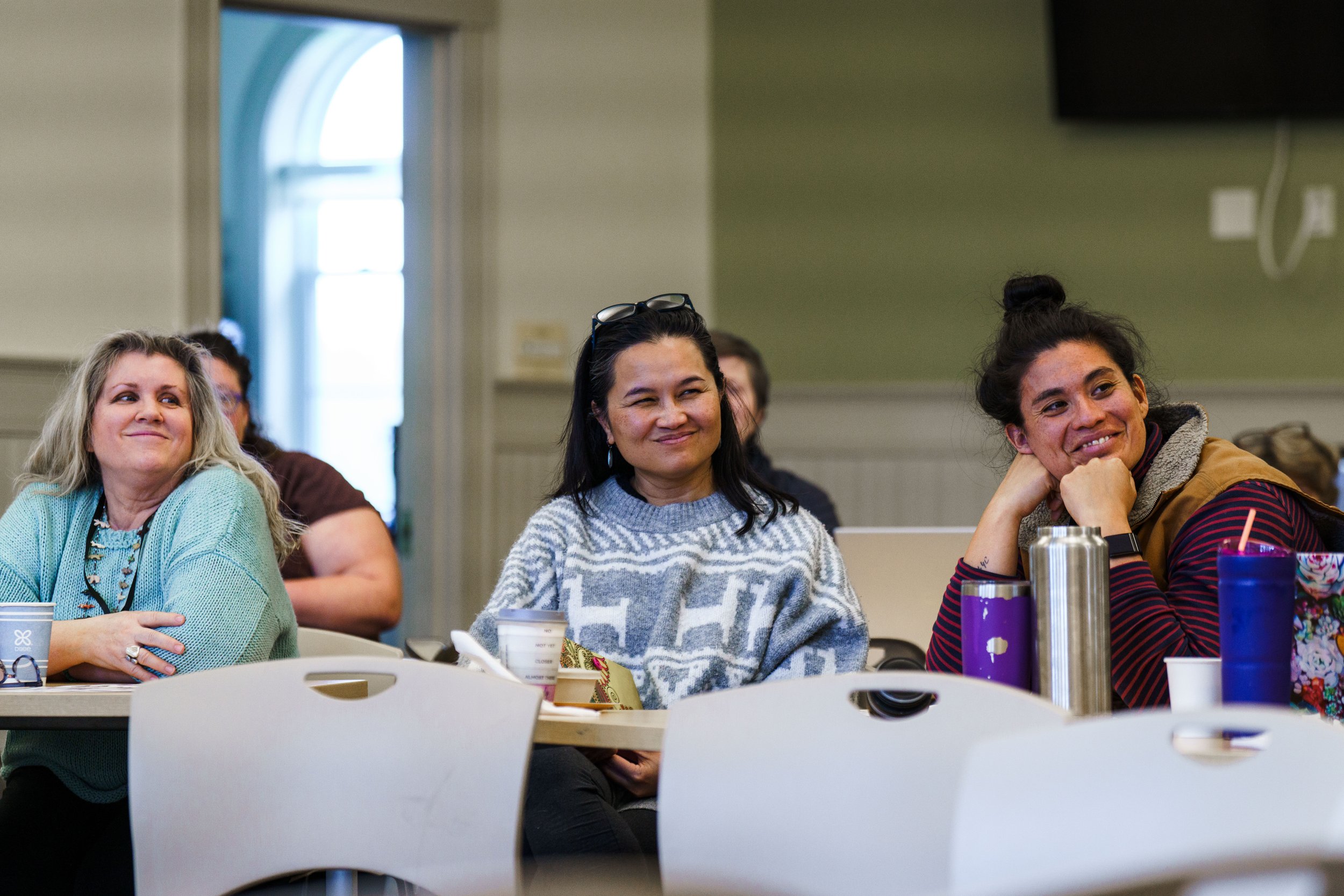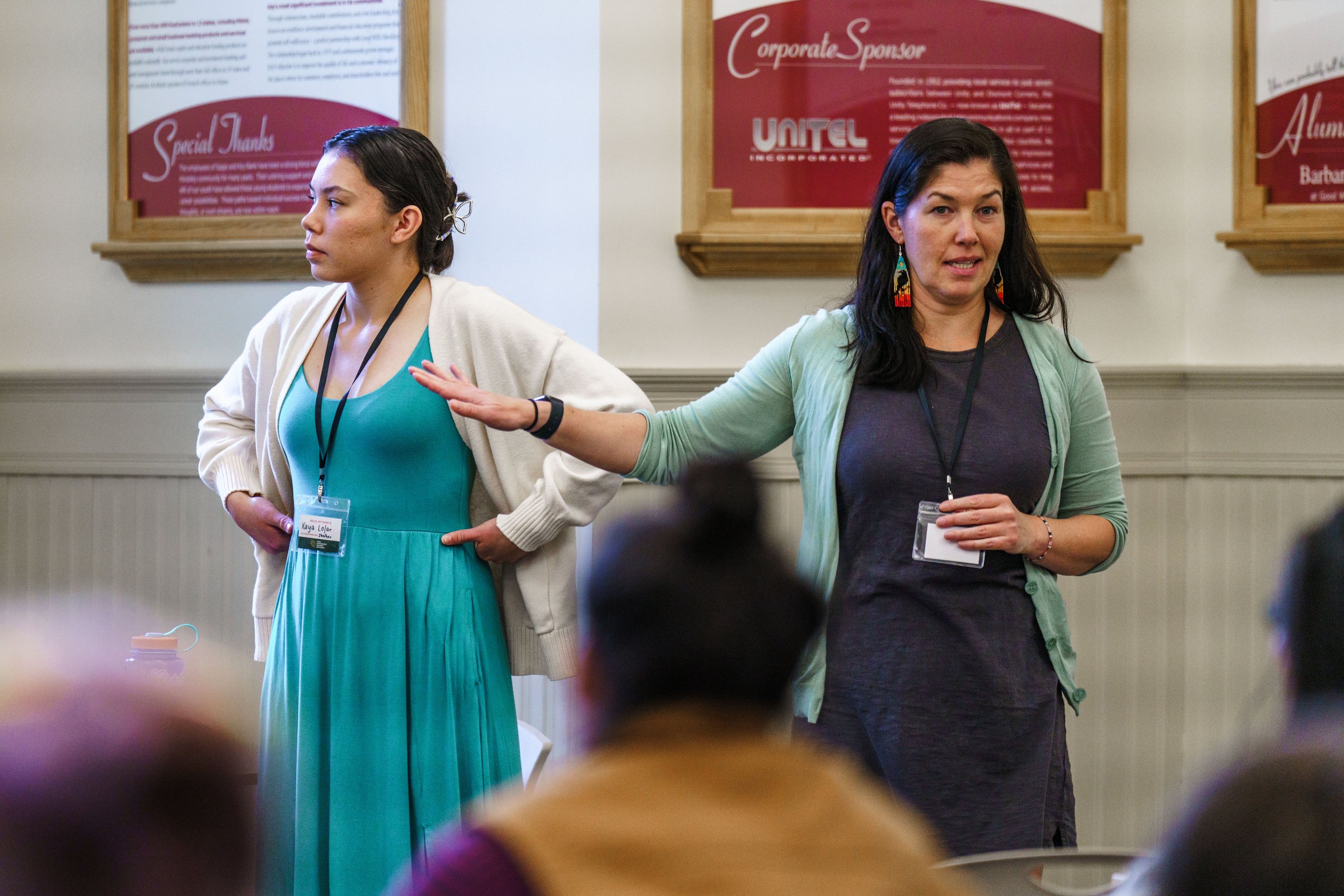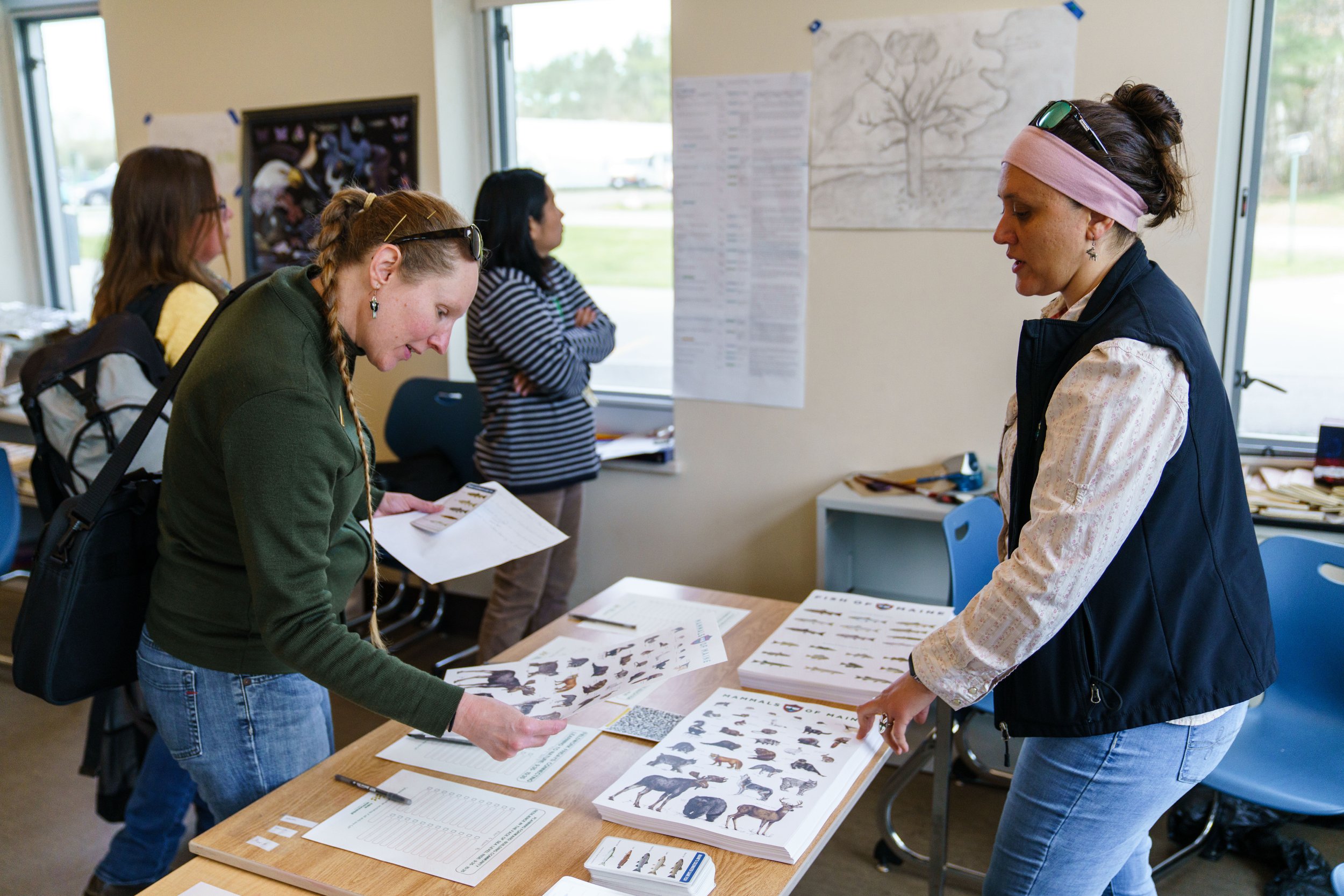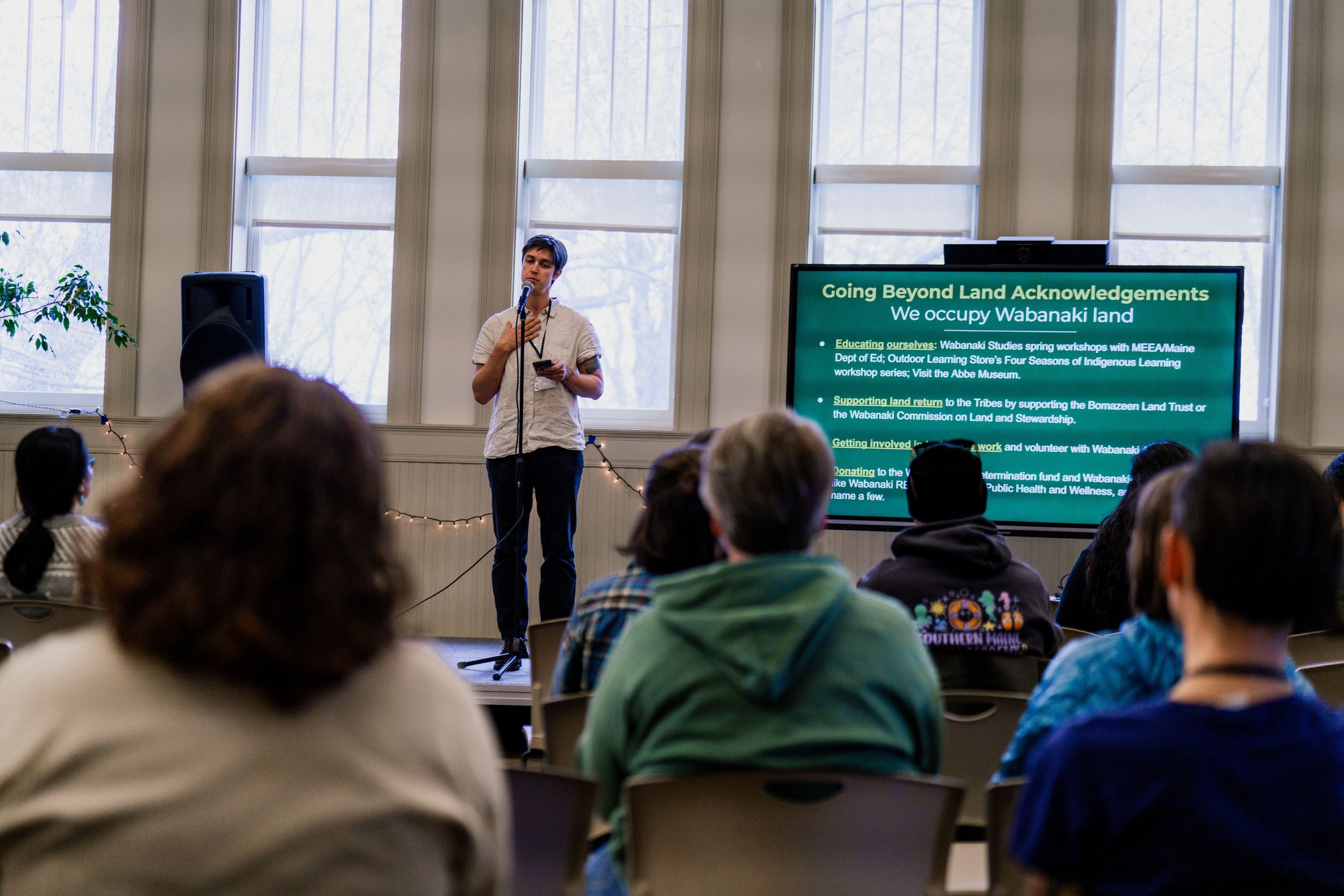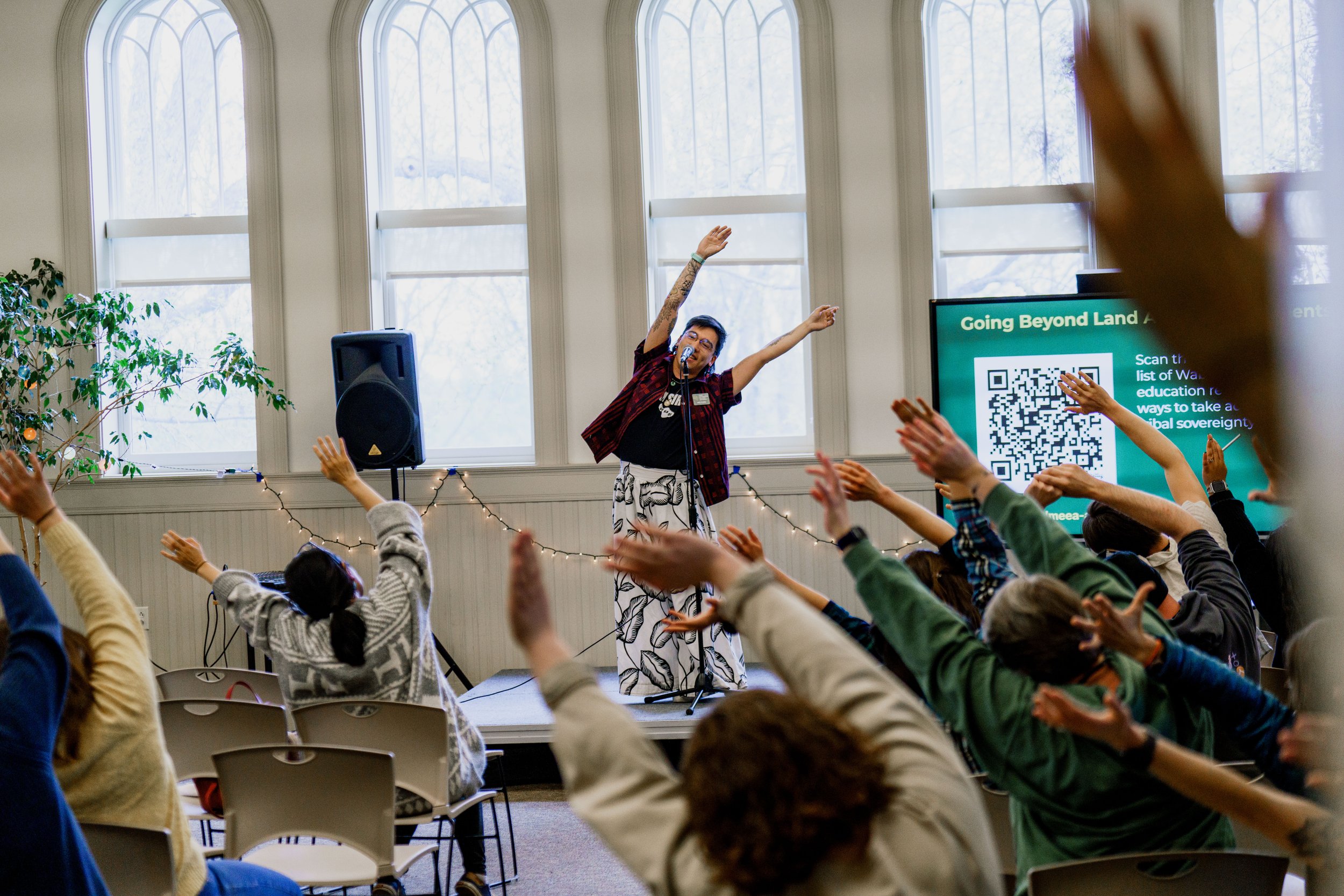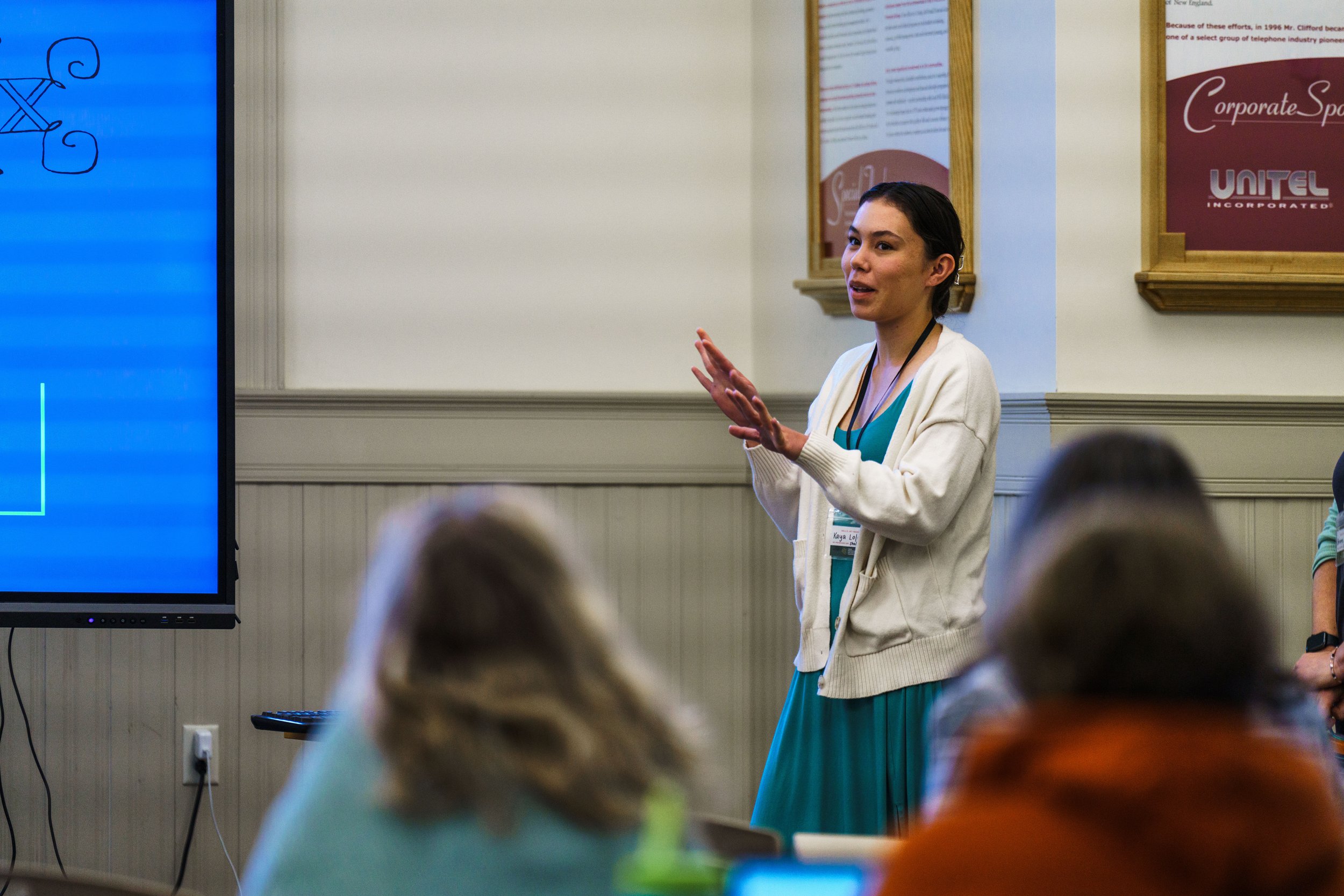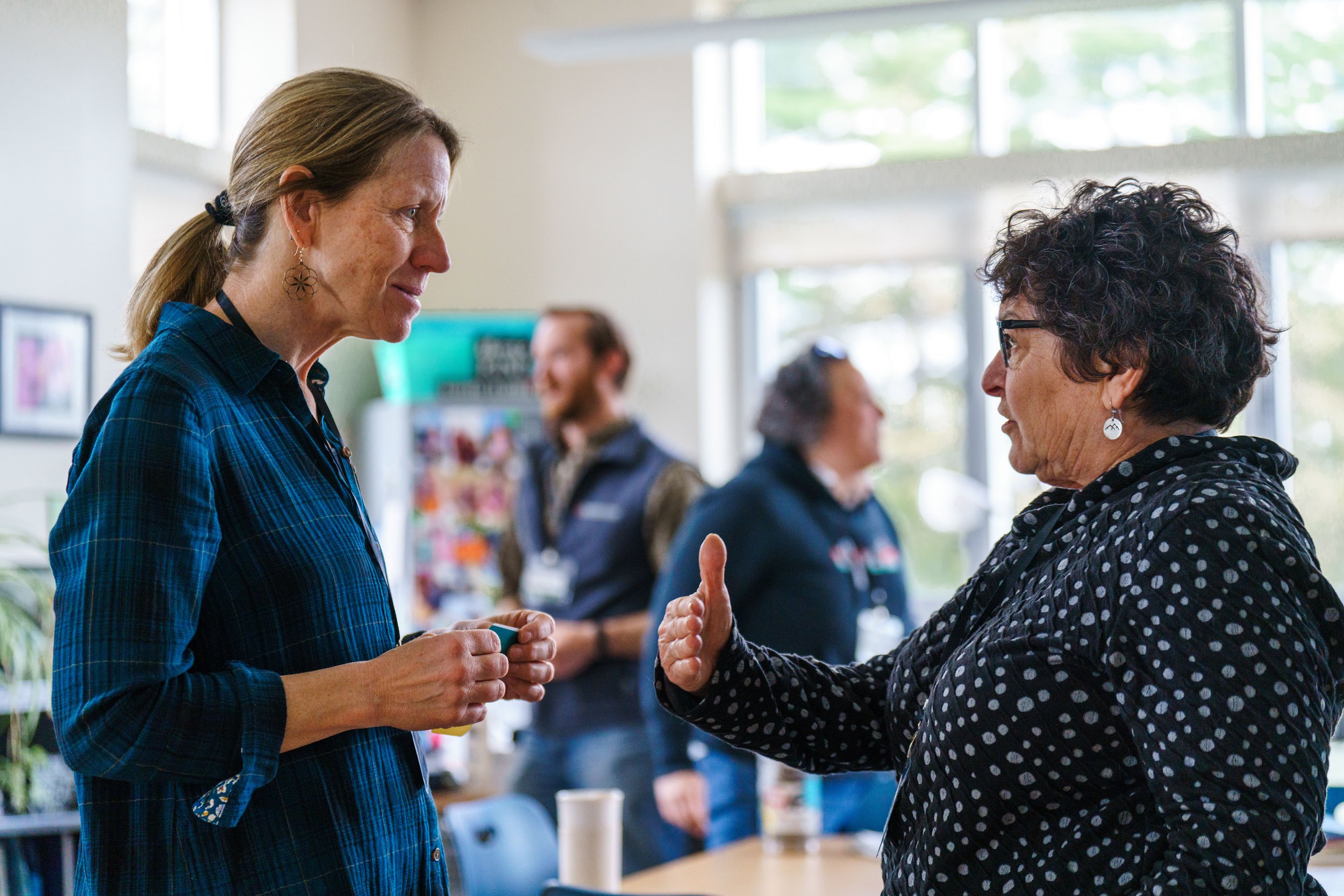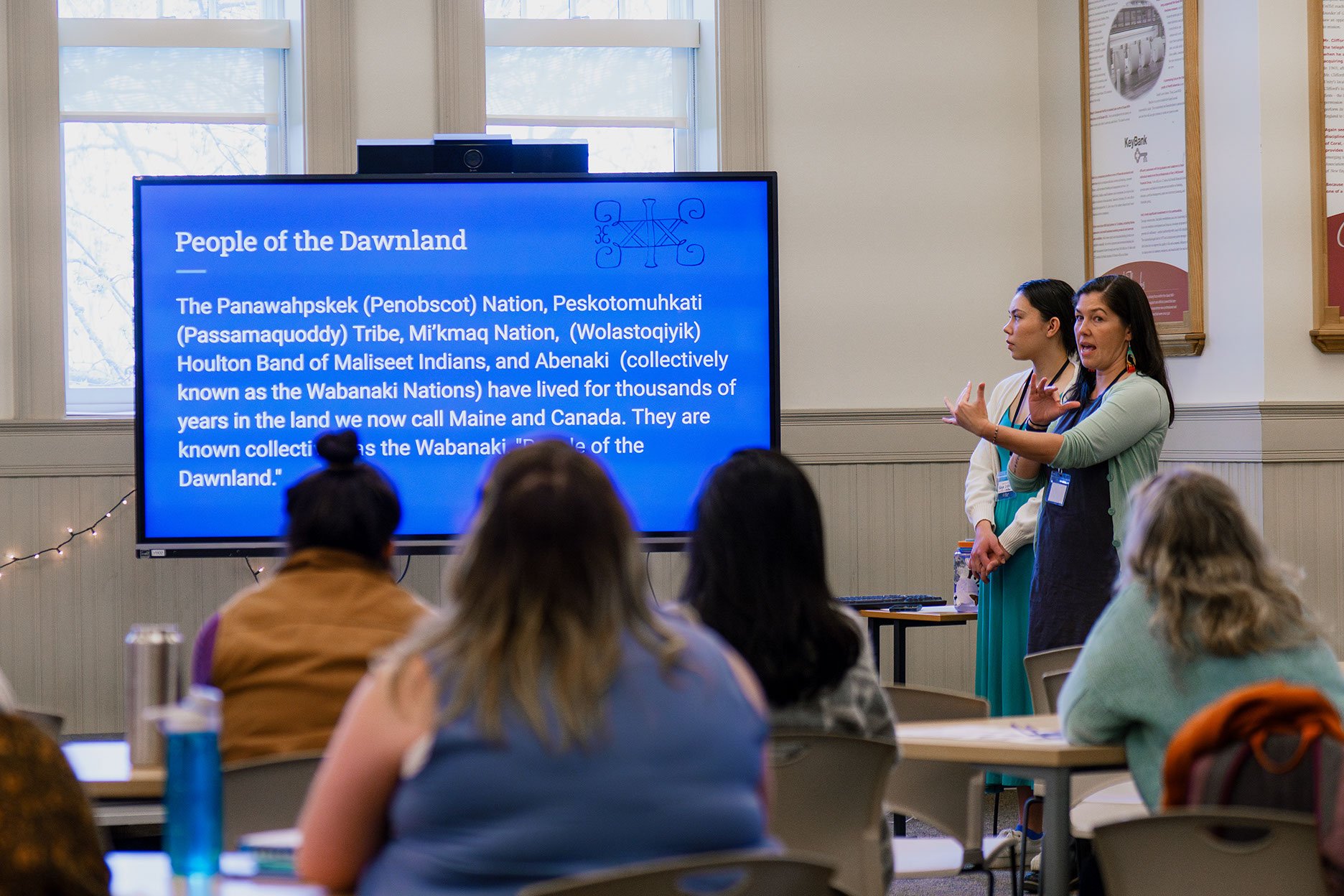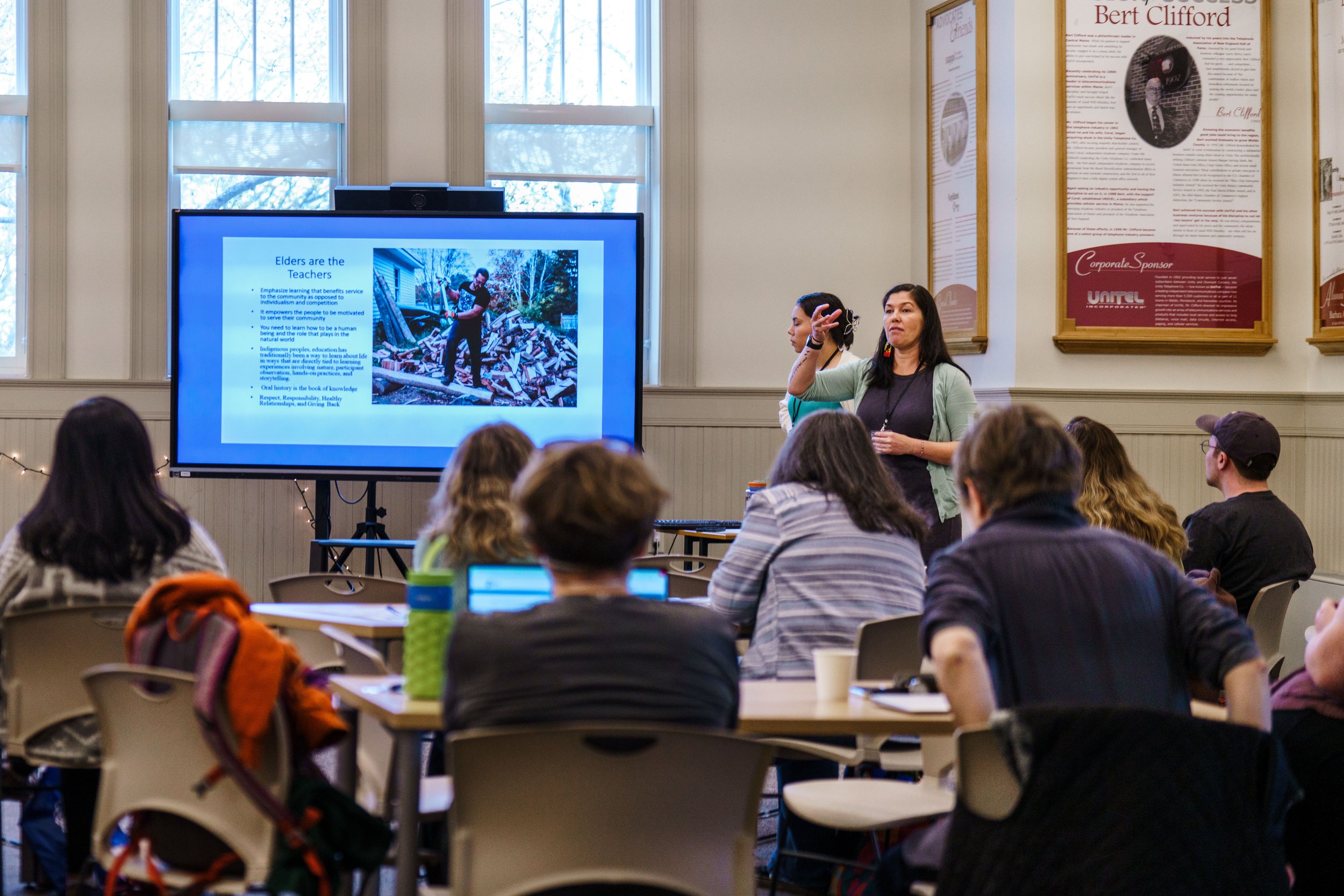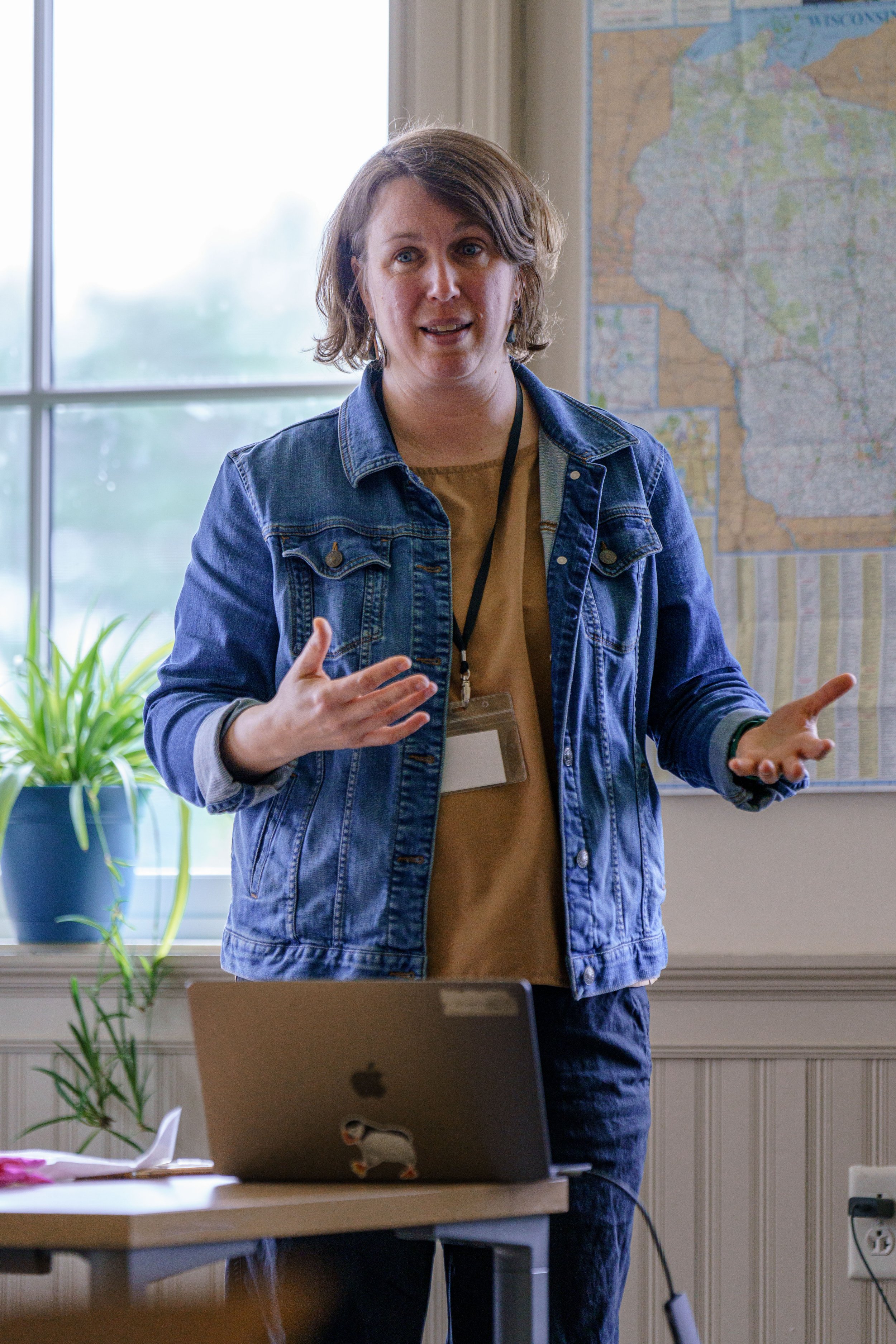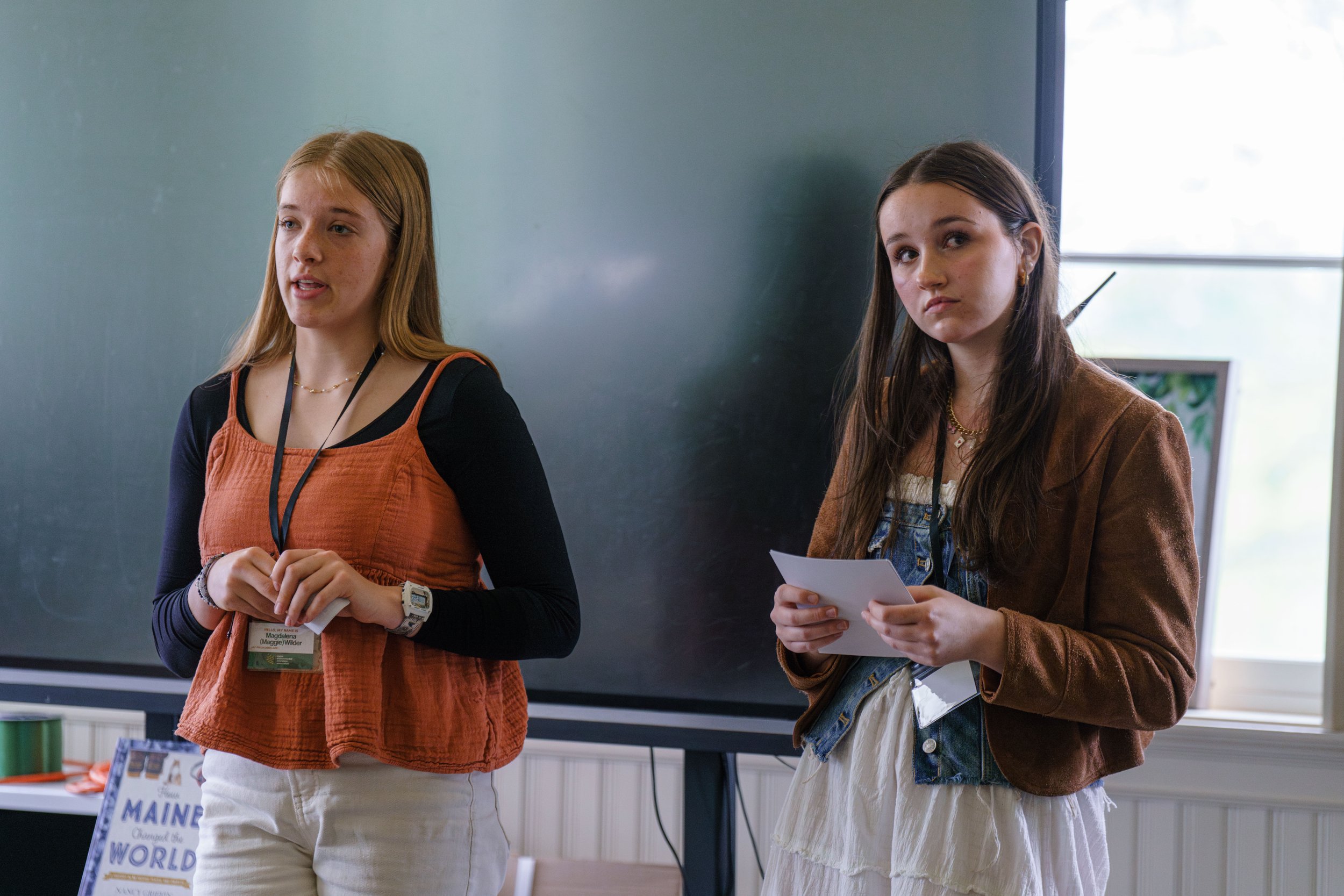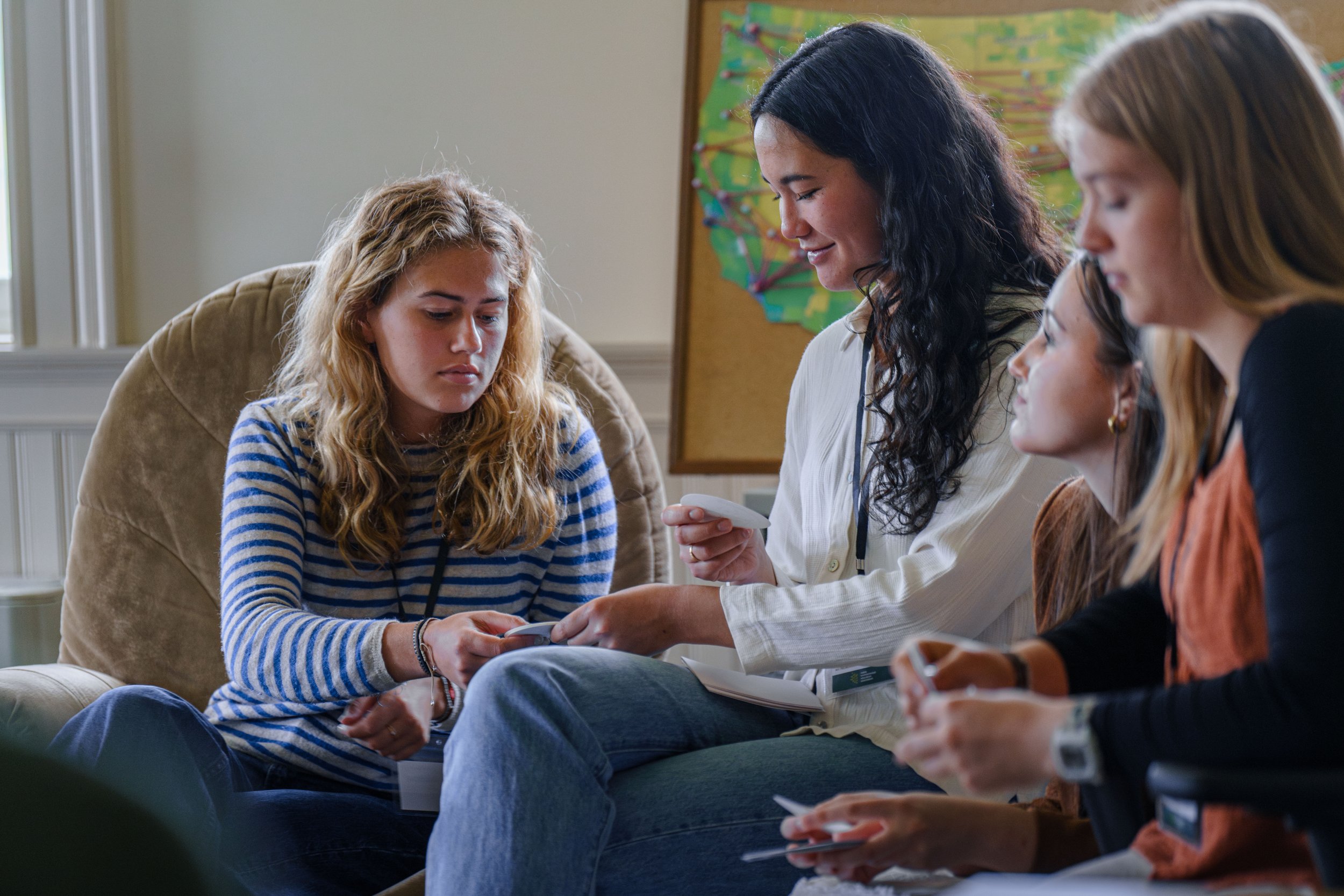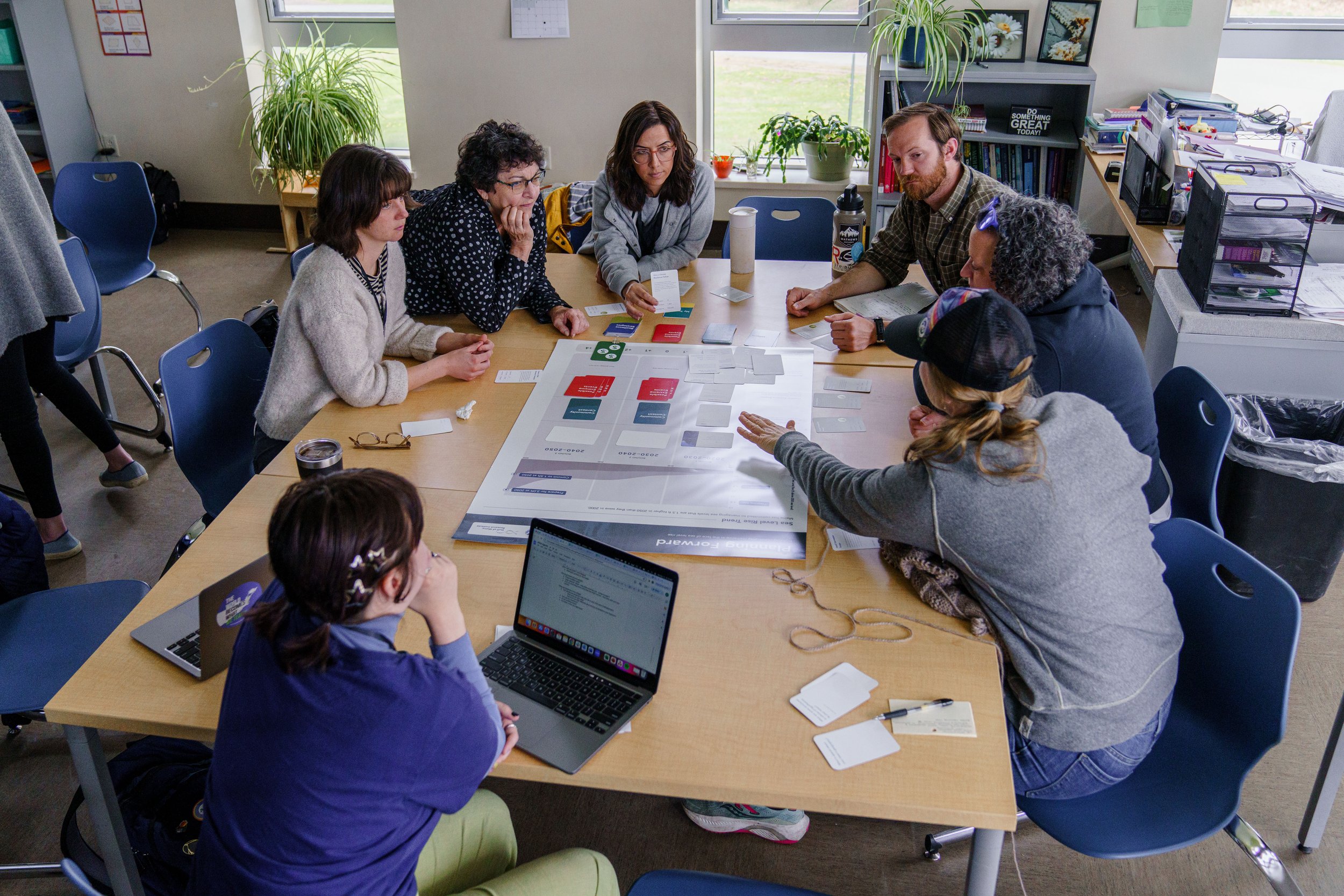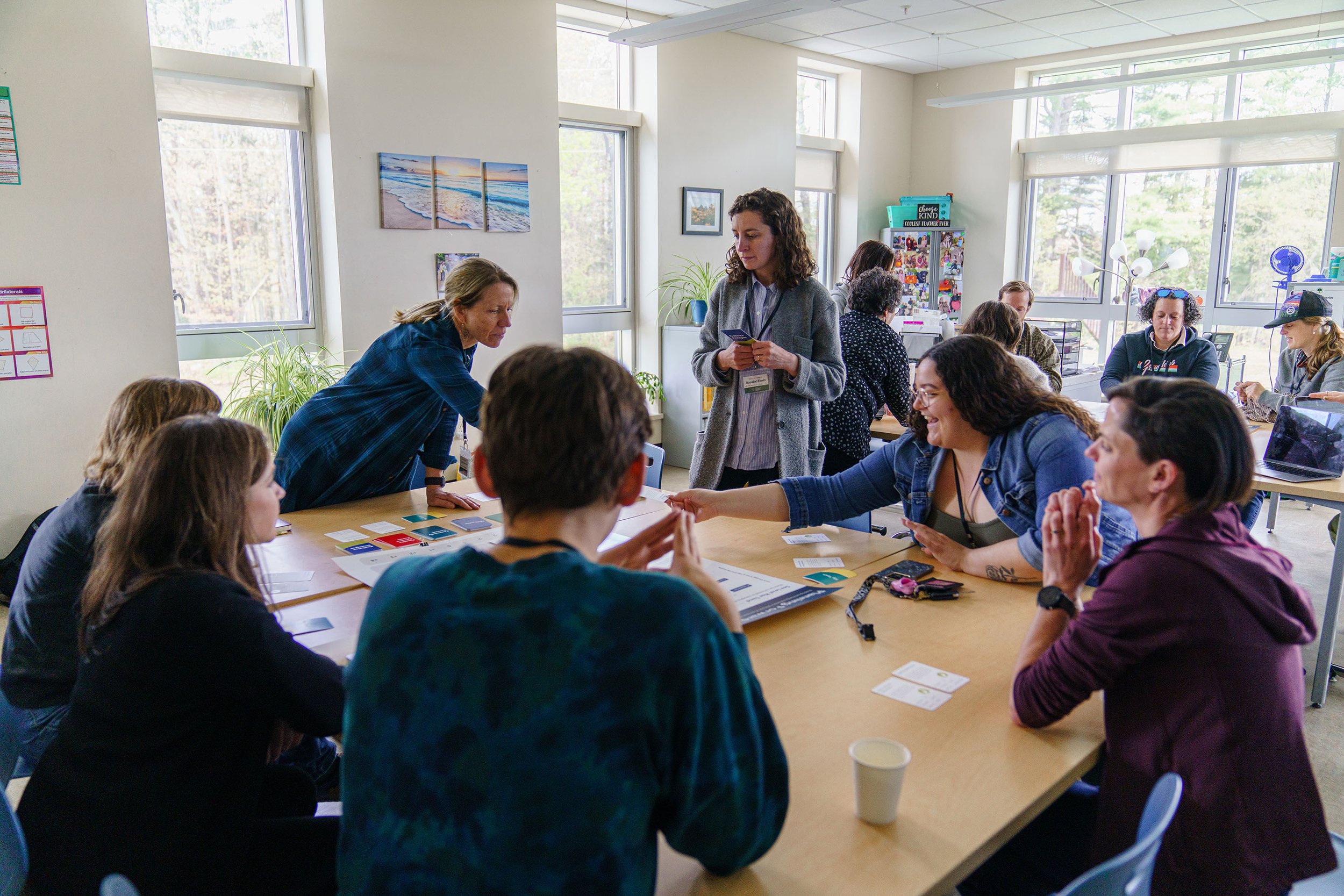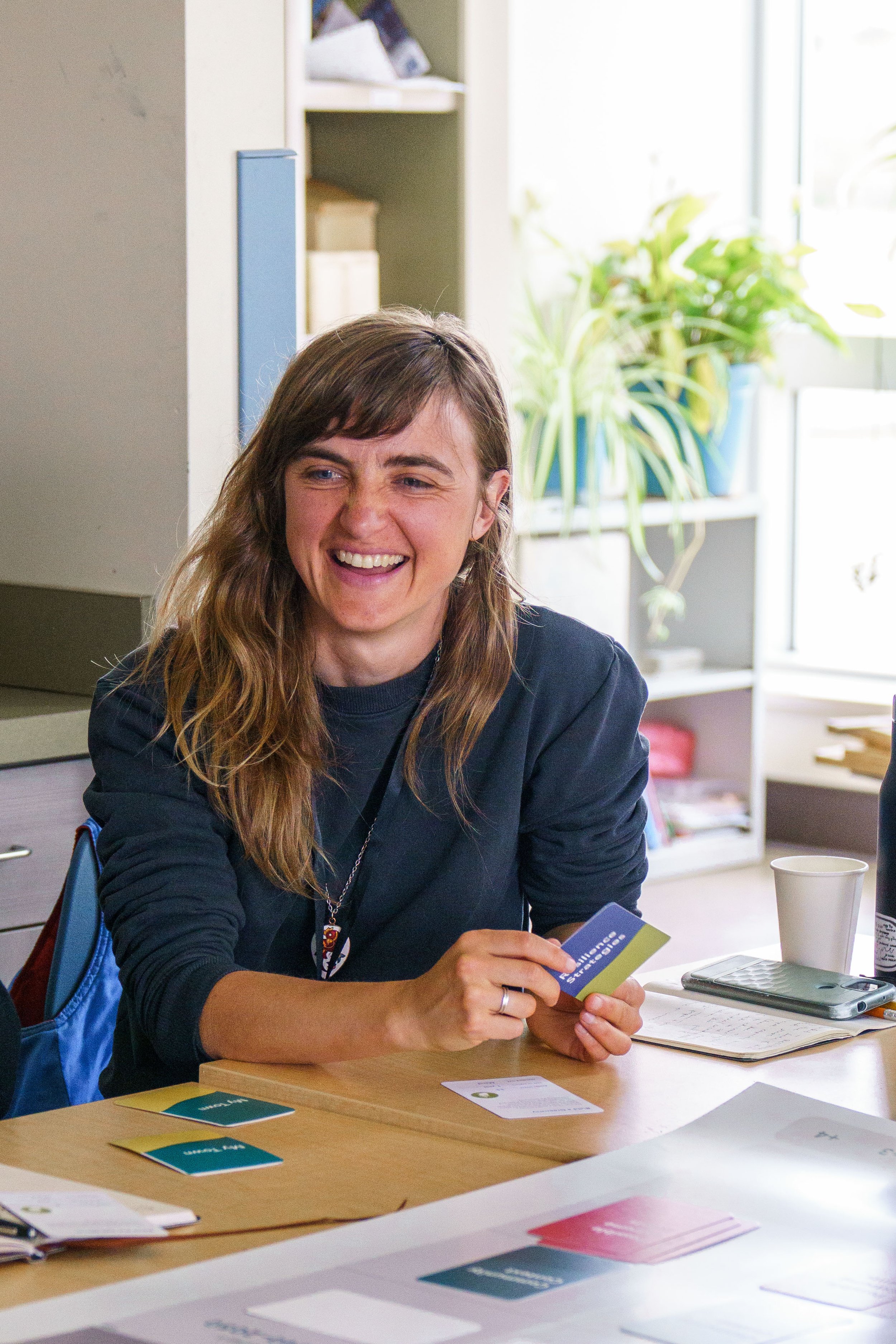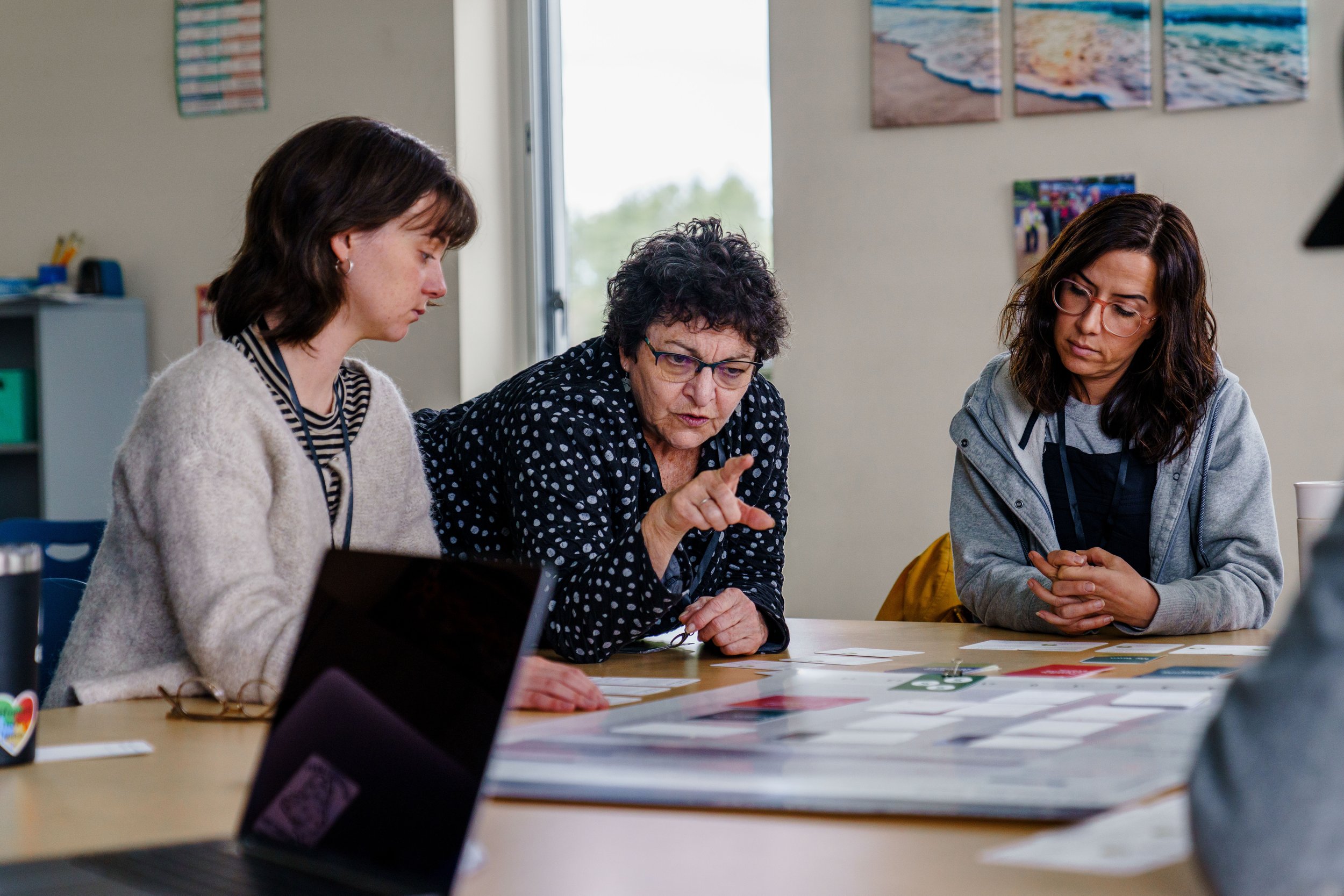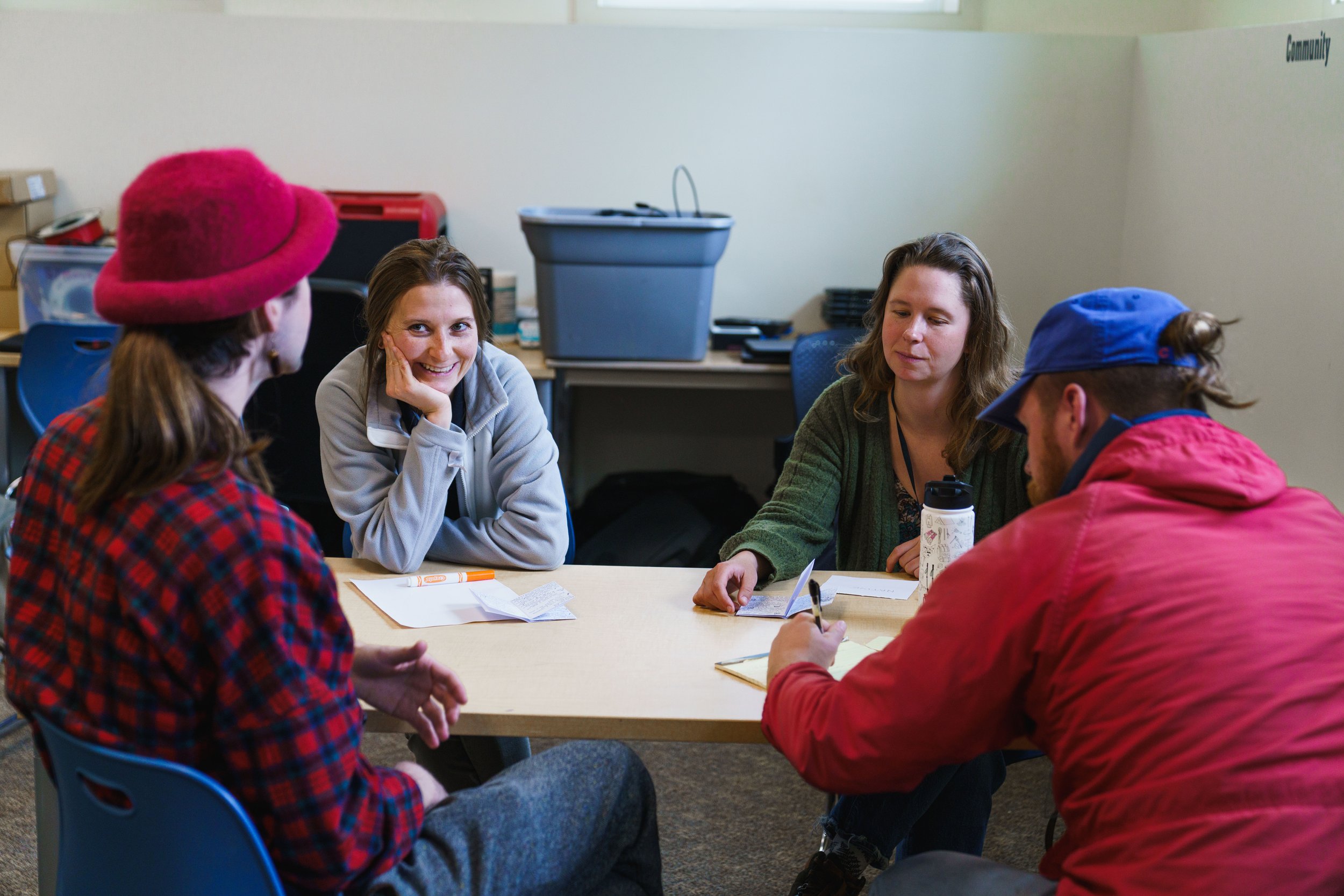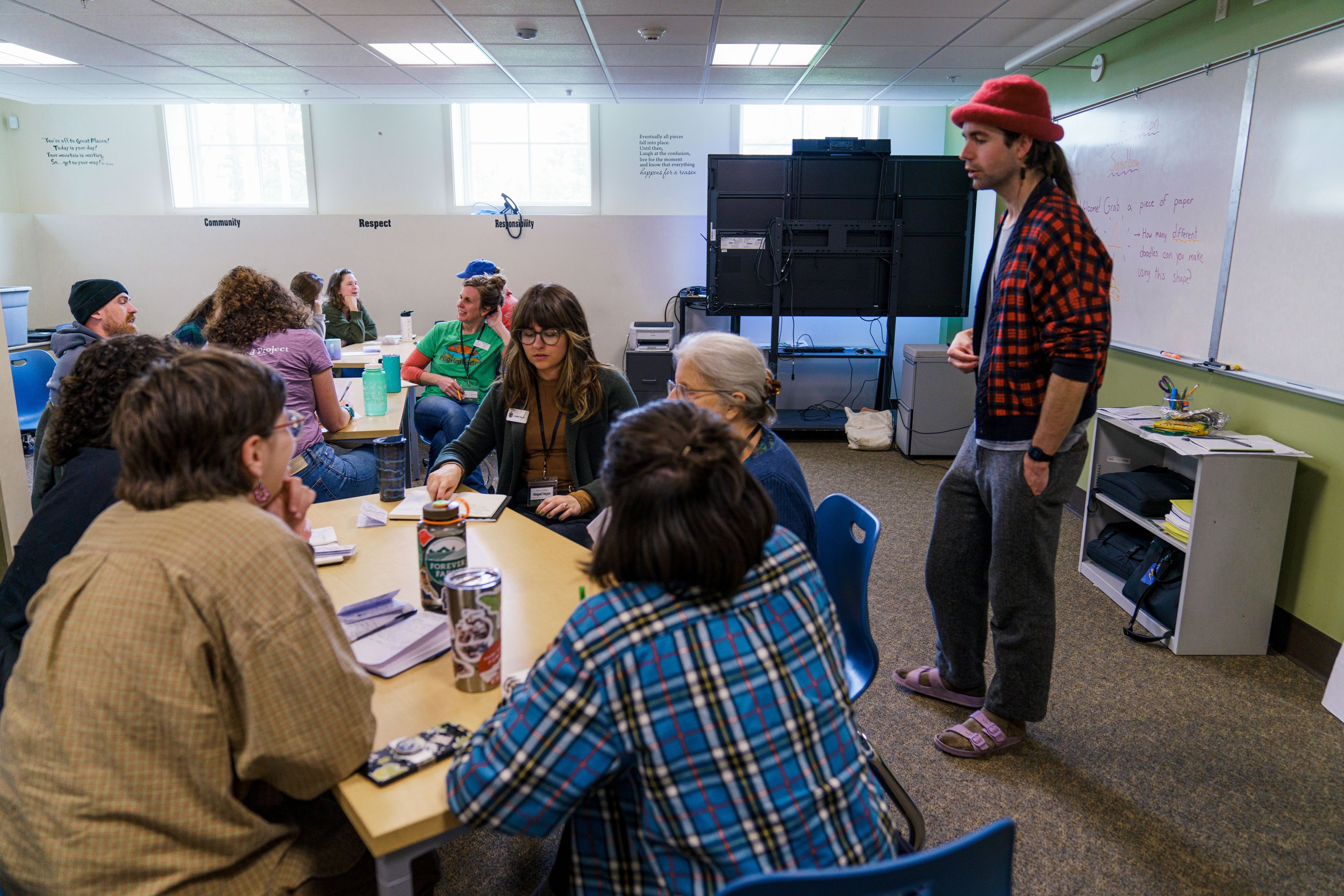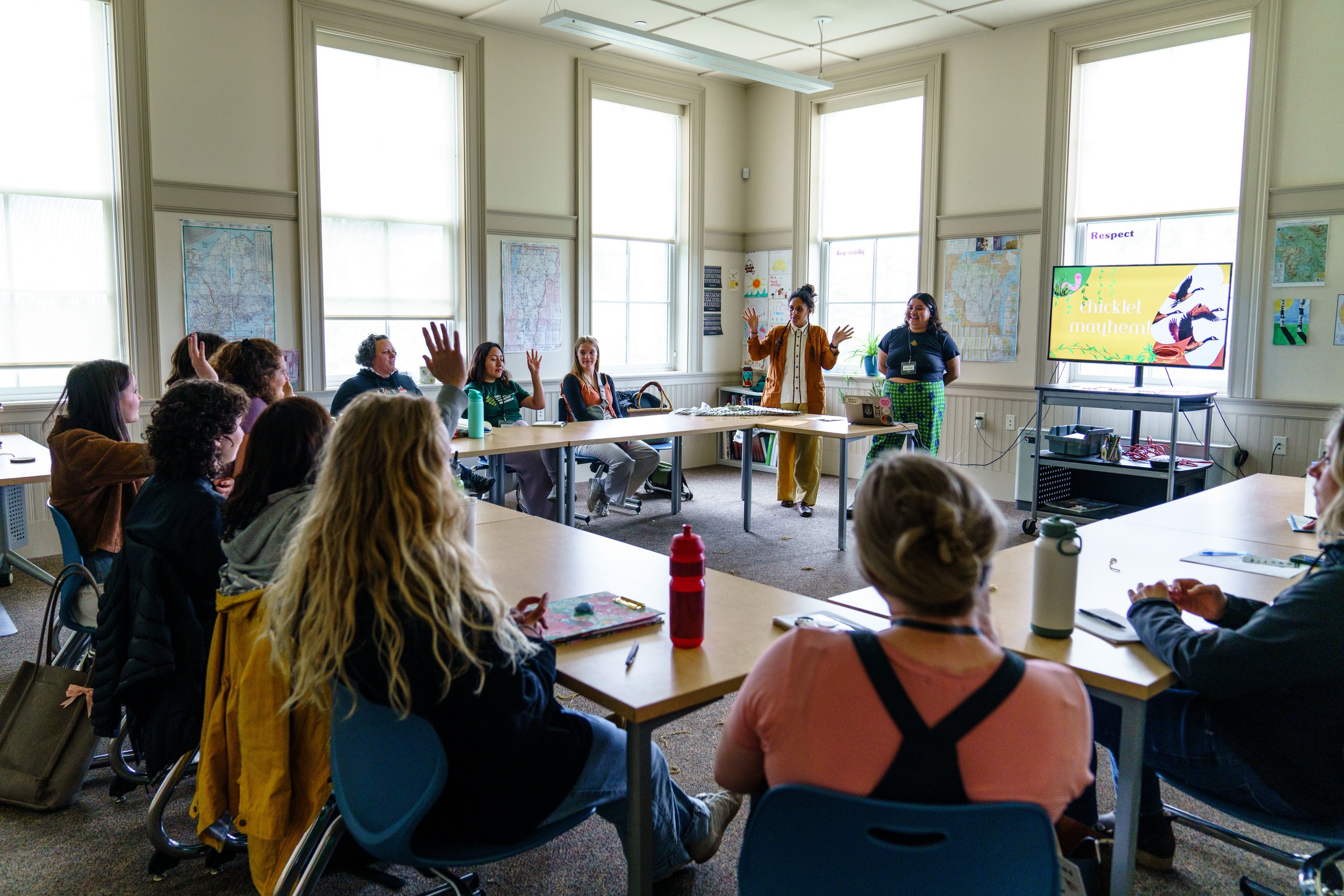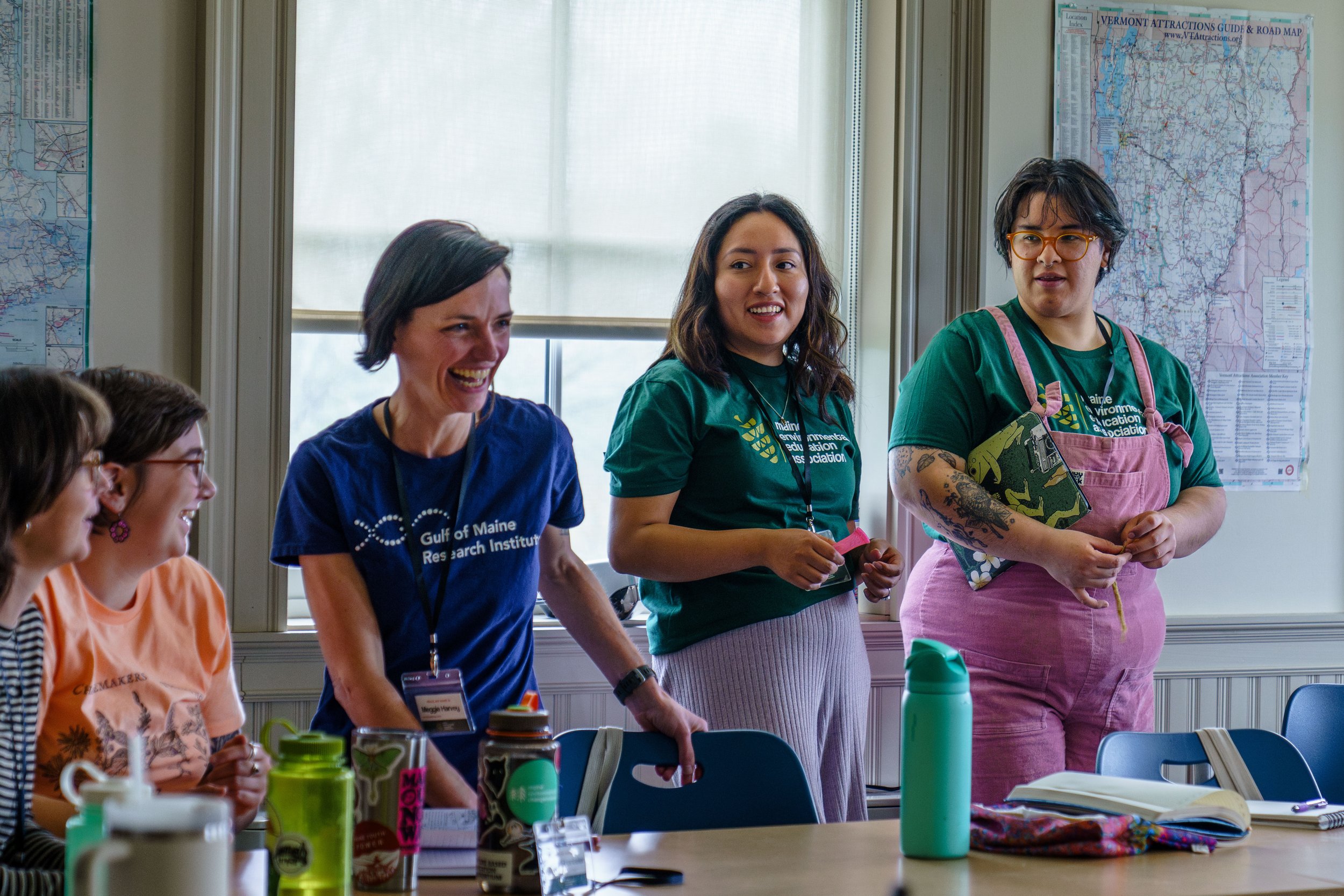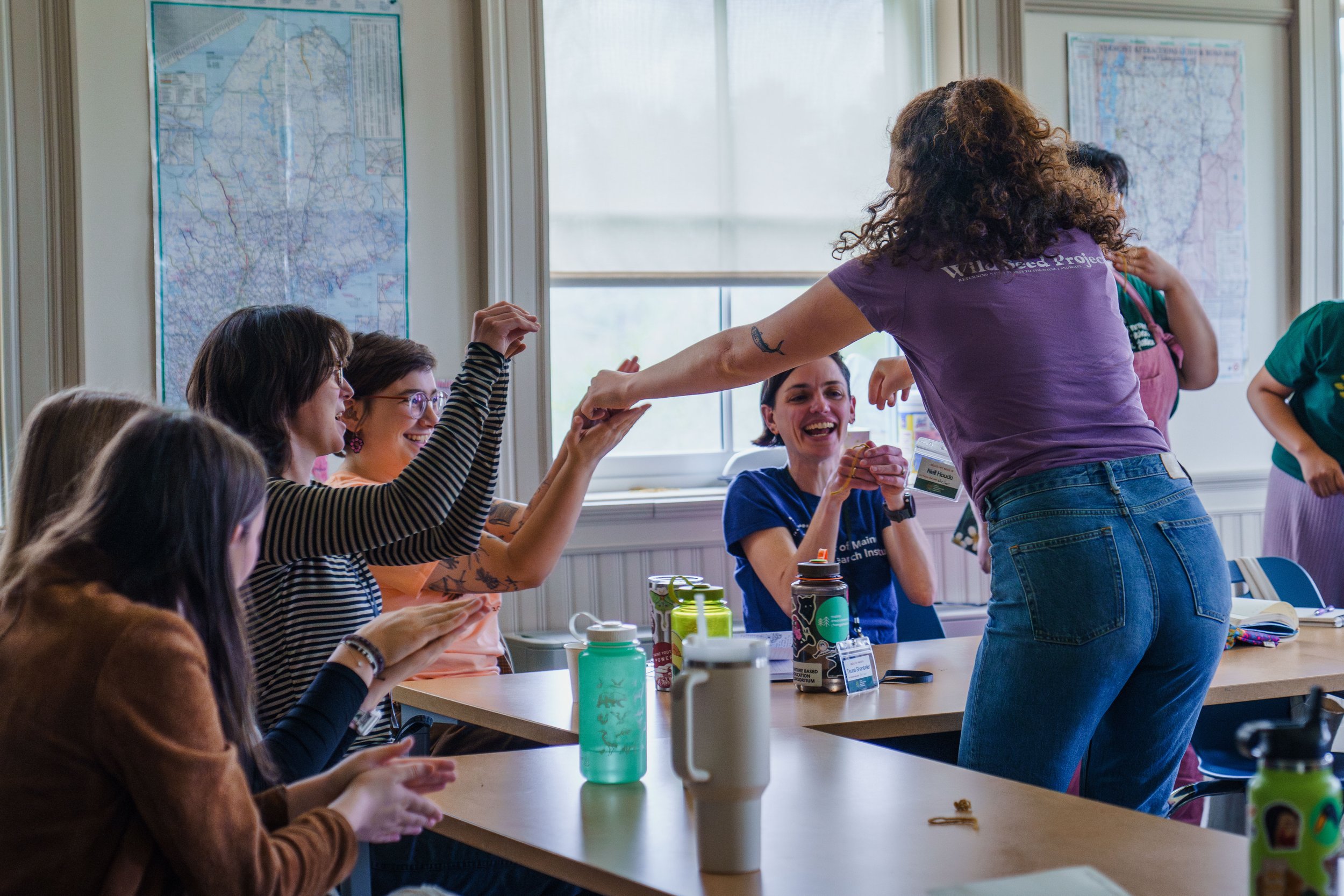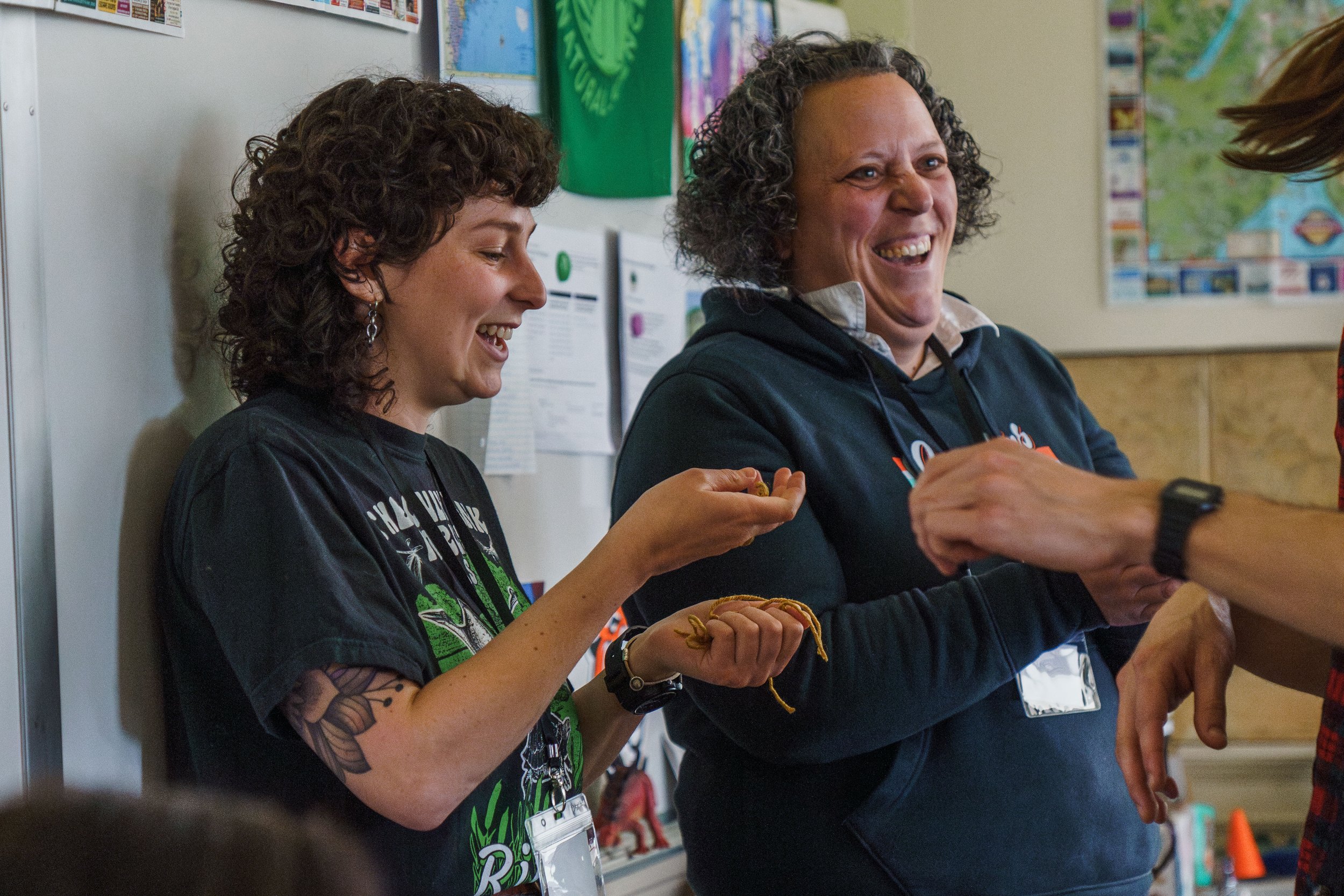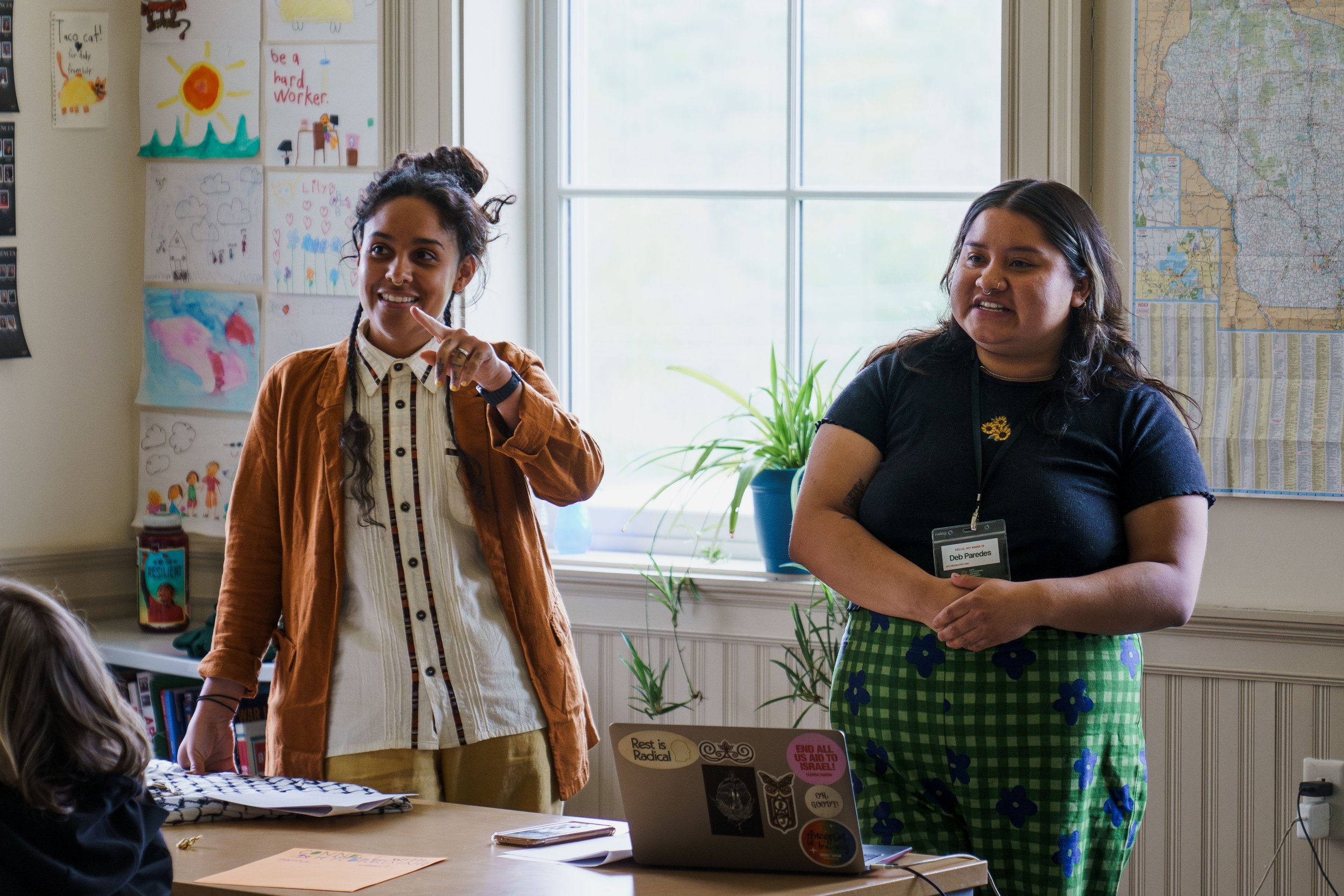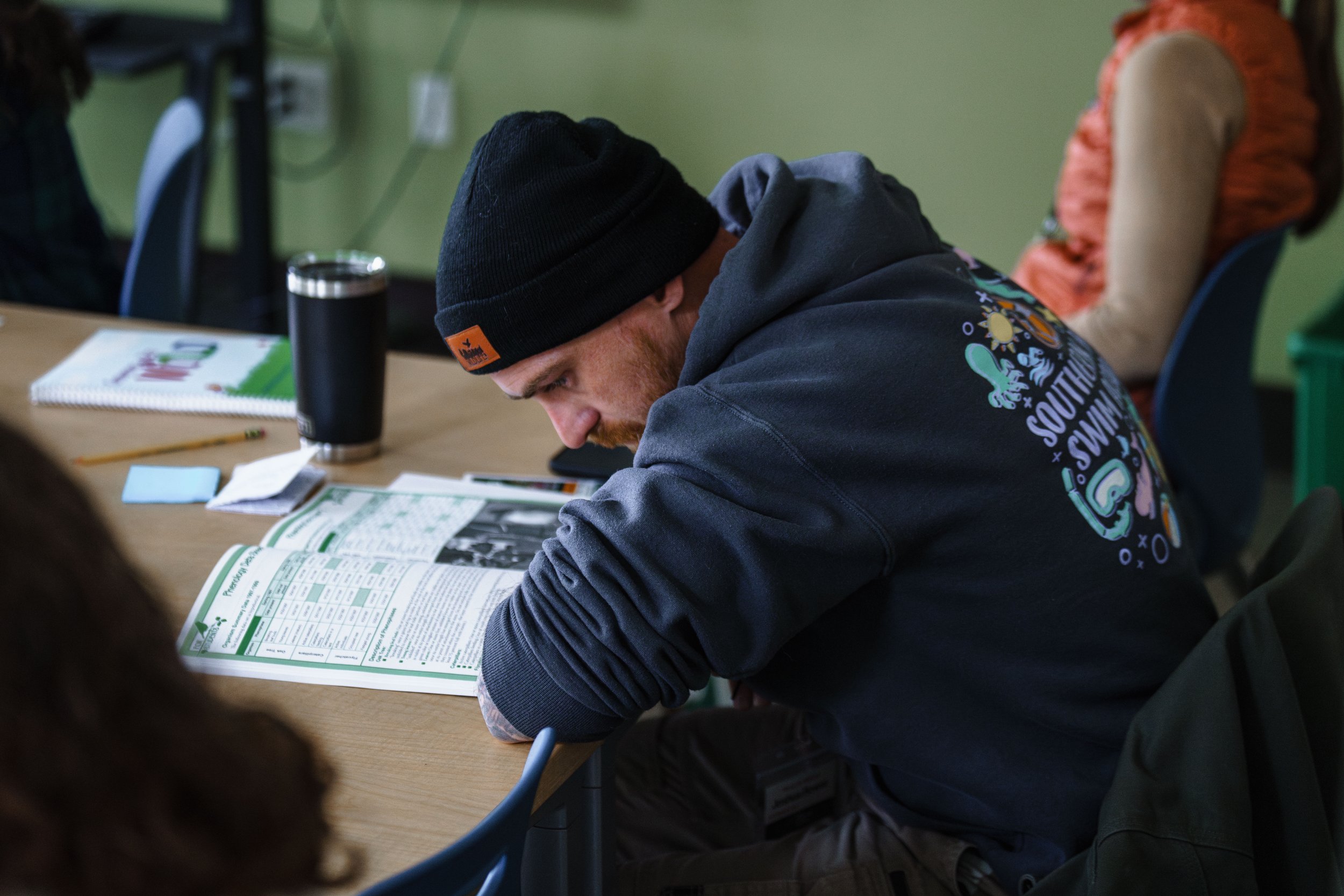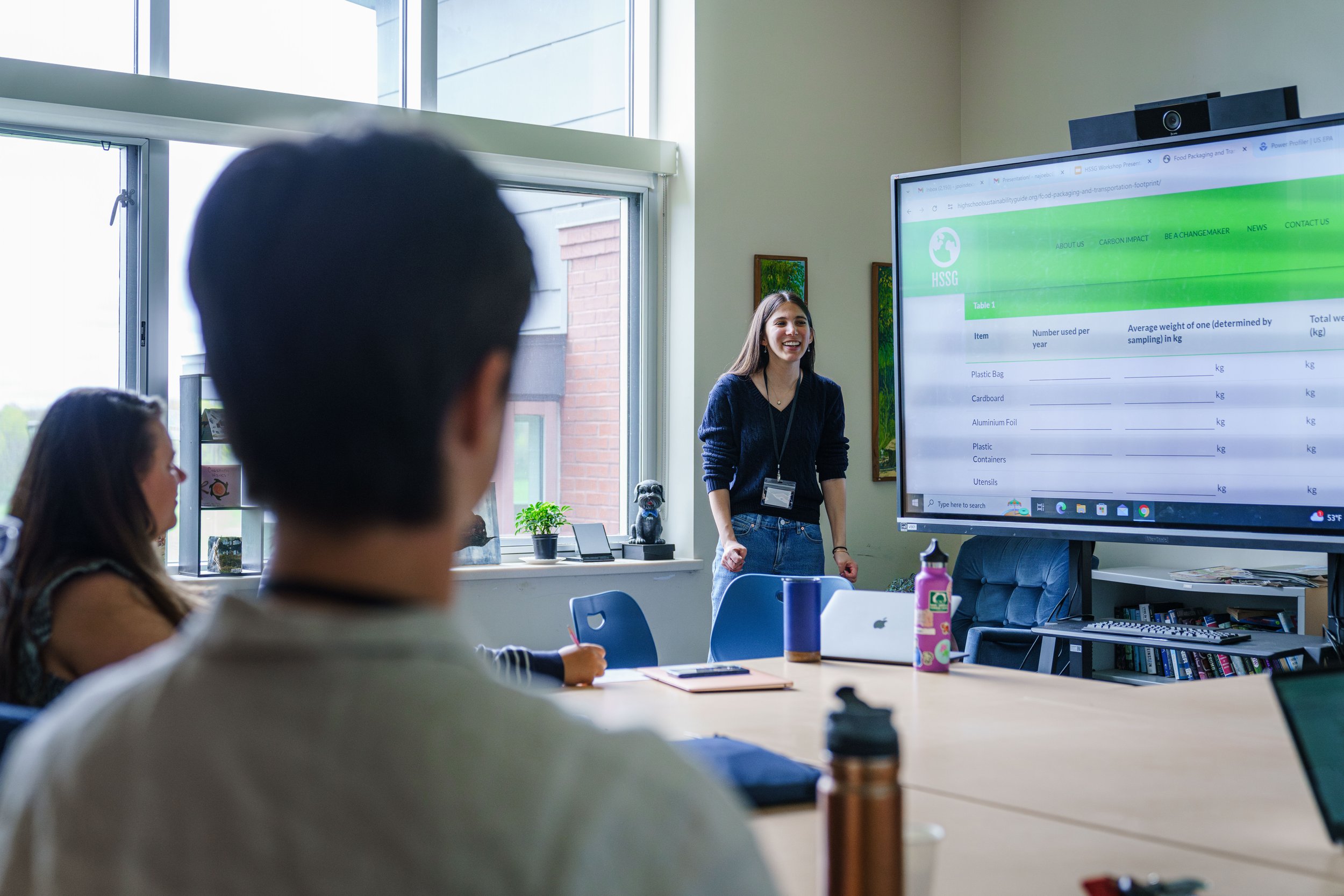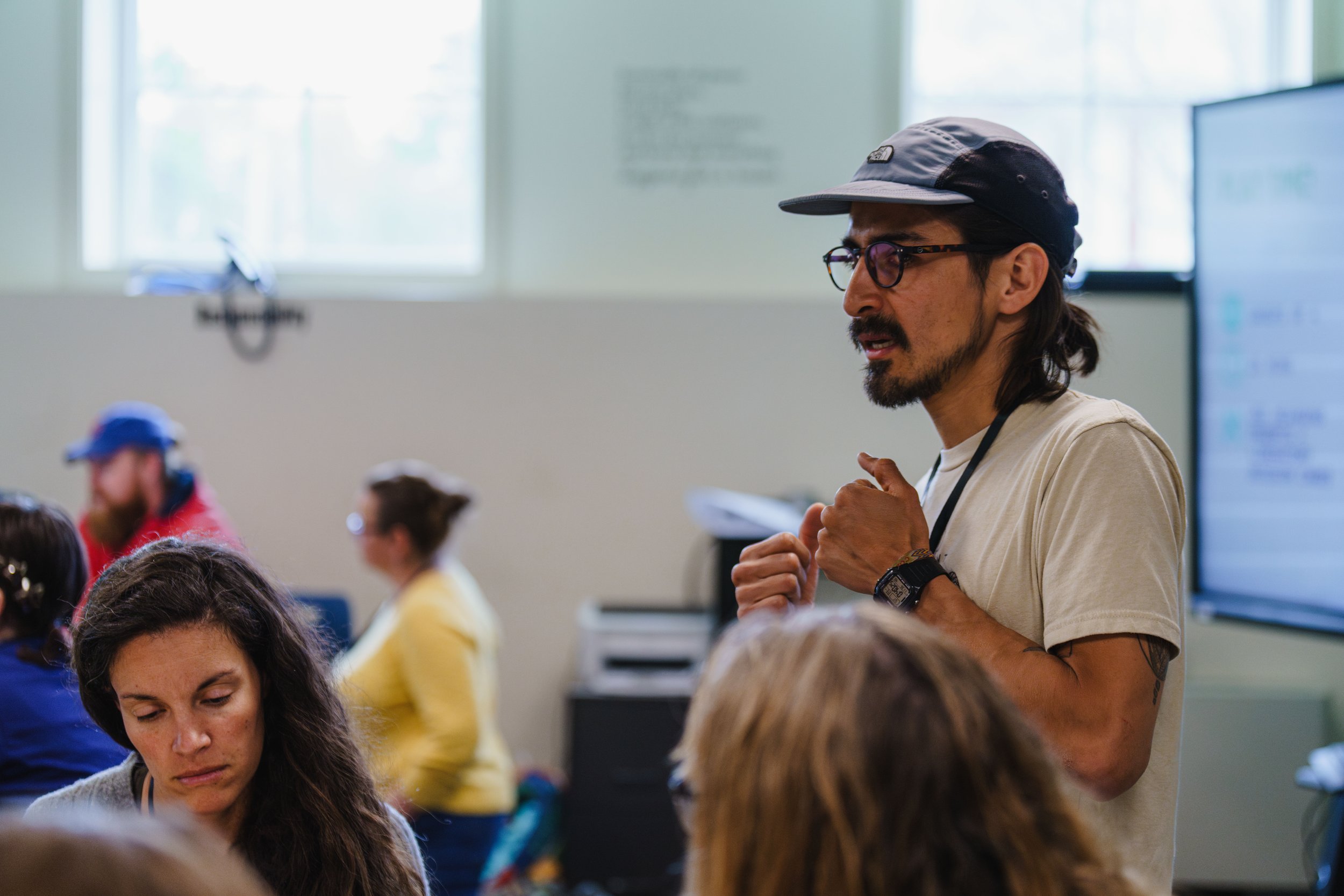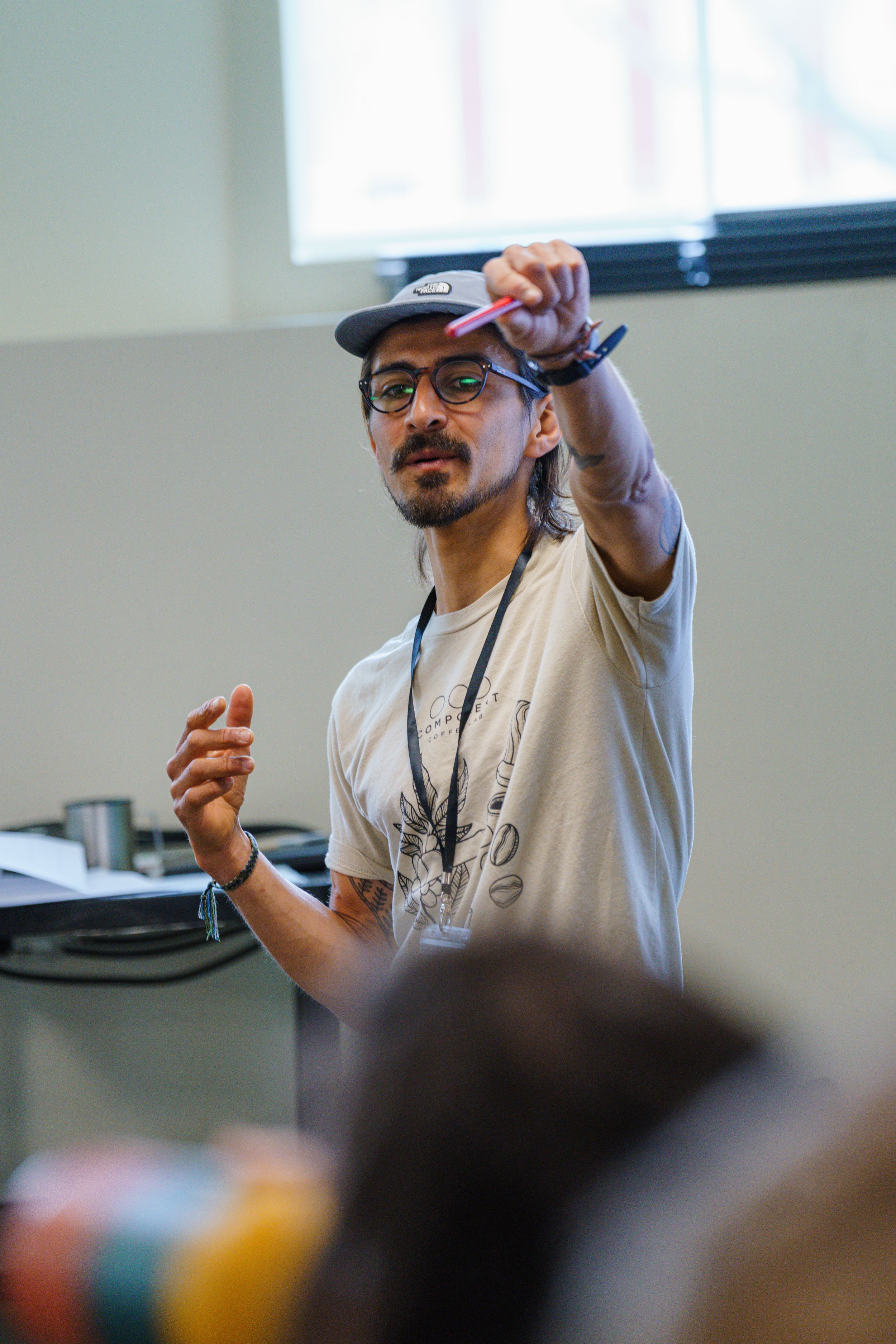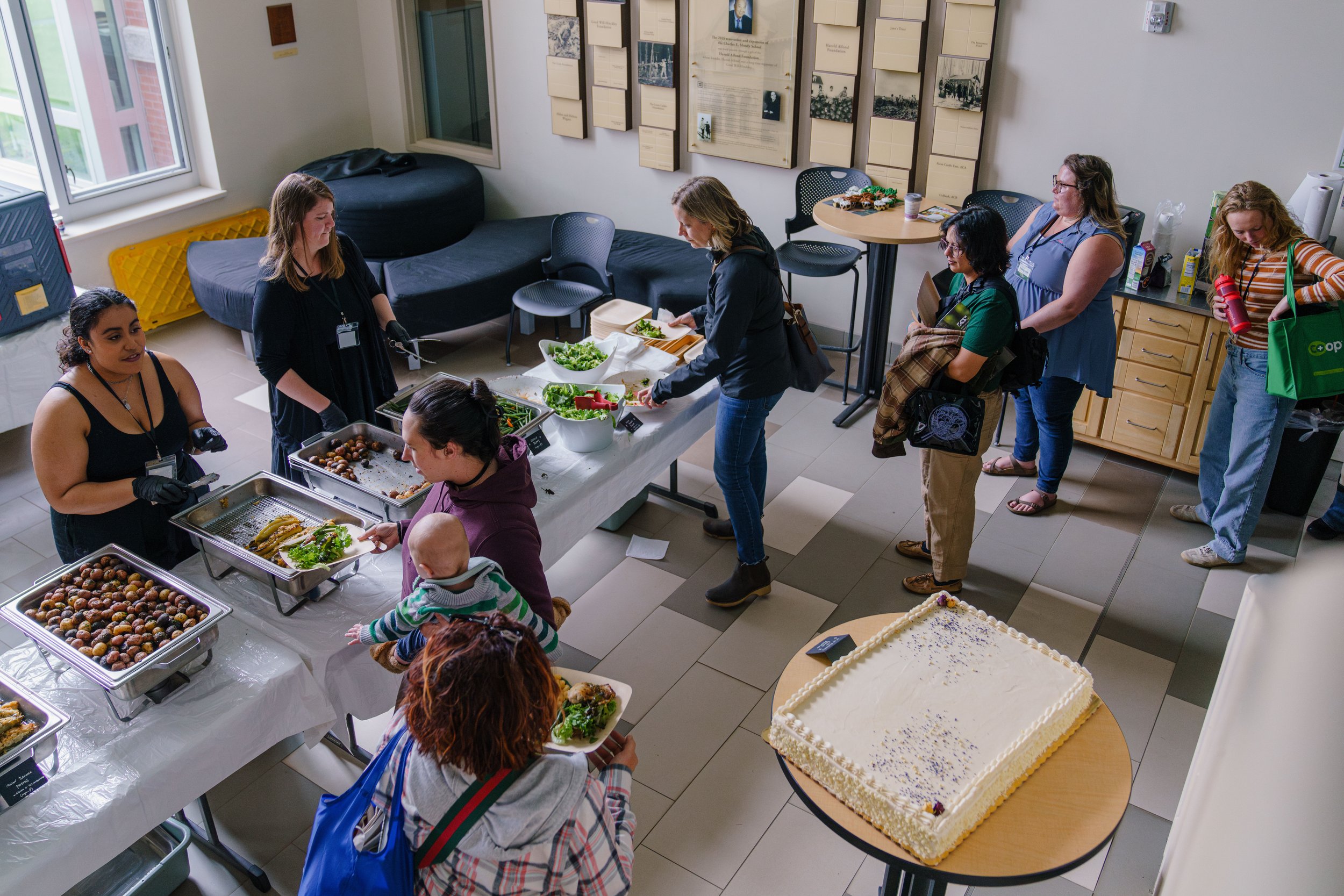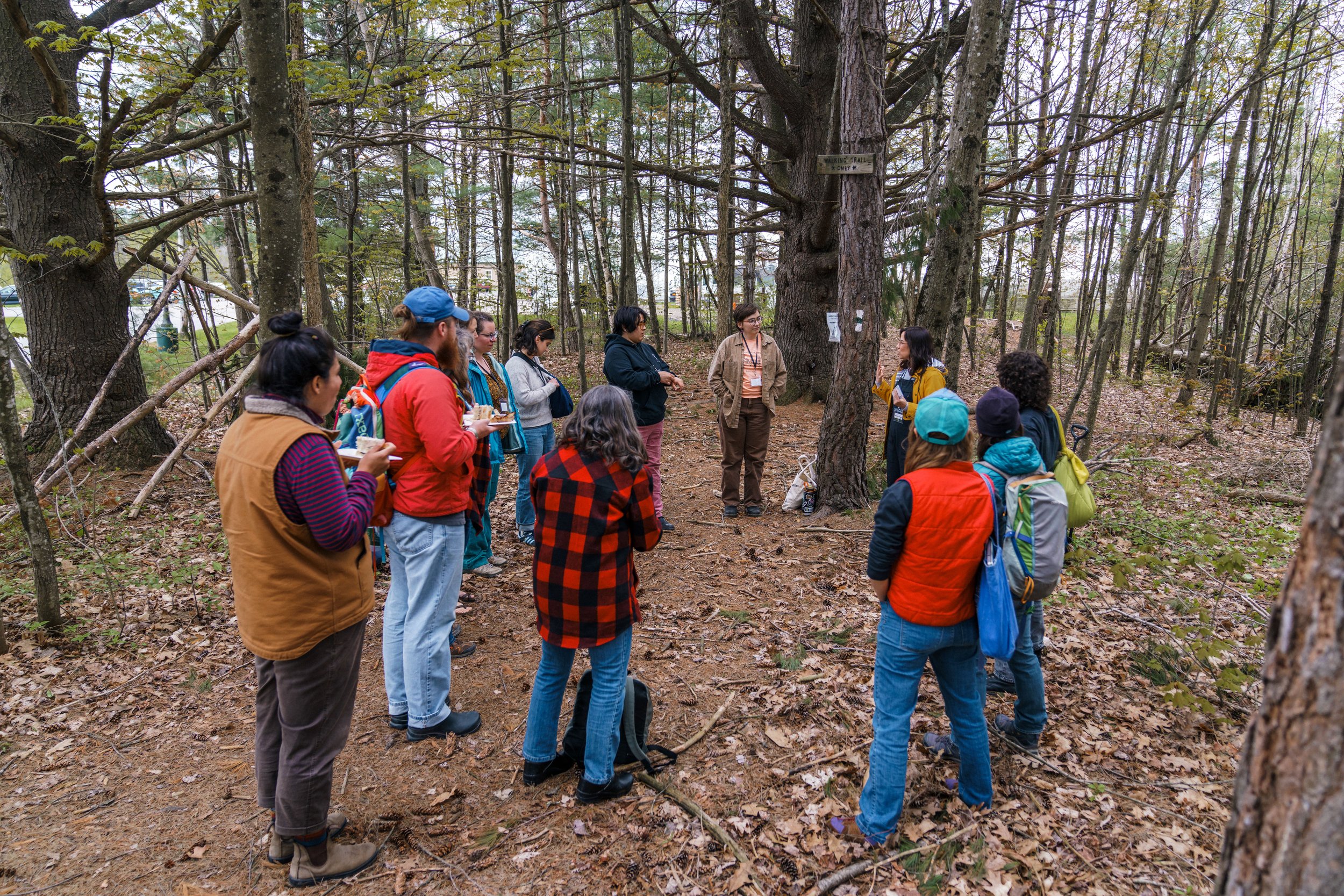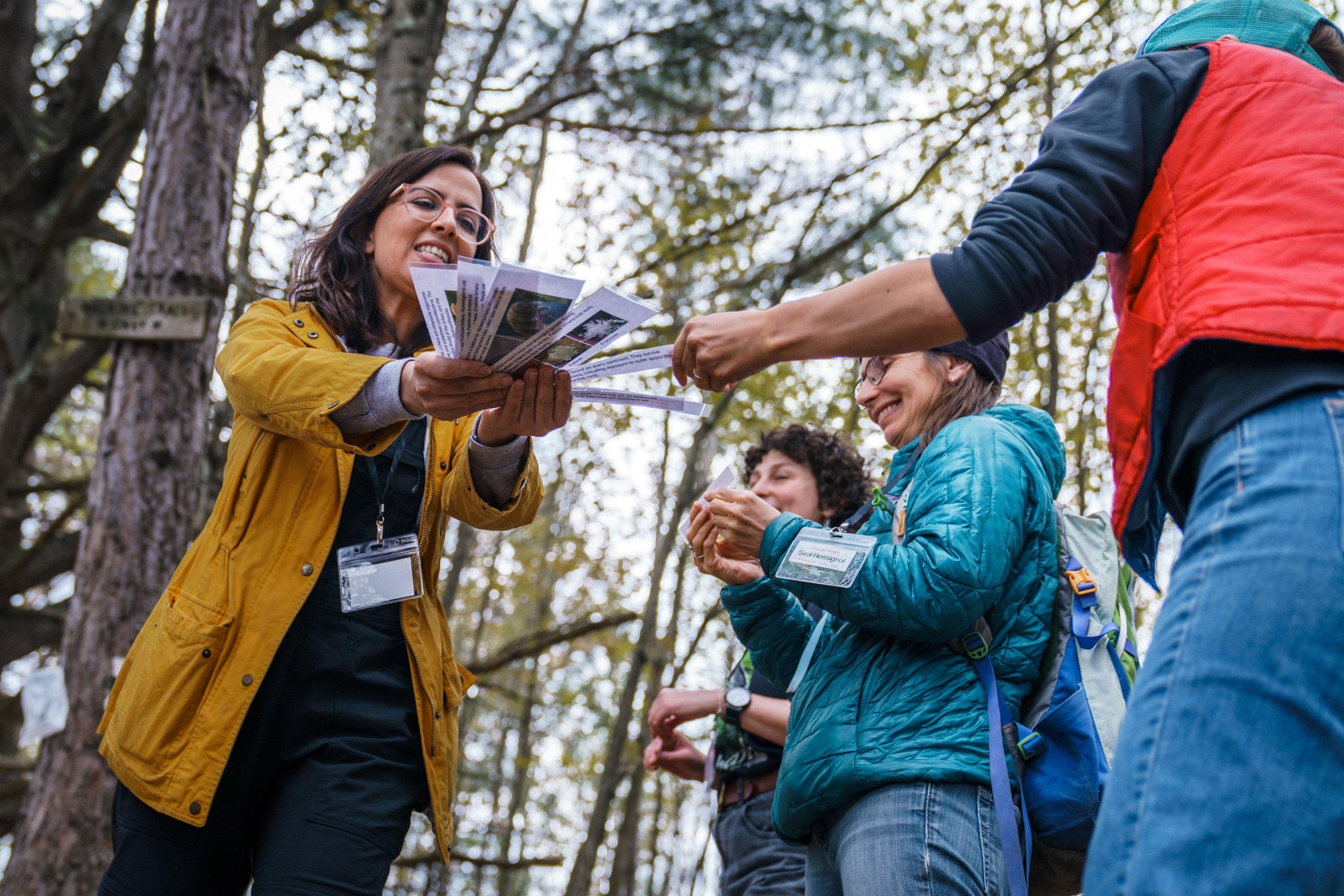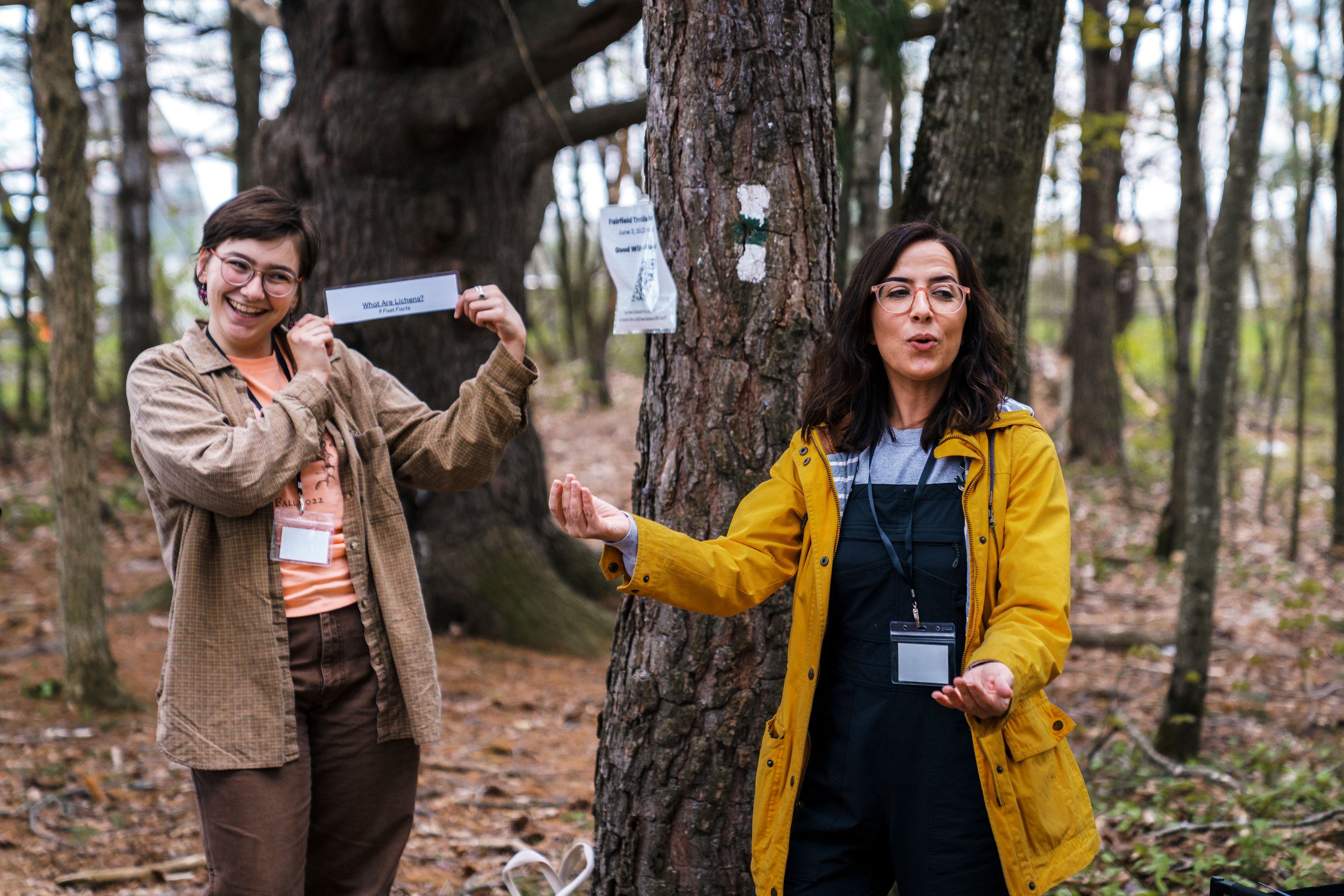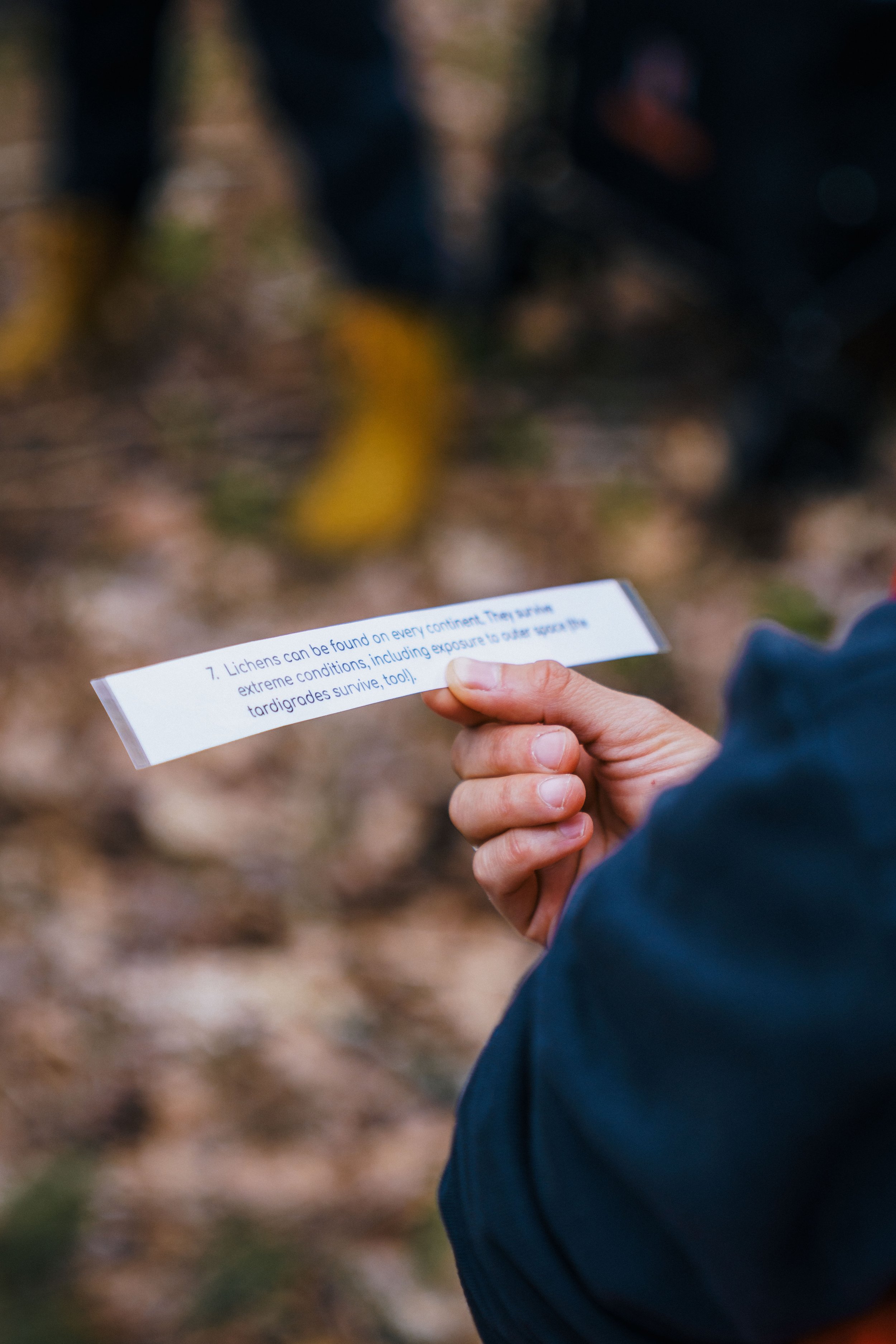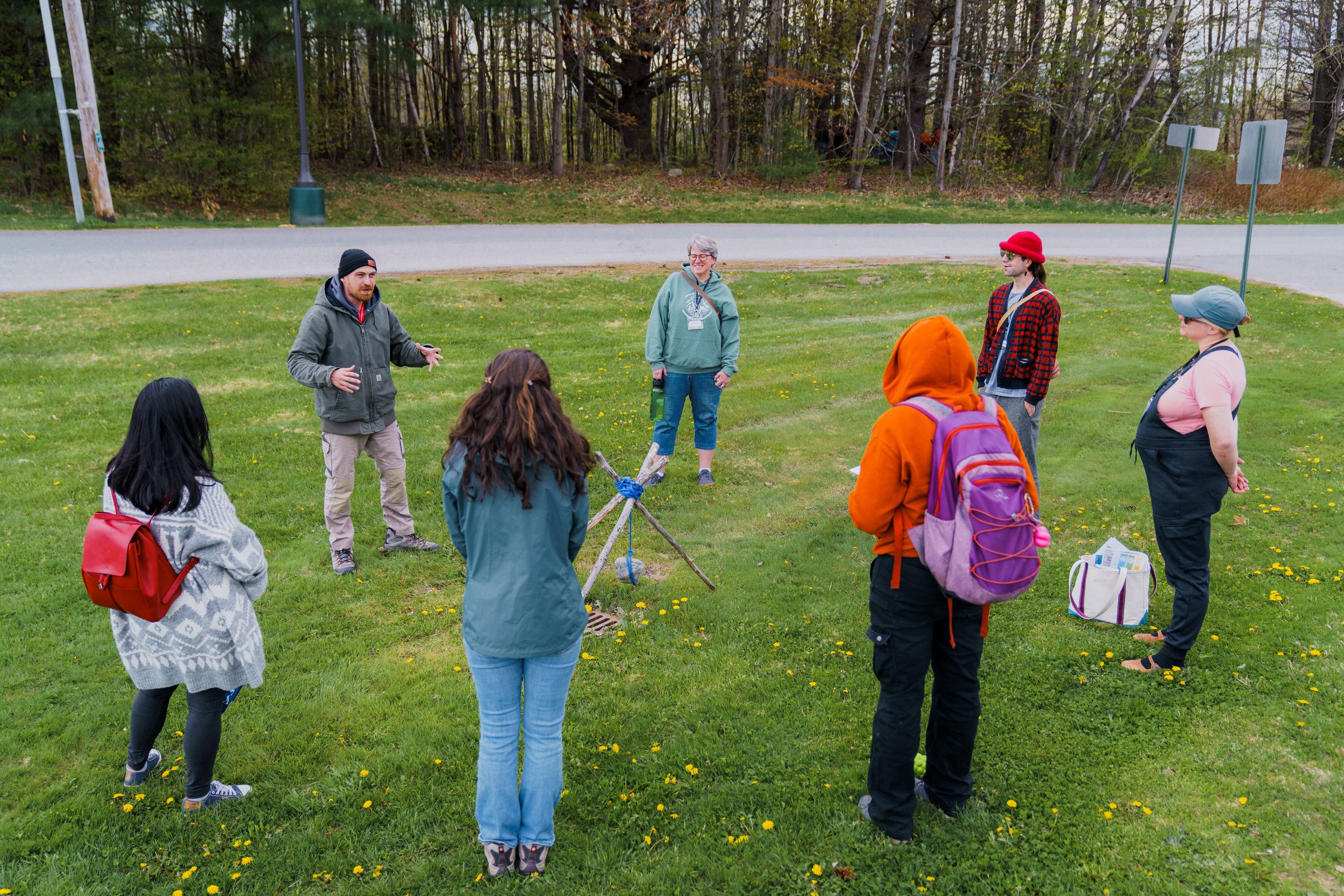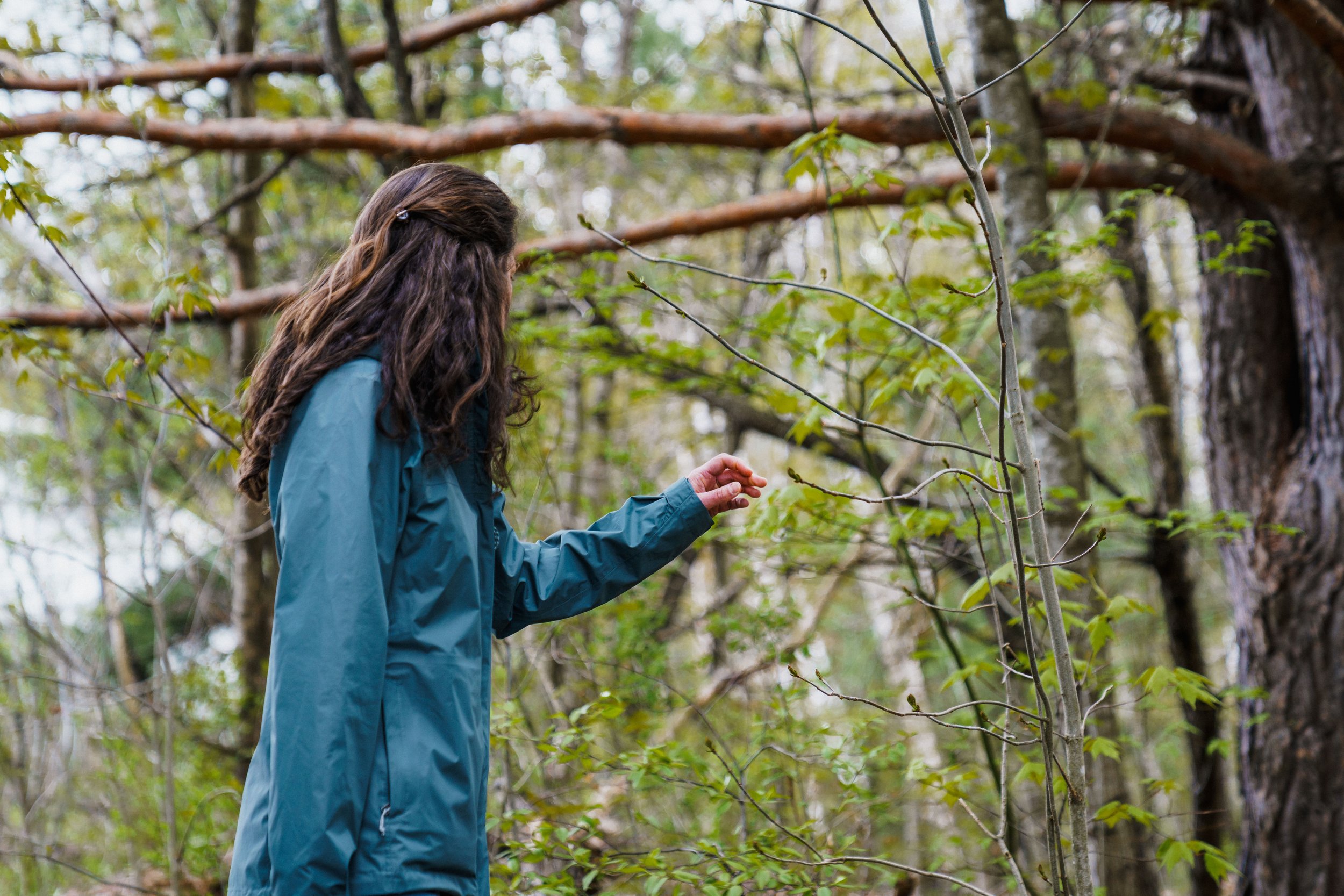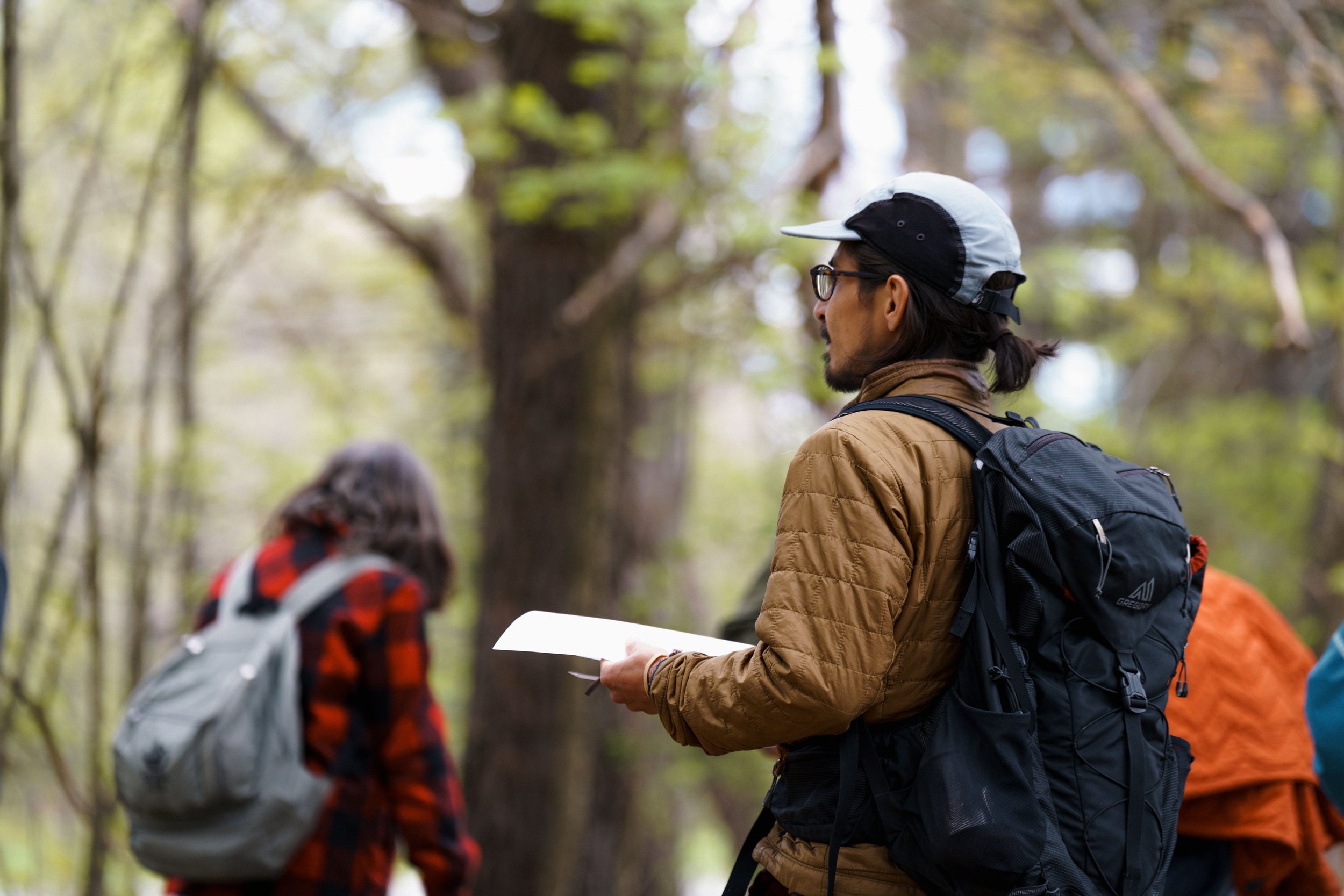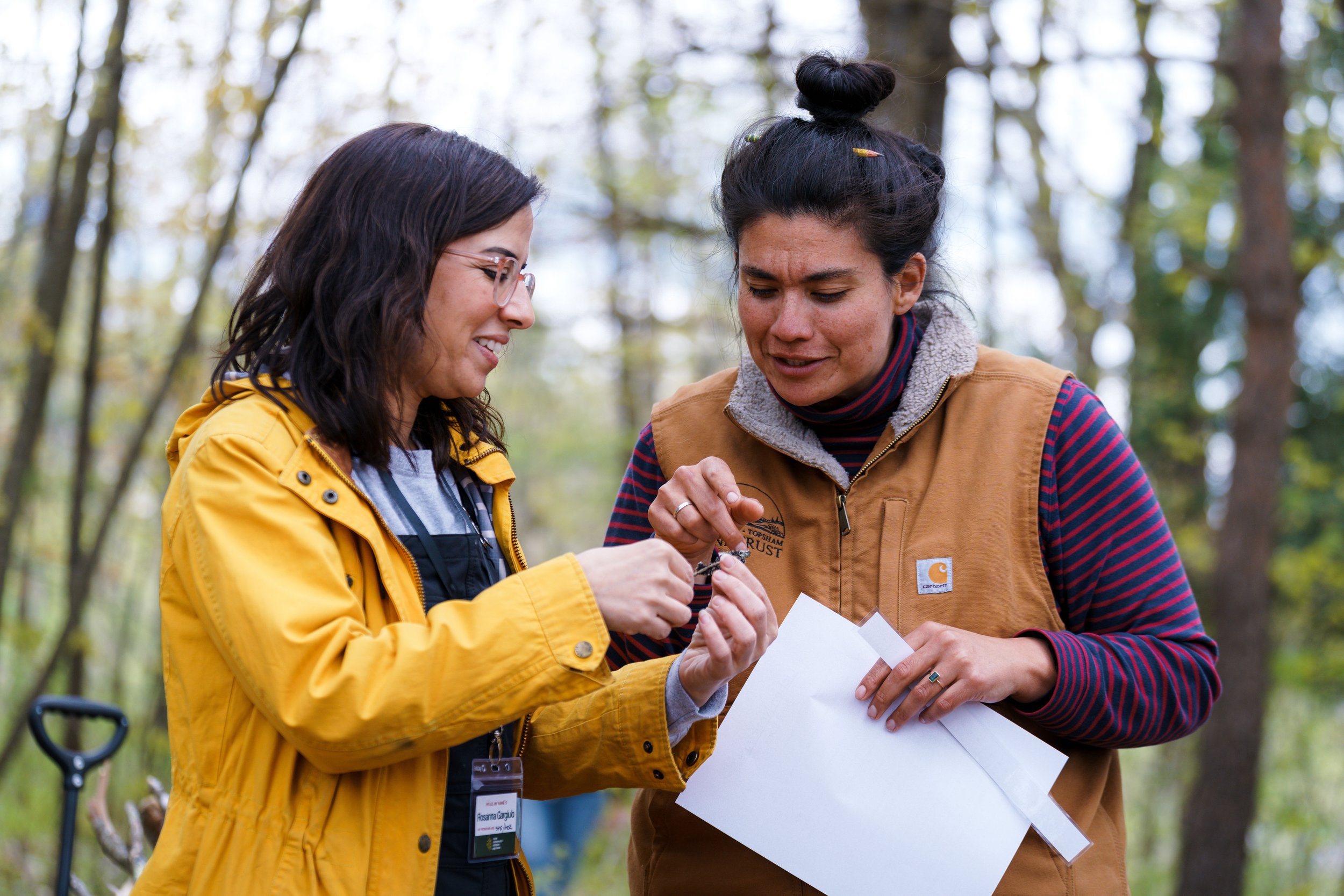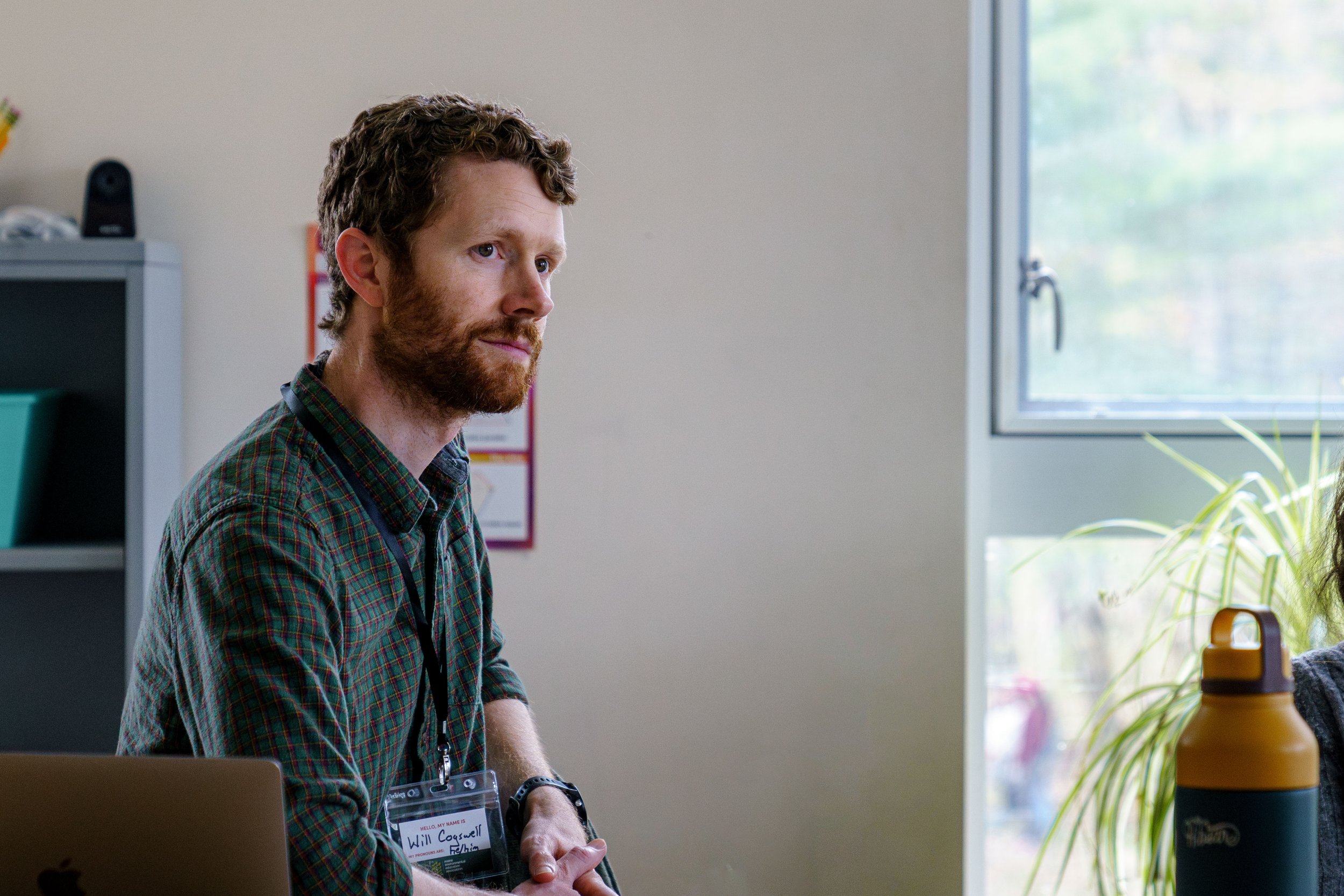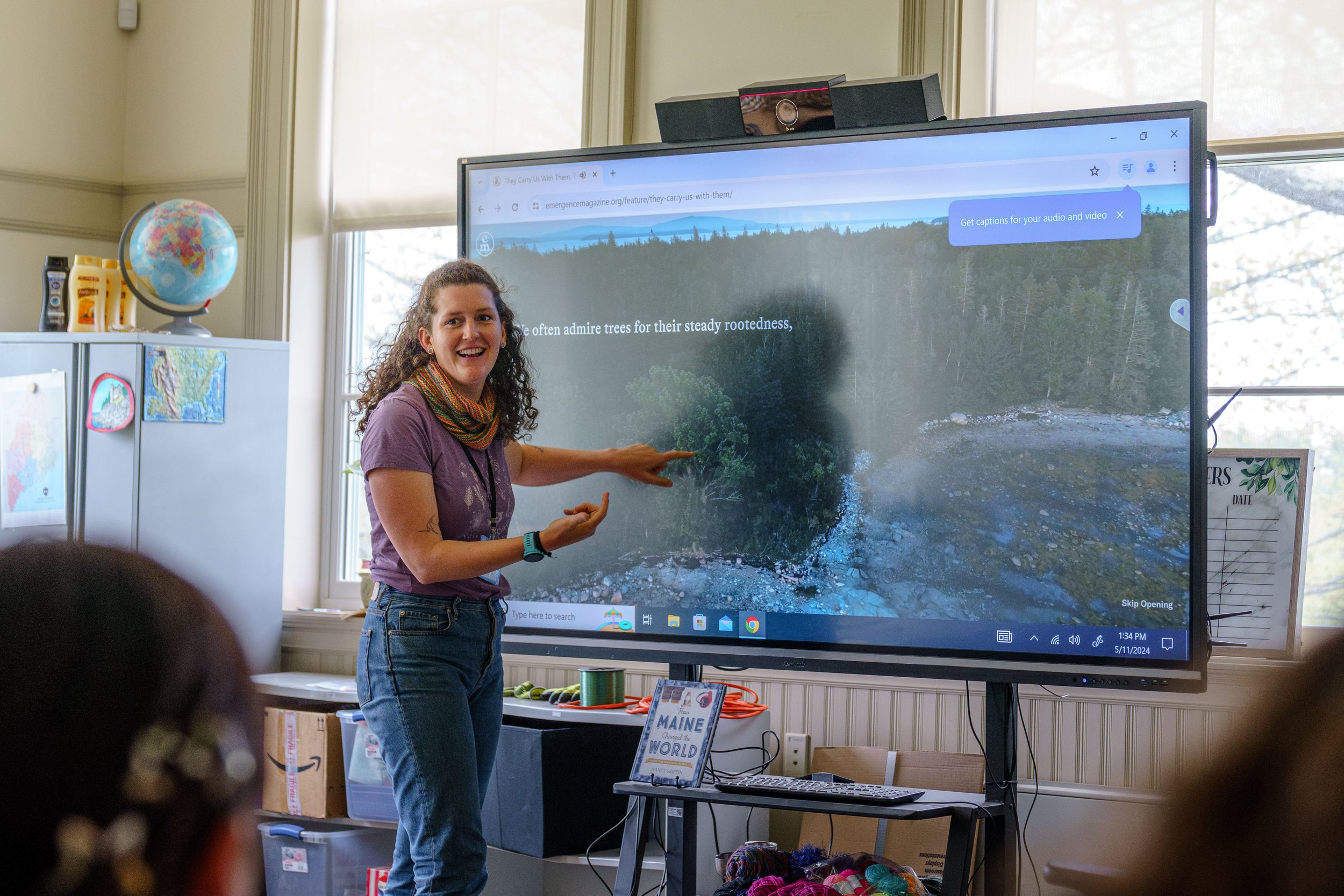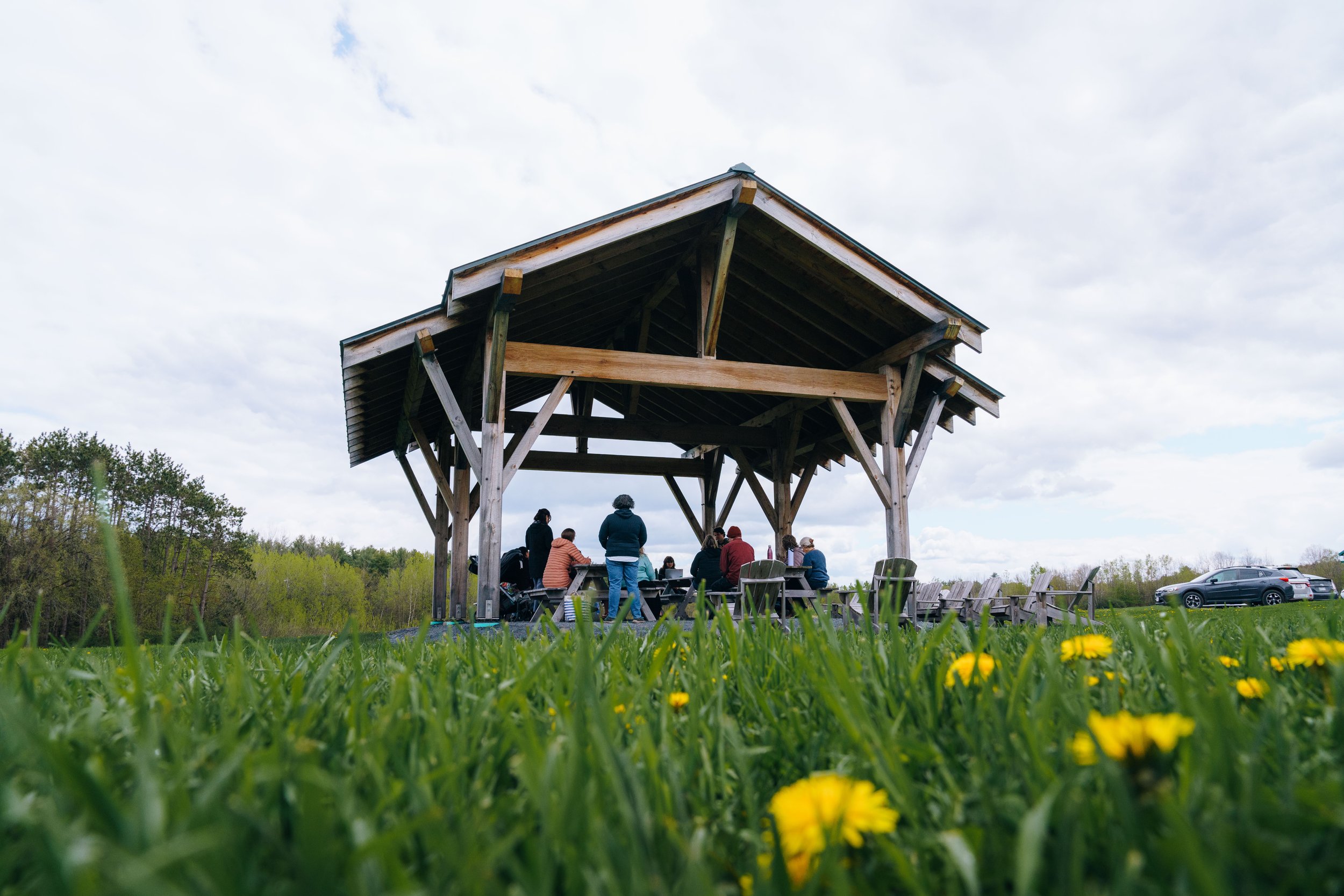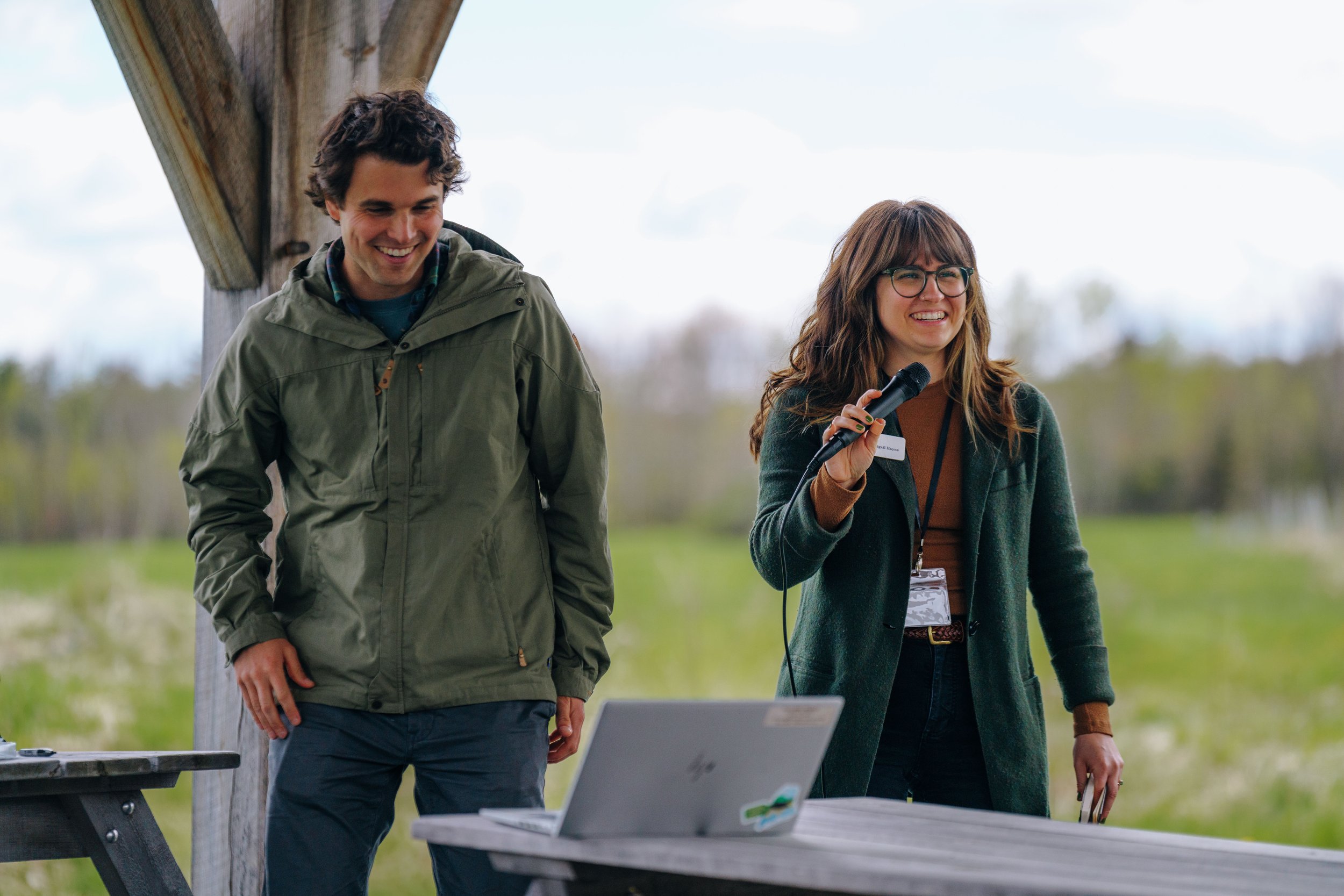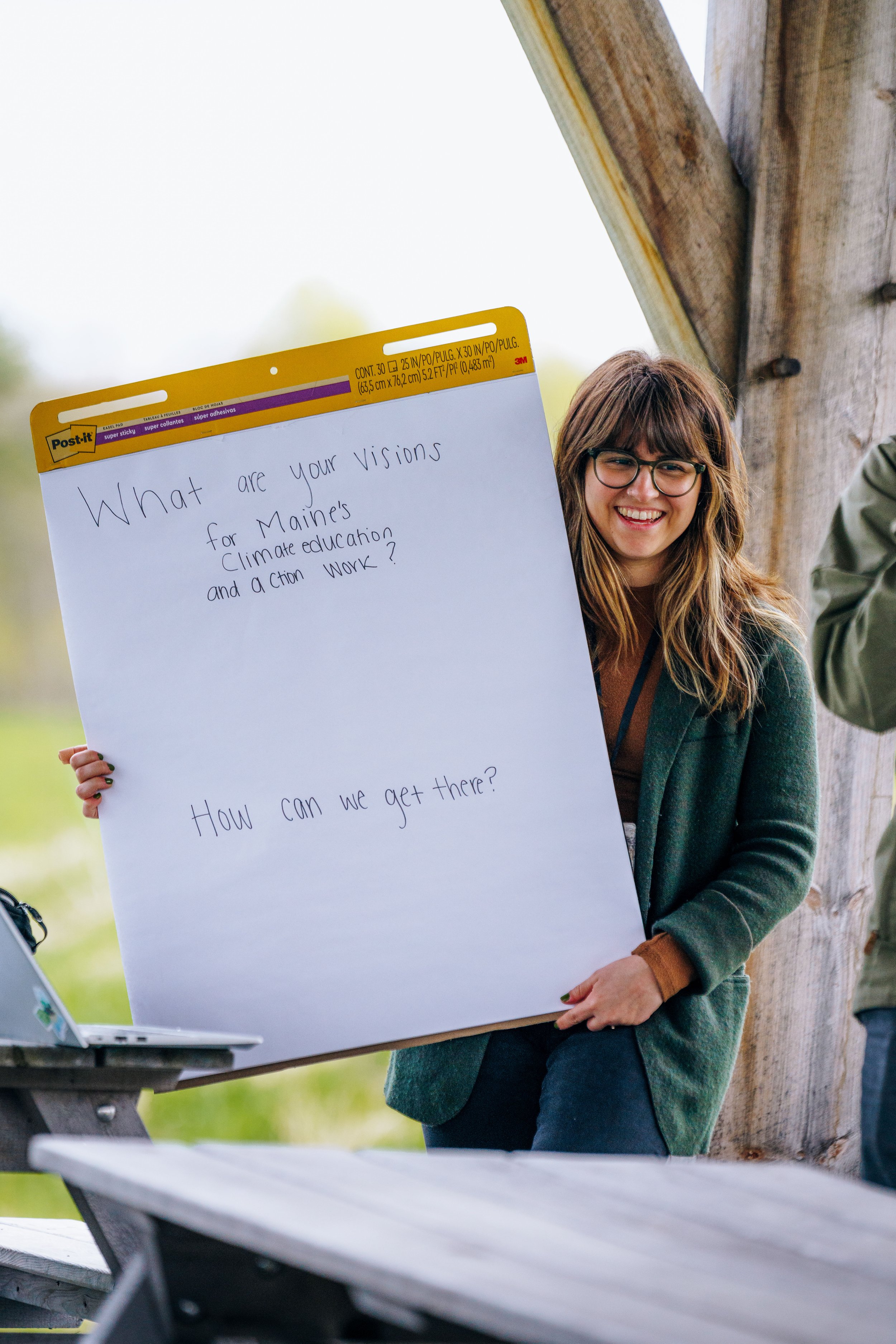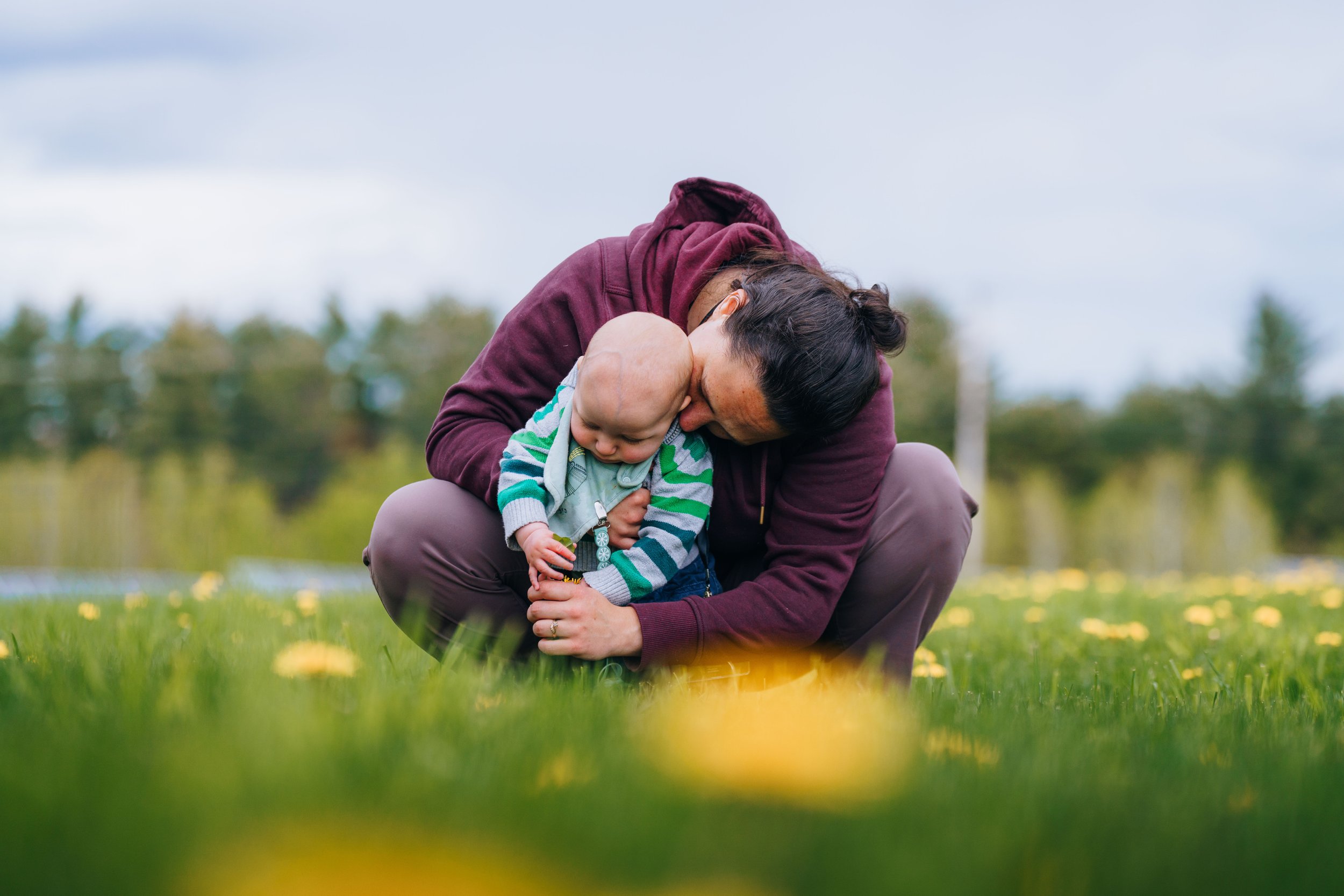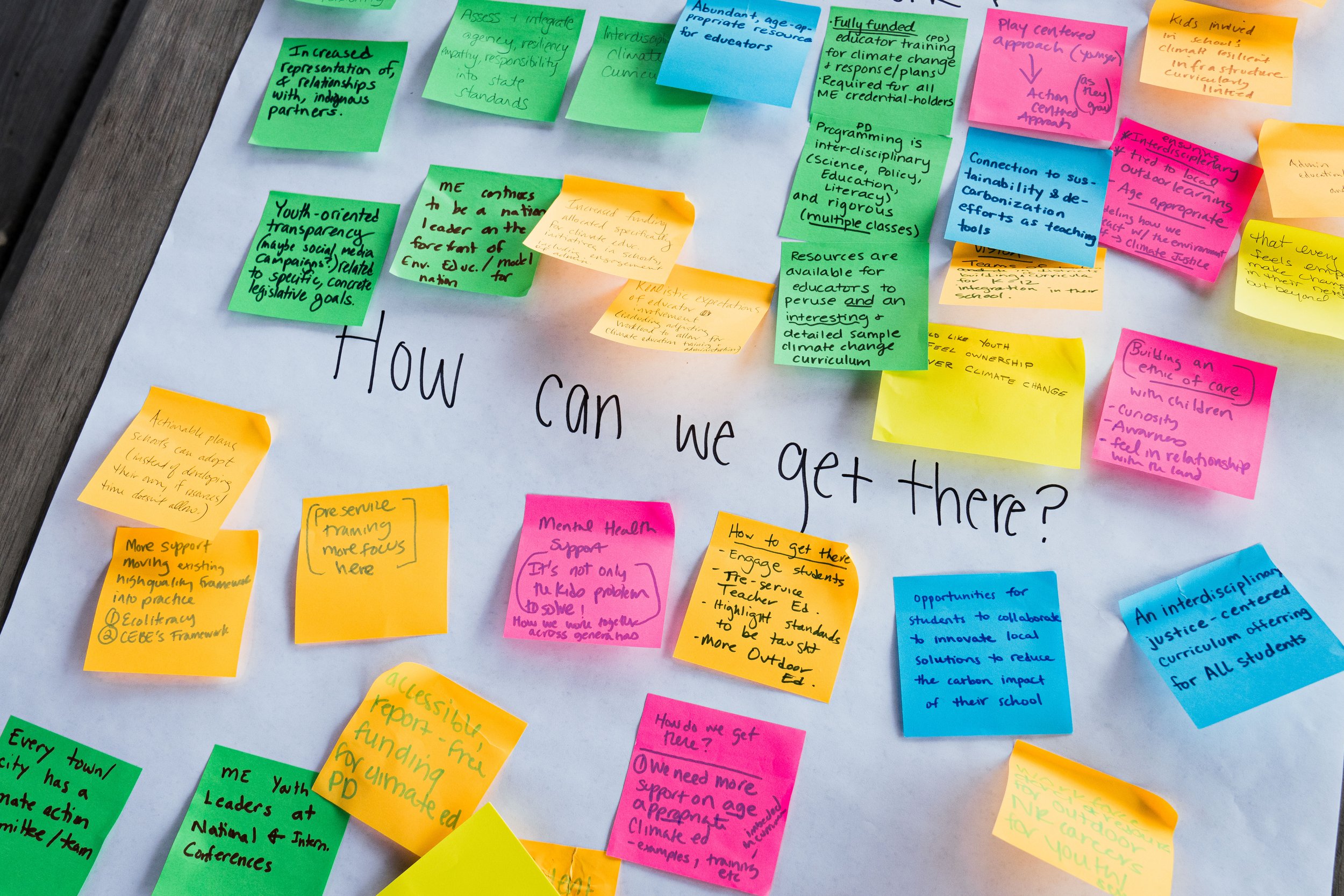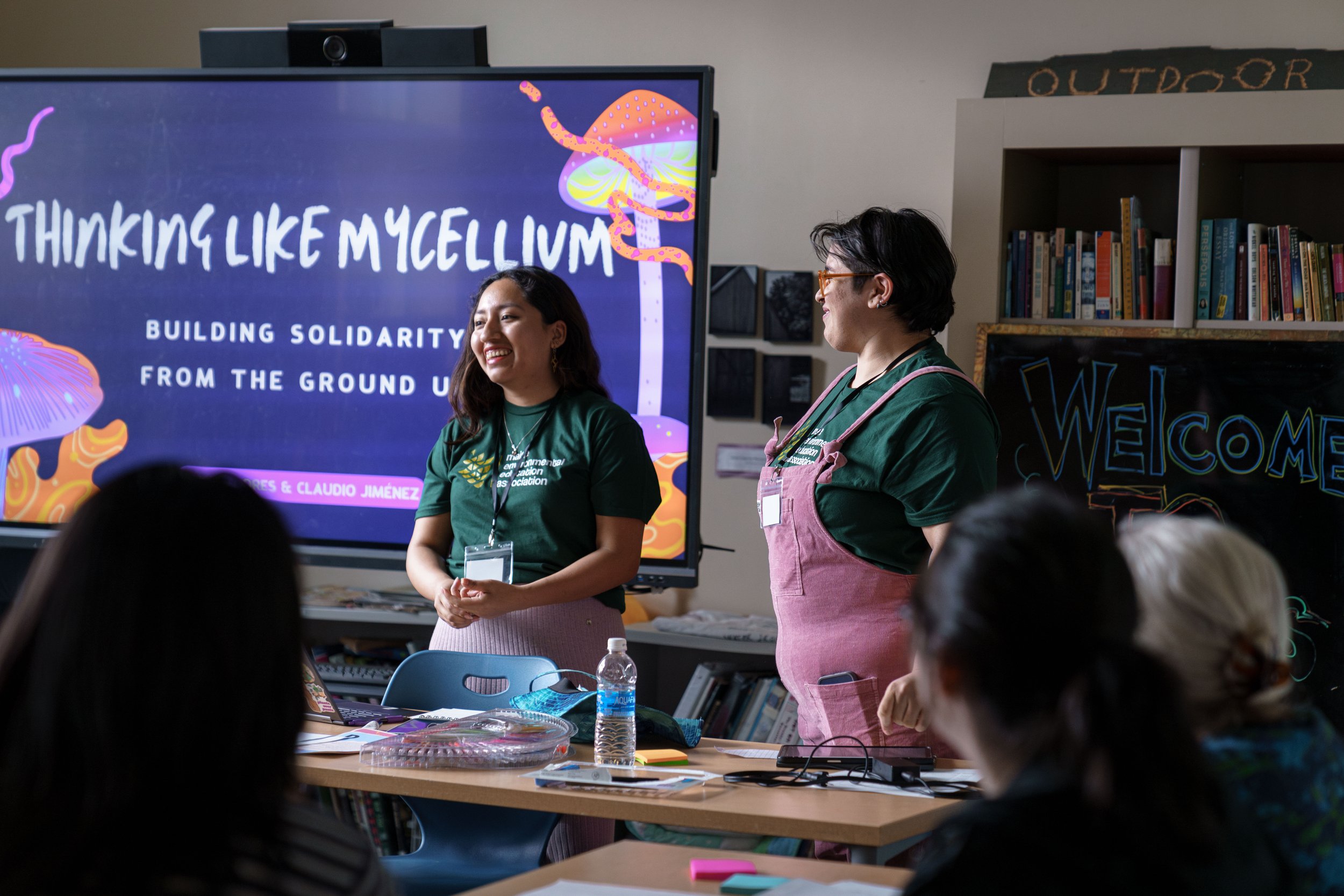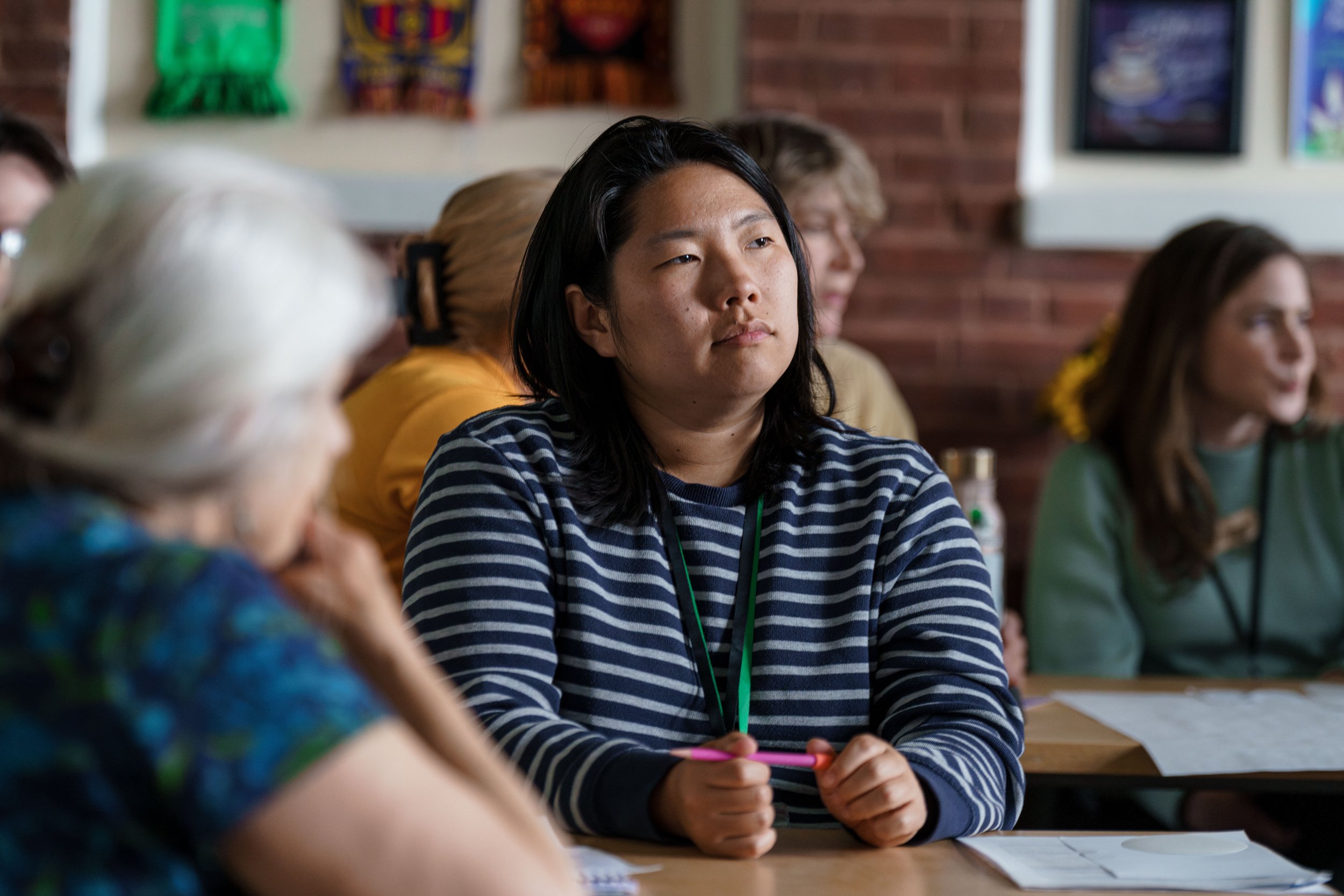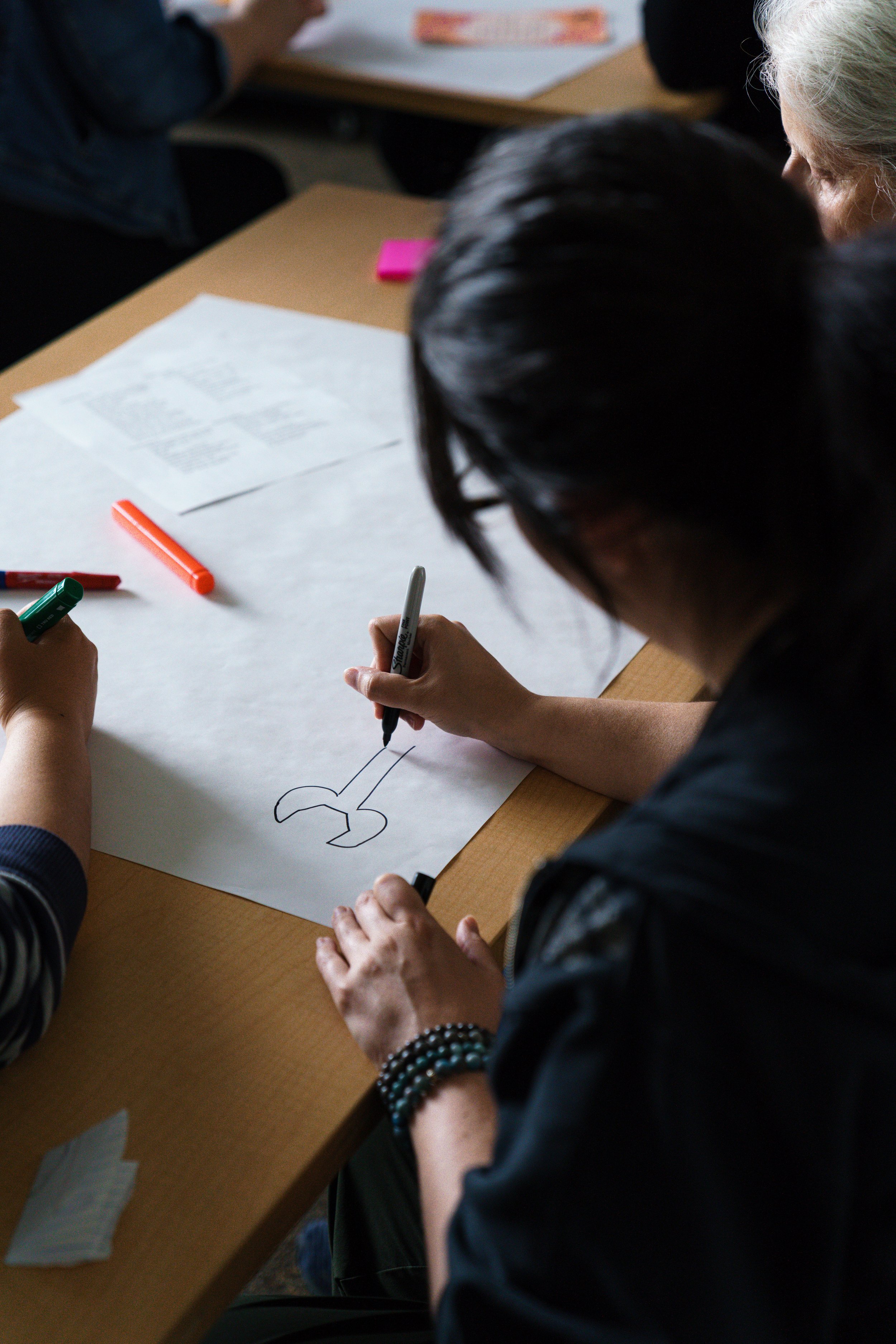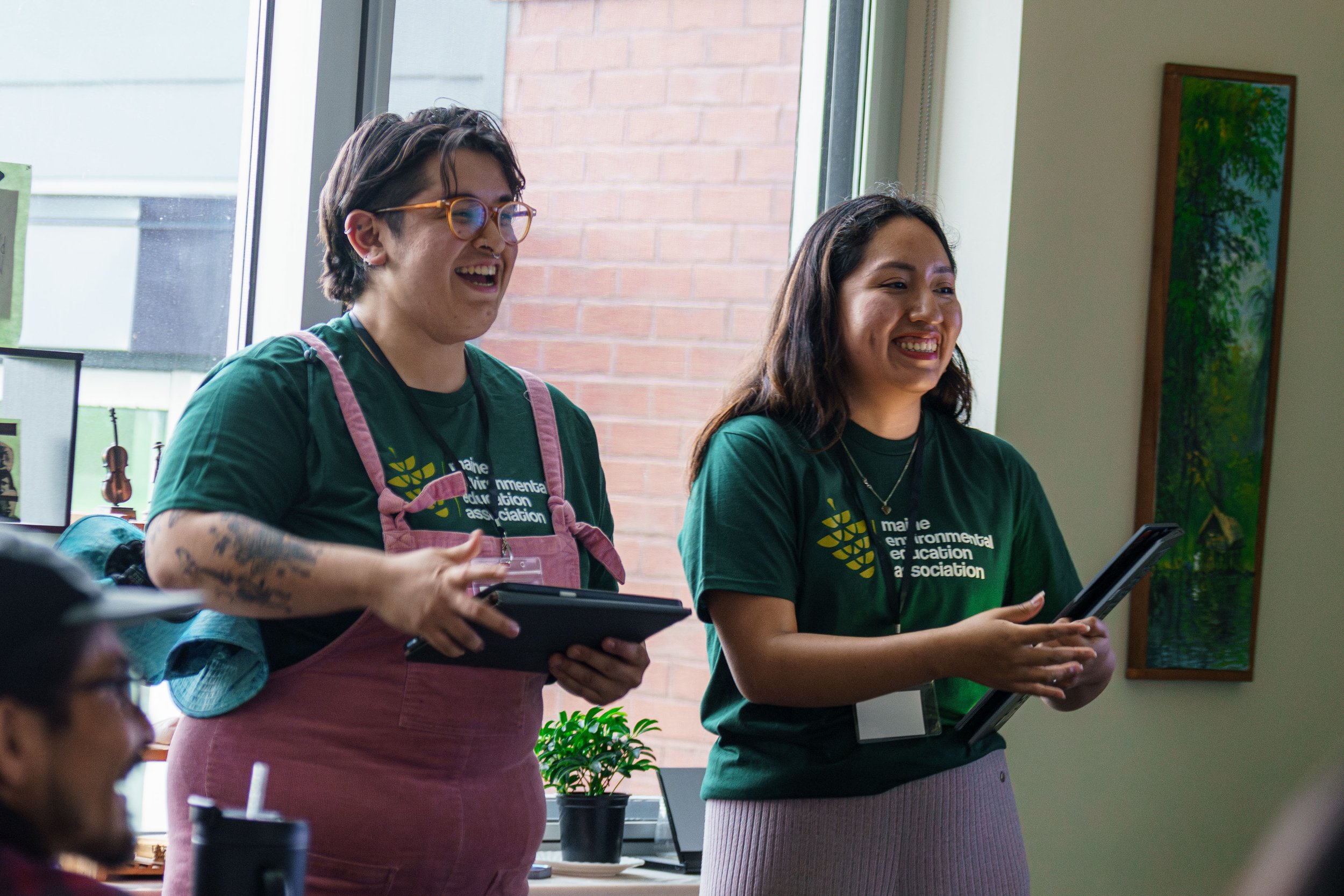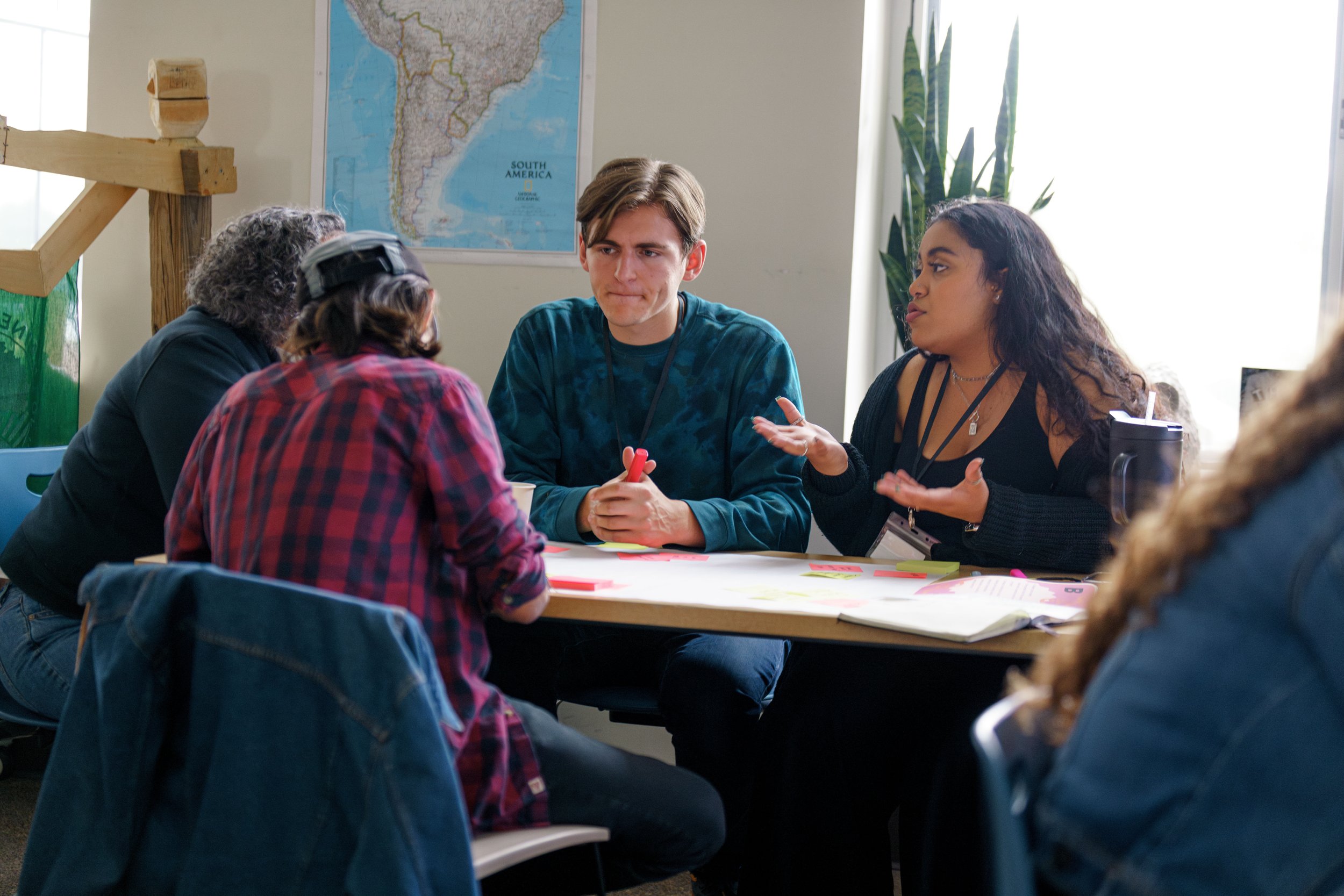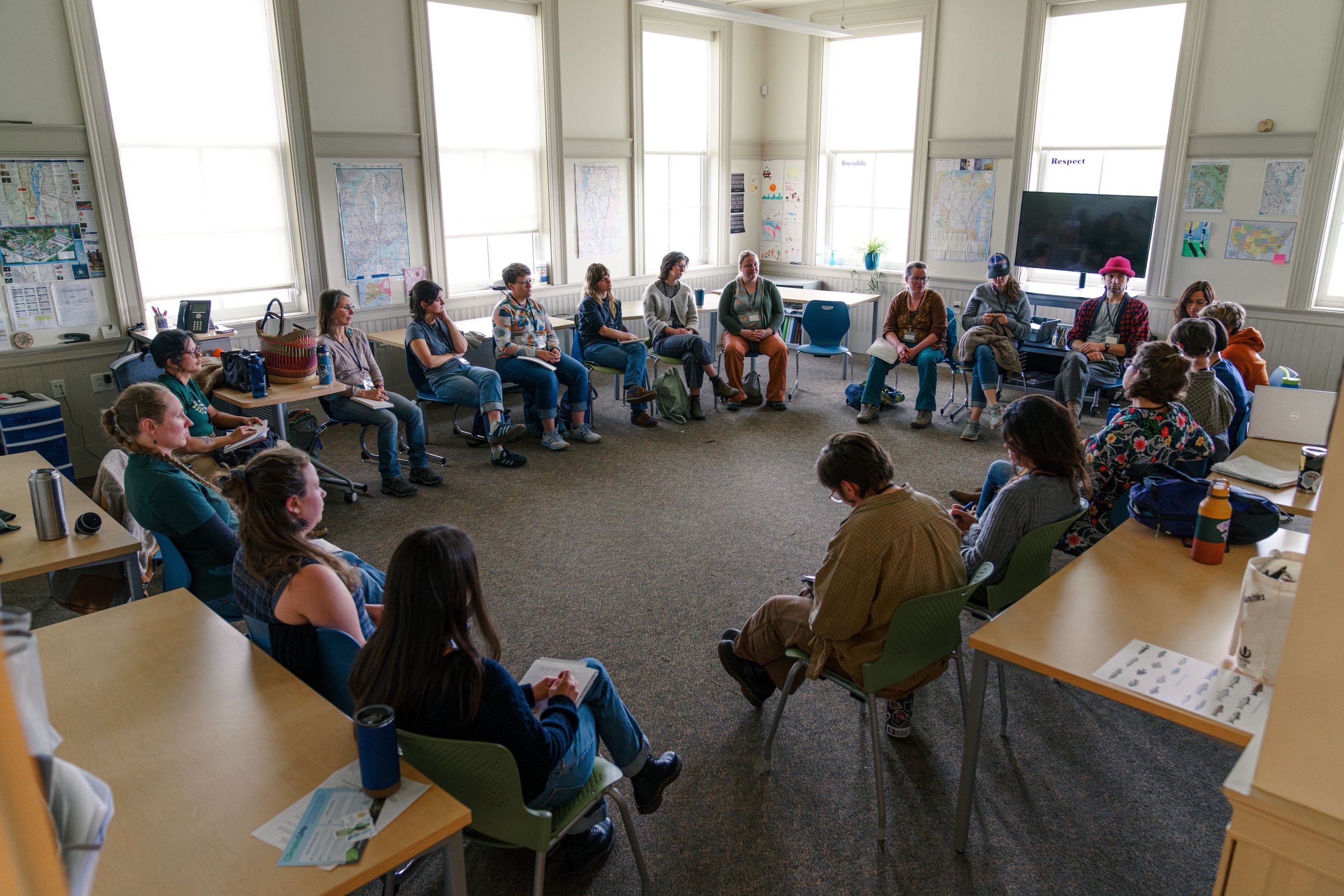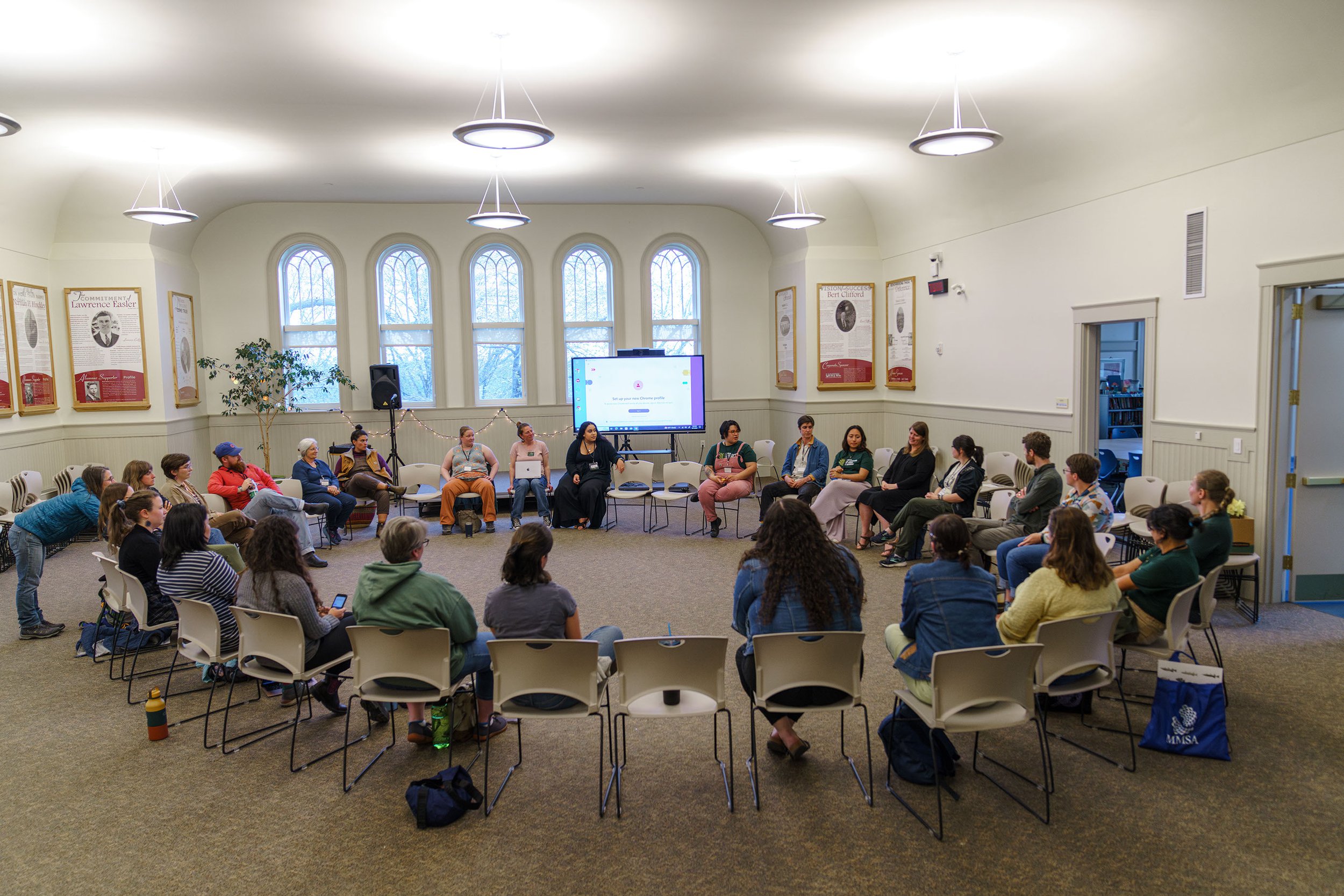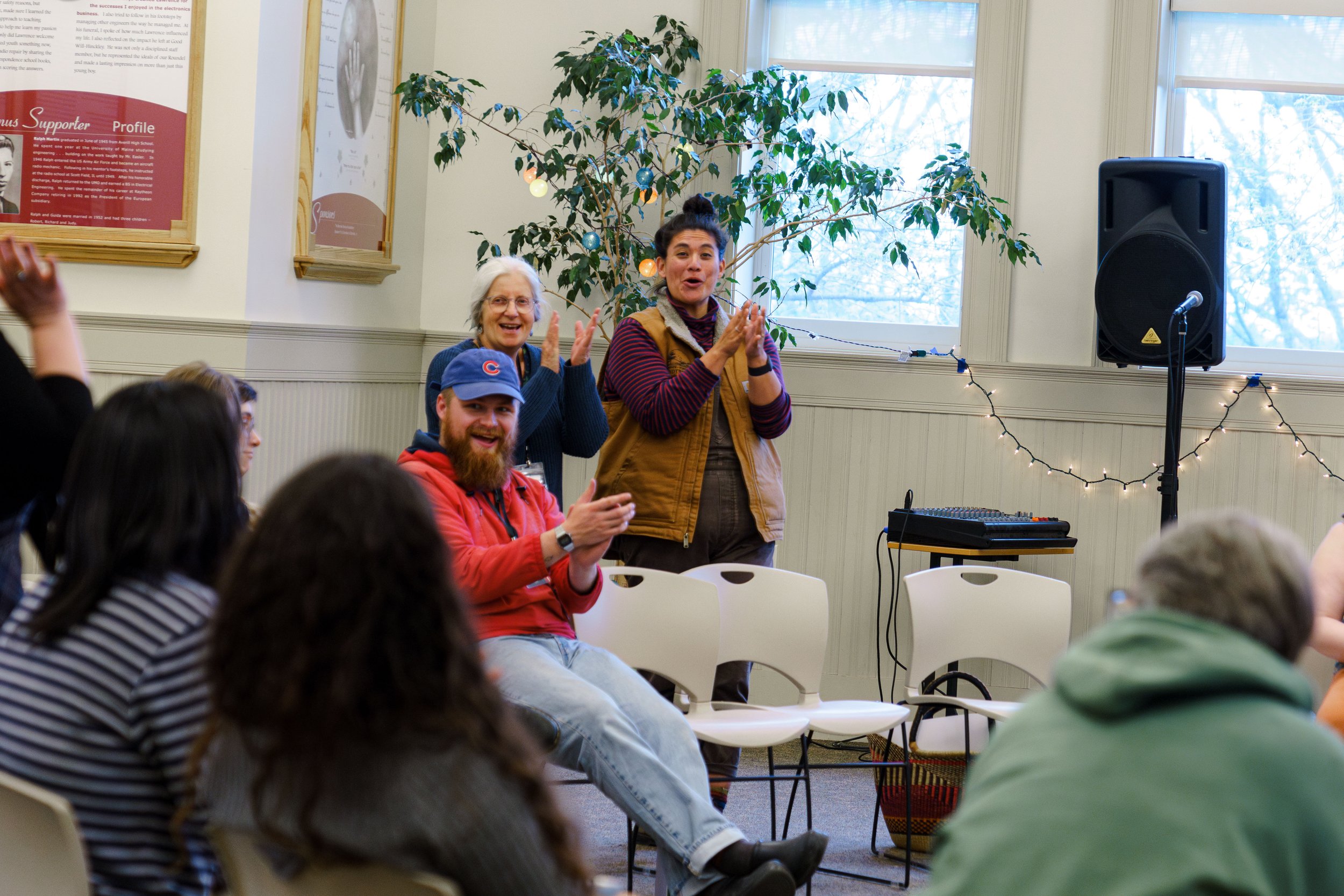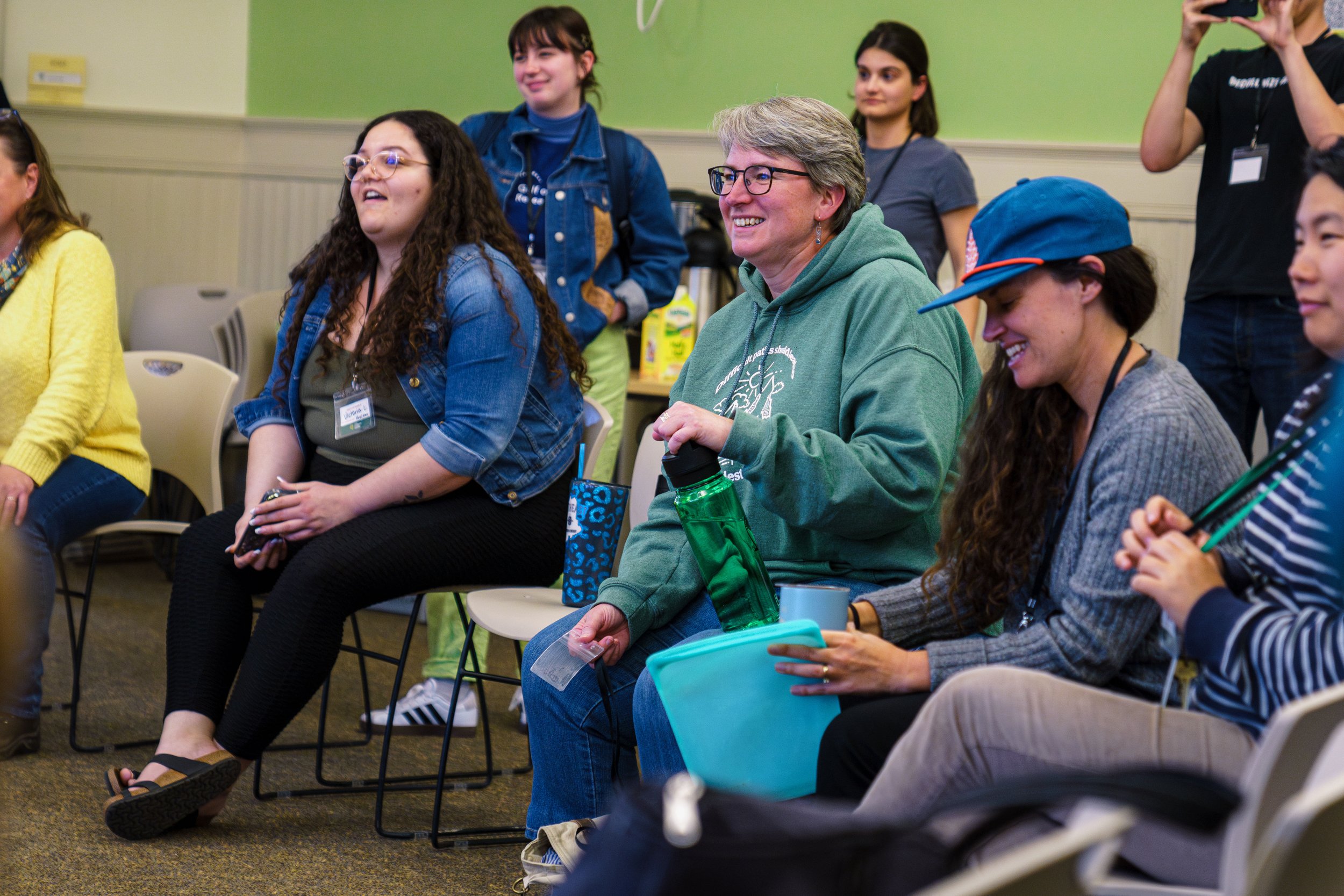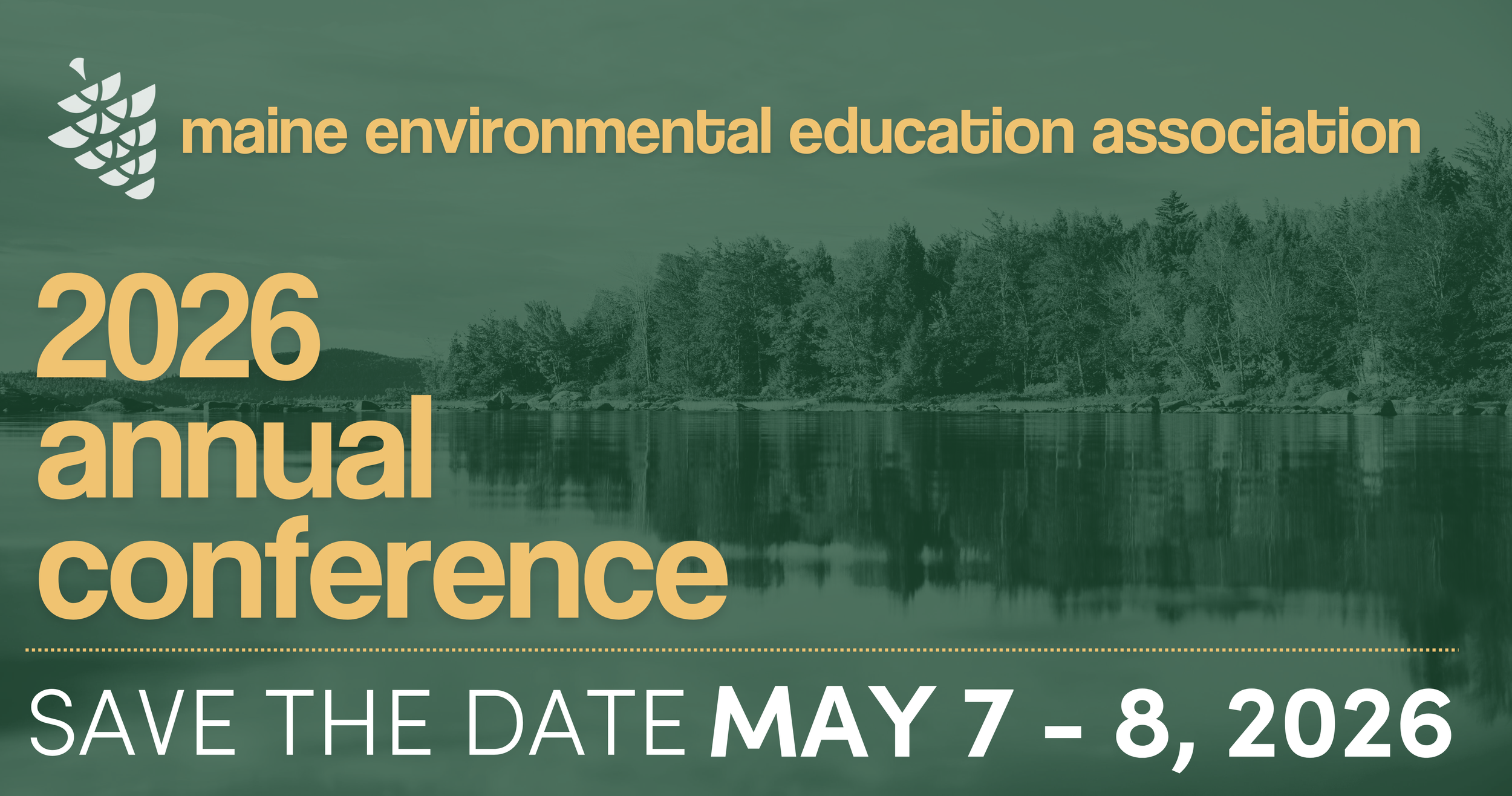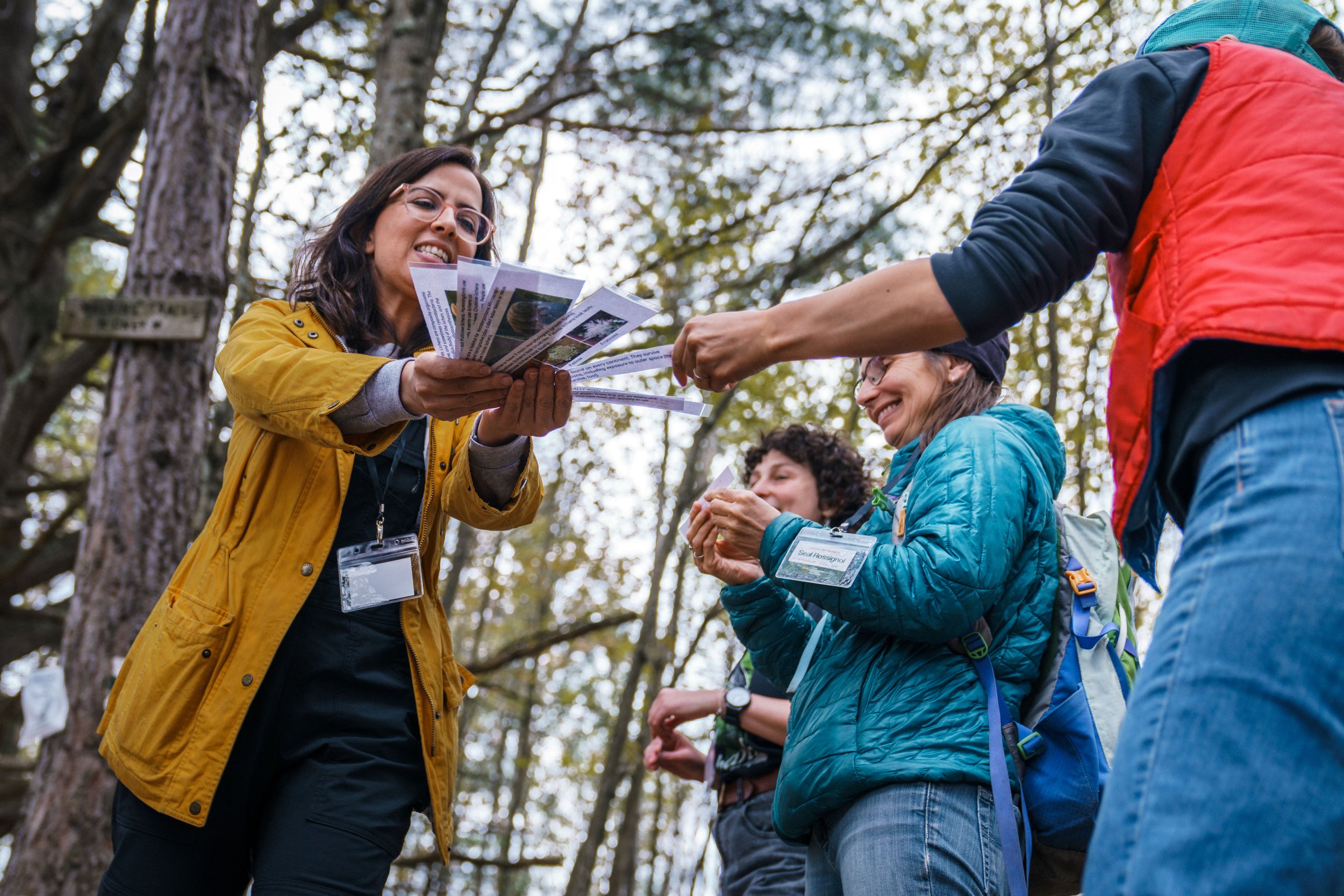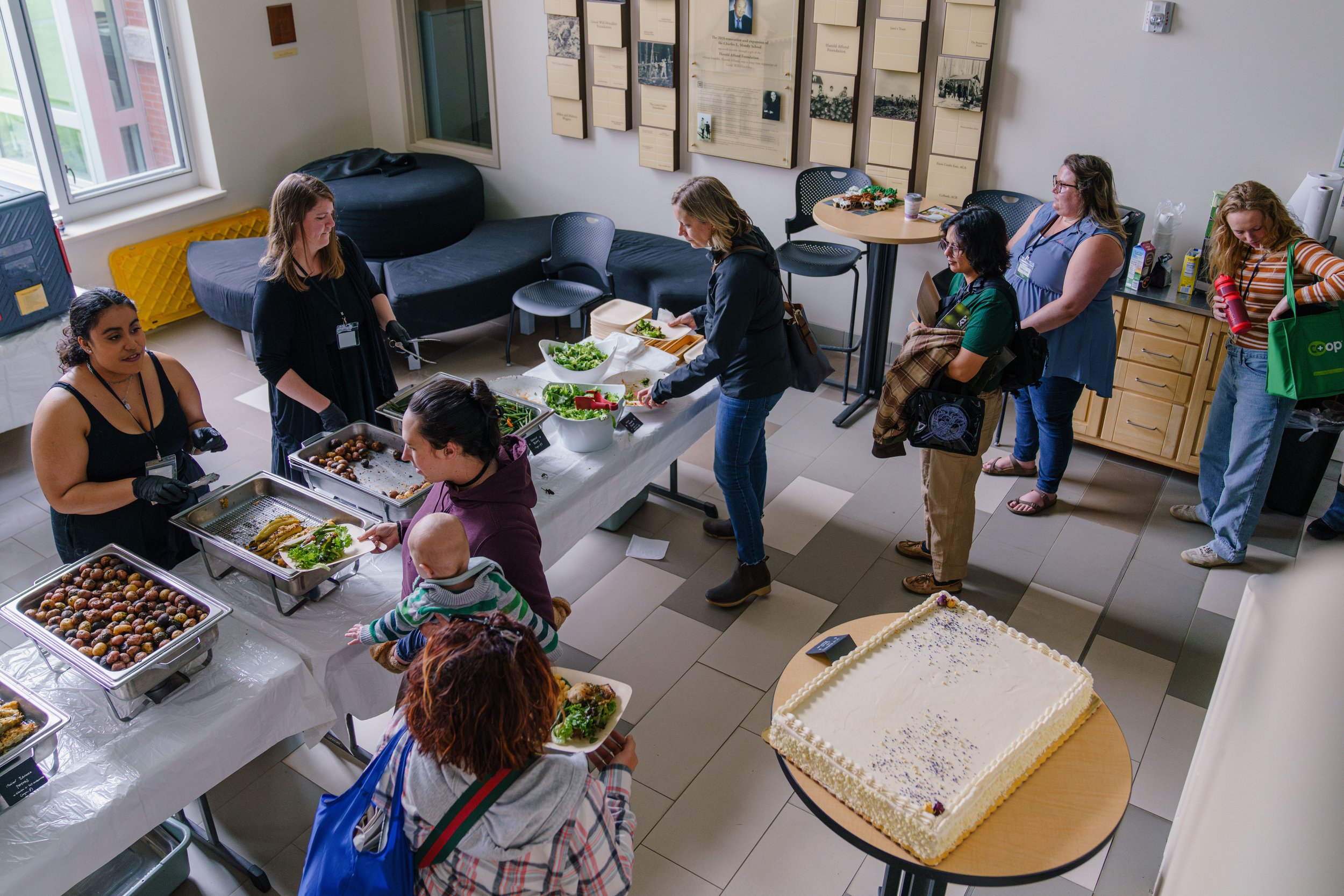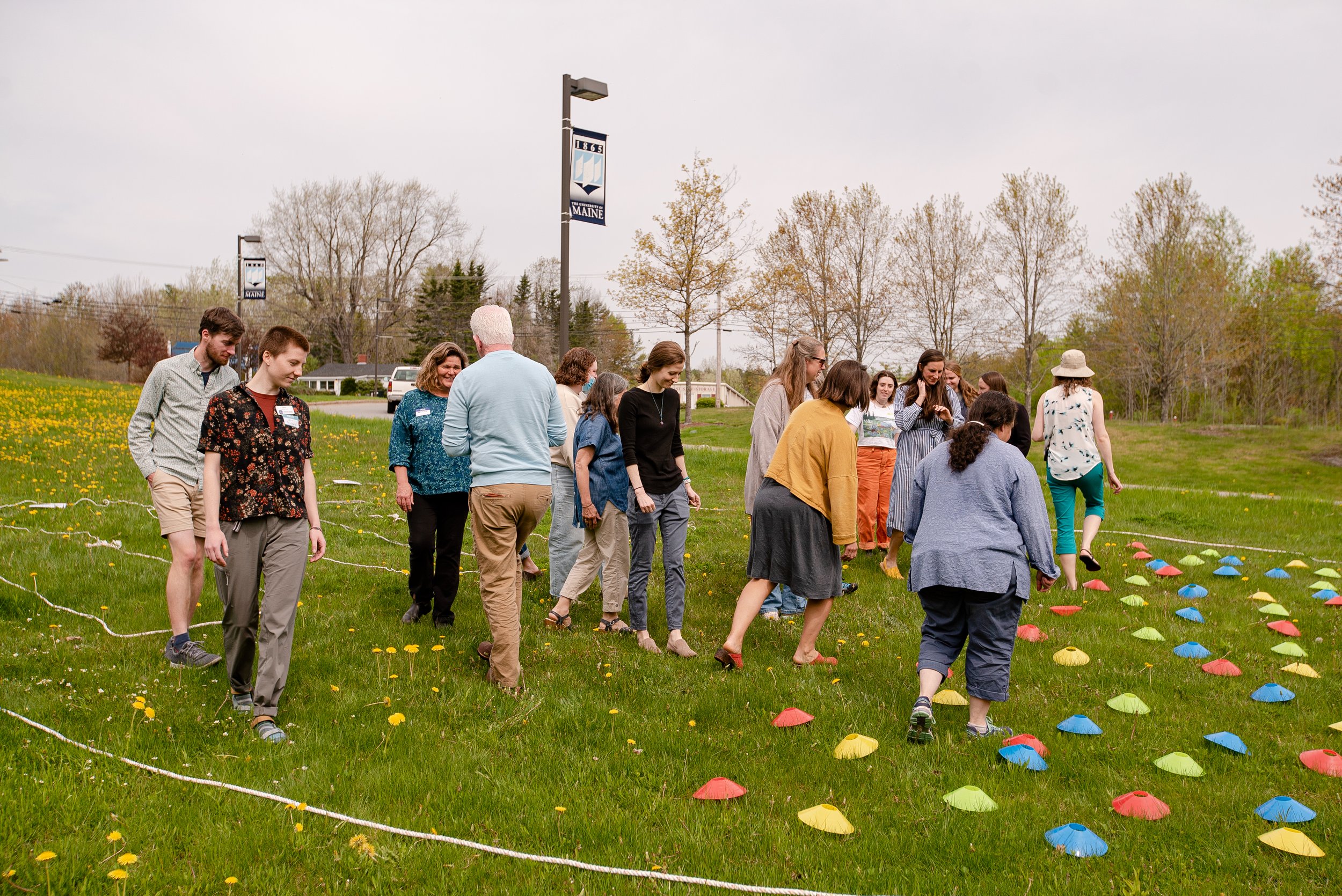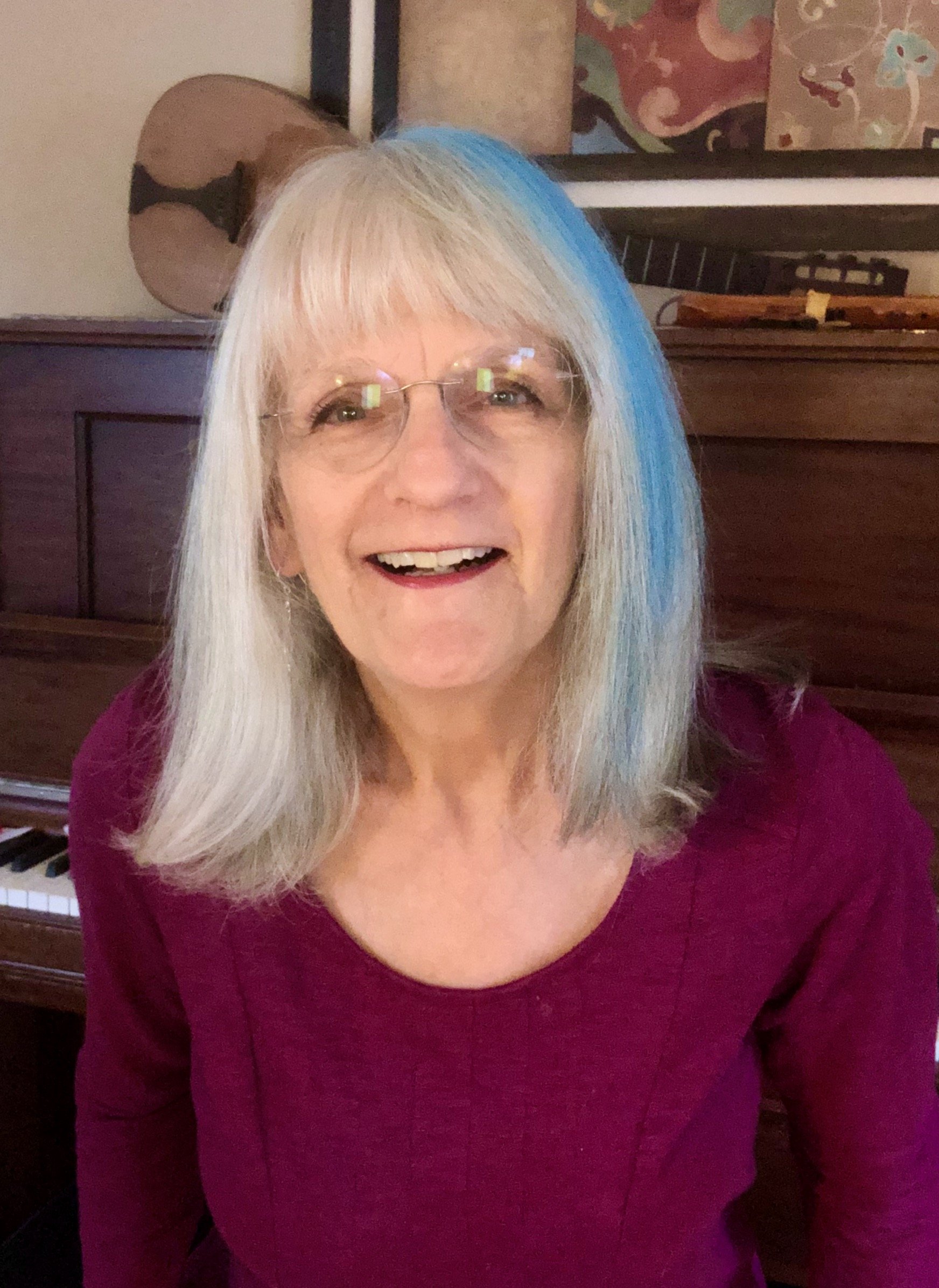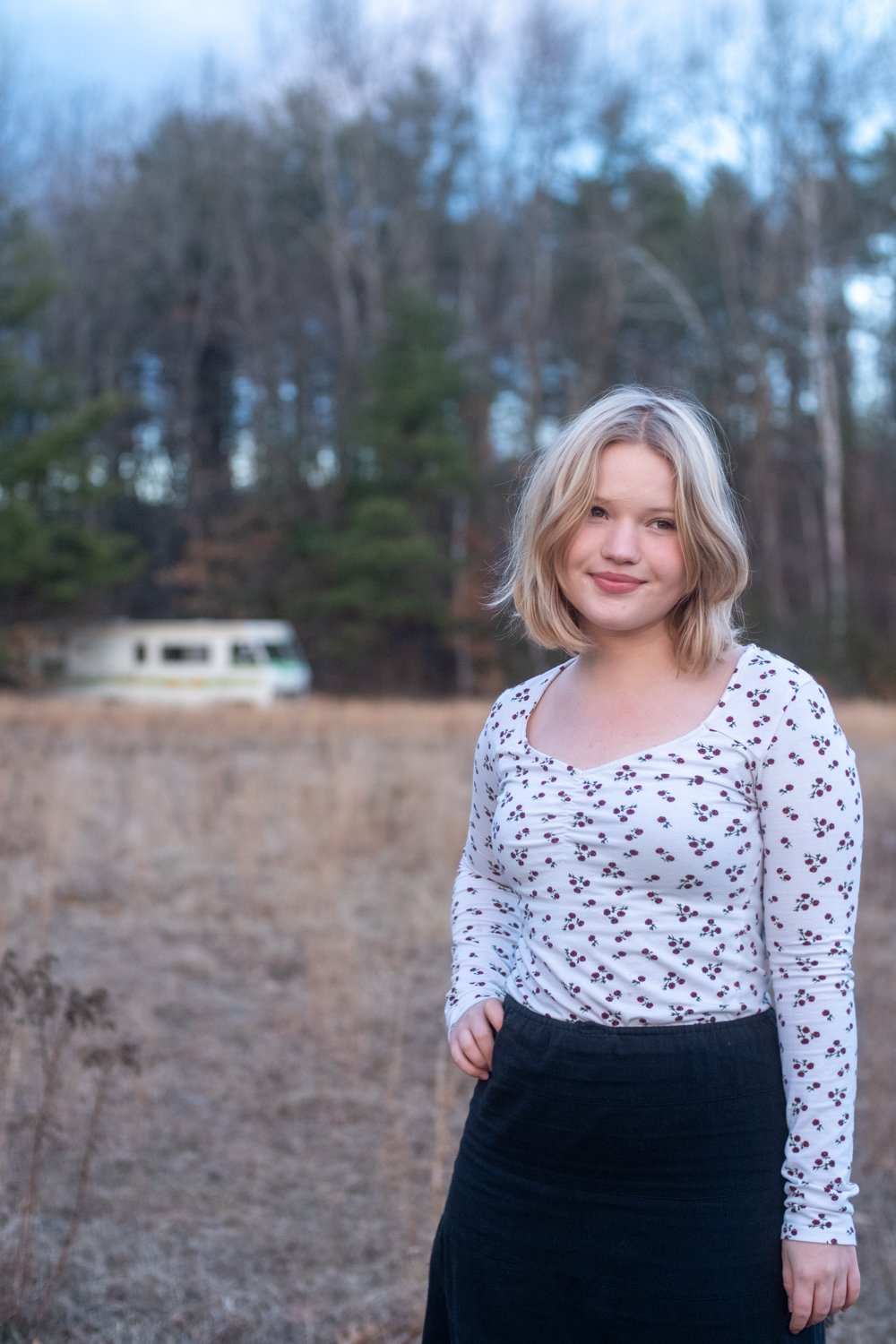Save the date! The 2026 MEEA Conference will be held on Thursday, May 7th and Friday May 8th, 2026. We’re excited to announce the location in January, so stay tuned! (Pssst, the photo above is a hint.)
Thanks to everyone who attended the 2025 conference. Share your feedback below to help us make this year’s workshops and offerings even better!
ABOUT THE CONFERENCE
This two-day conference is intended to restore a sense of connection and encourage new people to see themselves in the environmental education community in Wabanaki homelands now called Maine.
You’ll gain inspiration from interactive outdoor and indoor workshops about outdoor learning, climate justice, Wabanaki studies, and community organizing. We’ll come together through common goals for our environment, schools, and communities. We hope the conference can hold space for dialogue about both the challenges we face and the successes we have.
WHO IS THIS CONFERENCE FOR?
The conference is open to anyone interested in environmental and climate education, outdoor learning, climate justice, Wabanaki studies, and community organizing. We encourage anyone who is looking to connect with a community around these topics to attend.
People who have attended in the past include classroom educators, community educators, students, early career professionals, school administrators, nonprofit professionals, and community organizers. Conference workshops aim to be accessible for many interest and skill levels.
Your voice is part of what makes the MEEA network a vibrant community.
Watch this video highlighting the voices of the workshop presenters at the MEEA 2023 Annual Conference to get an idea of the various perspectives that come together for the two day event.
Want to support Maine’s environmental education community? Sponsor next year’s MEEA Annual Conference!
Thank you to our 2025 sponsors!
MEEA LEADERSHIP
MEEA BENEFACTOR
William Griset & Lisa Greenberg
MEEA SUPPORTER
MEEA FRIEND
Catherine Lee
ACCESSIBILITY
Scent-free Location
We encourage attendees to avoid wearing scented fragrances such as perfume, cologne, essential oils, and any strongly scented personal care products such as scented deodorant. Also consider wearing clothing not washed with scented dryer sheets or scented laundry detergents. This supports conference attendees who have immediate reactions to fragrance due to allergies or sensitivities. Learn more about scent-free accessibility here.
Masks are encouraged
We encourage attendees to wear face masks for public health safety, but do not require them. Some workshop preseters may request their workshop participants to wear a mask, so there will be masks available at the entrance to the workshop. There will also be masks available at registration.
Registration fees are sliding scale.
We do not want cost to be a barrier to participation, so we’re offering a range of registration fees determined by financial mobility. Please choose the option that best fits your situation. If you are able to pay more than $150 (see sponsorship link here), these funds will go towards putting on the event and to ensure accessibility for all.
How do I choose my registration payment amount?
Choose a lower price if you are an individual not affiliated with an organization and have less financial resources
Choose a mid range price if you are an individual with financial resources who is not affiliated with an organization
Choose a higher range price if you are an individual with more financial resources and/or are participating via an organization or school
Workshop & Annual Awards
Thursday, May 7, 2026
Free
$15
$35
$50
Annual Conference
Friday, May 8, 2026
Free
$25
$50
$75
$125
$150
Exhibitor Tabling Fees
$50 for nonprofit organizations
$75 for for-profit business
Only one person from your organization needs to pay the exhibitor registration fee.
Each individual tabling for your organization needs to register for the conference individually. Link will be available March 14.
Individuals exhibiting will be asked to pay $35 for lunch if they choose to eat at the event.
Our Director of Operations will collect payment in-person on May 10.
Here are last year’s workshops
Click the links below to view the 2025 workshops in that category.
Skills For Action Workshops
Saturday, May 10 | 9:35 - 10:35am
Employee’s Declassified Career Survival Guide
Ray Mills and Sulwan Ahmed, Changemakers Residents at Maine Environmental Education Association and The Nature Conservancy Maine
Bethany Humphrey, Consultant
-
Ray Mills (she/they) is primarily of Wabanaki and Franco-American descent and currently serves as a Climate Adaptation Resident in a joint position with the Maine Environmental Education Association (MEEA) and The Nature Conservancy in Maine (TNC). At MEEA, she currently focuses on data analysis for The Listen Project, a participatory, youth-led research project examining Maine’s youth climate movement. At TNC, her work centers on strengthening community resilience through the implementation of Nature-Based Solutions to climate change. Additionally, Ray is a Member and Mentor for the National Wildlife Federation’s Education and Engagement Youth Advisory Council, where they contribute to shaping professional development workshops for young and emerging professionals.
-
Sulwan (she/her), is a first generation Sudanese refugee in Portland, Maine. Sulwan graduated from Bowdoin College in 2022 with a B.A. in Gender, Sexuality, and Women’s Studies, and concentrations in Africana Studies and Sociology. Sulwan fled the Darfur genocide with her family in 2001, relocated to Egypt, and eventually settled in Portland, Maine in 2003. Her passion for environmental justice is deeply connected to her identity as a displaced person, she is feeding this passion through her work as the 2024-2026 Community Initiatives Resident for The Nature Conservancy and Maine Environmental Education Association. Through her work, Sulwan hopes to deepen her understanding of the intersections of environmental justice, migration, and community health. She aims to apply her insight to cultivate practices that positively impact BIPOC and low-income communities in Maine.
-
Bethany Humphrey (she/her) works at the intersections of people, data, and the environment. She currently consults with nonprofits and businesses, offering program evaluation, data analysis, and grant writing services. Prior to starting her own business, she worked at organizations across Maine in the fields of STEM education, conservation, trail stewardship, and youth leadership.
-
Are you starting your career? Want to learn how to navigate the working world and share your experiences with others? Join us to learn how to advocate for yourself, recognize healthy and unhealthy workplaces, and build skills to navigate difficult work situations. This workshop is catered towards youth under 30.
Saturday, May 10 | 10:45 - 11:45am
Wheelchairs in the Wild: Exploring the Intersections of Environmental and Disability Justice
Lock Oleander, Sick Crip Collective
-
Lock Oleander (they/them) is a community organizer living on Unceded Wabanaki Territory/in so-called Maine. They are a community organizer of over 10 years, who centers their advocacy around their lived experiences of existing in a body (& mind) that is multiply marginalized. They enjoy long rolls in their wheelchair, petting the nearest cat, and creating art in many forms.
-
How can we make tree-hugging accessible to all? Come learn about bedridden bird watching, climate change canaries, access audits, and the interconnected (and inseparable) struggles for ecojustice and disability rights. Join the dialogue through a community discussion where you can share your thoughts, wisdom, questions, and dreams. Leave empowered, with resources to create change and concrete actions you can take.
Saturday, May 10 | 10:45 - 11:45am
Rooting in Consent: Trust-based Storytelling for Advocacy and Systems Change
Tessa Shanteler, Eli Kao, and others, Stories for Change
-
Tessa (she/her) is one of the co-chairs of the Stories for Change Working Group and on the Steering Committee. She started in this Working Group as a general member (April 2022), for a short 5 months, quickly becoming a co-chair, alongside Nirmala Young (from September 2022 to May 2024) and now alongside Eli Kao (starting May 2024), with the added honor of being the co-chair Steering Committee Representative! Tessa is originally from NH, but is a rural Mainer at heart, currently residing on the unceded lands of the Wabanaki, in what is now known as Winslow, ME, nestled along the Kennebec River. She graduated from UMO in 2022 with a Bachelors of Science in Wildlife Ecology and Ecology and Environmental Science, where her courses and engagements outside of school have influenced her involvement in advocacy and fostered and deepened her connection to the outdoors. Tessa has post graduation experience working with non-profits and on friends farms and has been in the Stories for Change Working Group along the way. Tessa enjoys all things outdoors- playing in mud, camping, hiking, hammocking, kayaking, XC skiing, and talking to trees especially! Tessa truly finds herself ingrained in this NBEC Community and has been thoroughly enamoured with the collective work this Network is doing. She has so much love for these people!
-
Stories for Change is a project of the Nature Based Education Consortium (NBEC), a collaborative network working together on systems-level efforts that support inclusive access to outdoor learning experiences.
-
Rooting in Consent: Trust-based Storytelling for Advocacy and Systems Change will be a workshop with case study stories and a participatory interviewing exercise that will help participants recognize power dynamics in storytelling, gain strategies for more equitable approaches, and generate ideas for how our trust-based storytelling process can support other projects. Participants will leave our workshop with examples of stories shared with this process, confidence in and strategies to ethically share stories, and experience interviewing. The workshop is led by Stories for Change, a working group that amplifies underrepresented voices and their relationship to the outdoors through a trust-based, collaborative process.
-
Deb is an educator, organizer, and facilitator based in Central Maine, Penobscot Territory. They settled in Maine in 2016 to attend University of Maine at Orono for their BA in Biology with a minor in Environmental Science. During this time, they have organized and worked towards reproductive rights, Indigenous sovereignty, racial justice, climate and environmental justice, outdoor access for underrepresented communities, and decolonial movement building. Deb is passionate about building community by supporting marginalized identities and youth in practicing decolonial community engagement.
-
Estephanie (they/she/elle/ella) is an organizer, educator, coach, and student of land ancestral lifeways. With nature, community, and heart at the center of their work- they share somatic embodied practices for decolonizing and cultivating deeper knowing to the natural within ourselves as pathways to re-membering our lifeways relationally. As a student of Conflict Transformation and traditional Peacemaking for over 5 years, a healing justice practitioner and educator of living systems, they support organizations to grow curiosity about tendencies, default structures, formal and informal cultures. By this, they illuminate pathways to leadership and educational development, conflict transformation, liberatory practices, and relational mechanisms that are rooted in more supportive and mutual paradigms that make room for everyone’s gifts to thrive.
-
Sett Vincent is a poet and artist that talks often about reality, lamenting/cherishing the fact that he can’t talk to his past or future selves like he’d want to, and the human experience. His work (art, organizing, and otherwise) often rely heavily on their formatting and process – how you create is just as important as the creation itself. He’s a long-term lover of paradoxes and thought-trees – Tracking decisions and dominoes that fall to make life play out exactly as it is. He's been organizing since late 2018 and is stoked to see what this workshop generates!
Saturday, May 10 | 1:25 - 2:25pm
Shifting Avoidance Culture: What is possible when we lean in?
estephanie g. maroall, Mycorrising
Deb Paredes and Sett Vincent, community organizers
-
We know now more than ever, we need each other. But how do we shift out of generations old patterns that keep us in cycles of disconnection? Within system norms of scarcity, individualism, and avoidance, how do we naturalize ourselves and deepen our relationships? How do we keep love at the center of our practices and living expressions? What is the role of intergenerational practices? Join us to consider these questions at various intersections of identity and power. We will collectively engage these concepts with a panel of youth who’ll discuss what they see as the future of environmental work and the changes needed in our cultural fabric.
Saturday, May 10 | 1:25 - 2:25pm
Performing Arts to Impassion Climate Learning
Marcia Taylor, Third Act Maine
-
Begin to build expressive arts into your environmental curricula. No prior performance experience needed; templates and handouts will be provided. Skit, song, comedy, magic acts, circus arts, dance/hip hop, public speaking, visual arts--whatever resonates with your student creators. What you'll need: trust in your students, an open mind and a bit of audacity. Whether you work with kindergarteners, teens, adults or elders, you’ll find something useful here.
-
Marcia is a seasoned educator and performer. She performs both solo and in ensemble, in venues large and small. She enjoys designing low-to-no budget community-building shows with ordinary performers from age three to eighty-three. Through showing educators how to create effective grassroots performances, Marcia is committed to communicating the 'heart and soul' of the environmental issues that face us in these critical times. Participants will leave the workshop with useful templates and tips to impassion climate learning through performance. Your teaching may never be the same!
Saturday, May 10 | 2:35 - 3:35pm
Bridging Barriers, Building Trails: Outdoor Access Solutions
Enock Glidden & Alexandria Sukeforth, Outdoor Access Solutions
-
Founded in Maine on February 14, 2025, Outdoor Access Solutions embodies the shared vision of co-founders Enock Glidden and Alexandria Sukeforth. Their journey began with a chance encounter, sparking an instant connection fueled by a mutual passion for adventure and a deep desire to make outdoor experiences accessible to everyone, regardless of ability. Combining their unique perspectives and extensive experience, Enock and Alex established Outdoor Access Solutions with a clear mission: to break down barriers, champion accessibility, and create inclusive outdoor experiences, ensuring the joy of the outdoors is available to all.
-
Join Enock Glidden for a hands-on trail assessment, where you'll experience accessibility challenges firsthand using simulation tools. Learn practical, outdoor strategies for creating inclusive trails, guided by Enock's expert insights and real-world case studies. Leave with actionable solutions and the inspiration to build truly accessible outdoor spaces in your community.
Saturday, May 10 | 2:35 - 3:35pm
The White Oak Project: Planting trees for an abundant future
Kathy Pollard, Know yOUR Land Consulting
Ann Pollard-Ranco, Penobscot citizen and cultural consultant
Nell Houde, Wild Seed Project
-
I was raised mostly in SE MA close to the ocean, where my dad, a career navy pilot, was stationed, and where my nine siblings and I were essentially free range kids immersed in nature–and very much a part of the give and take of the ecosystems around us. A lot of our family sustenance came from what we could grow, gather, fish, and hunt, and we kids were responsible for contributing in whatever ways we could. Many of my happiest childhood memories are of our annual family excursions to gather food or go camping–which included yearly sojourns into Maine in a ‘68 VW camper with two canoes on top and towing a rented Boston whaler from the navy base. I moved to Maine in 1981 and later received my formal education in wildlife ecology and nursing, and I worked in both arenas for many years before starting Know Your Land Consulting in 2019, to help landowners better understand the land and waters they are caring for, and the flora and fauna who call those places home, from a less eurocentric perspective. From leading the creation of edible landscapes for conservation organizations and private landowners, we branched out after teacher requests, to restorative ecology projects in many schools k-12, guiding hands-on, immersive, nature-based projects that empower students to create hopeful abundance for all, by growing and sharing food-bearing permaculture.
-
Our warming climate is driving changes in the composition of Maine's boreal forests, and it has brought blights/pests that are killing species such as brown ash and beech. The loss of beechnuts will create a huge void of food for wildlife, while the emerald ash borer will decrease the availability of a crucial cultural and economic material for Wabanaki basket makers. The White Oak Project is a collaborative effort to mitigate these imbalances by helping to establish some white oak, black walnut, butternut, and shagbark hickory to parts of the state where they can now thrive--by starting trees from seed and nurturing them until they are ready to go out on their own. These long lived species produce huge amounts of food for up to 200 years; thus the project offers an opportunity for students to do something that will help foster resilience and abundance for generations into the future.
Saturday, May 10 | 2:35 - 3:35pm
Writing to Celebrate Being Alive on This Earth
Maya Williams, Portland’s 7th Poet Laureate
-
Engage in interactive discussion and poetry prompts with former poet laureate of Portland, Maine Maya Williams. How do you celebrate being alive on this earth? This workshop is for folks who love talking about the environment, folks who talking about the environment is new to them, and for anyone who recognizes the need to talk about climate change and how that affects our daily living. As a suicide survivor, what helps Maya choose to stay in this burning world is to find the things they love that are worth staying for. This space is for folks to celebrate parts of our environment that helps us wake up in the morning.
-
Maya Williams (ey/they/she) is a religious Black multiracial nonbinary suicide survivor who was selected as Portland, ME's seventh poet laureate for a July 2021 to July 2024 term. Eir debut poetry collection Judas & Suicide (Game Over Books, 2023) was selected as a finalist for a New England Book Award. Their second poetry collection, Refused a Second Date (Harbor Editions, 2023), was selected as a finalist for a Maine Literary Award. Their third poetry collection, What's So Wrong with a Pity Party Anyway?, was selected as one of four winners of Garden Party Collective's chapbook prize in 2024. Maya was selected as one of Maine Humanities Council's recipients of the Constance Carlson Public Humanities Prize in 2024. Follow her at @emmdubb16 and mayawilliamspoet.com
Saturday, May 10 | 2:35 - 3:35pm
The Cove Congress
Sadri Mohamed & Sean Emerson Allen, MEEA Changemakers Fellows
-
Equitable policymaking in Congress remains a widely debated issue. Racial biases, limited socio-economic representation, and a lack of inclusive gender dialogue are just a few of the most visible challenges. So how do we begin to address them? One solution is education—teaching both current and future policymakers. This preventative approach can foster meaningful dialogue and drive more inclusive policy development. However, access to policy making education is often limited by the very same systemic issues that hinder equity in Congress—creating a cycle of exclusion and “scarcity”. This workshop aims to raise awareness about the current state of equity in policy making
-
Sadri Mohamed (she/her) is a first-generation Somali American from Lewiston, Maine (Androscoggin County). Currently a first-year student at Smith College, she is majoring in Government with a minor in either Environmental Science or Public Policy. Sadri’s passion lies at the intersection of environmental justice, abolitionist thought, and transformative social critique—driven by a visionary hope for an imaginative, dynamic world. Motivated by this commitment, she applied to the Changemakers Fellowship to further explore these intersections and their potential for impact. As a current fellow, she’s excited to engage with New Mainer Initiatives and deepen her understanding of policy through education and community connection.
-
Sean Emerson Allen (he/him)
From Georgia, to Colorado, to Massachusetts, and now Maine, Sean has spent his life trying to explore as many different communities as possible. Currently double majoring in Environmental Policy and Economics at the University of Southern Maine, he has a passion for the social process of Public Development, and making sure that Environmental consciousness and accessibility is given the importance it deserves. Trained and working as an Emergency Medical Technician in Denver, he saw the expanse of different lives that people live, and experienced first hand the significance of making the freedom that nature provides within reach for everyone. To him, getting out into nature isn’t just a process of recreation, but one of public health. Here at MEEA, he hopes to learn more about the policy-making process, and make pathways for more community involvement in government and sustainability.
Outdoor Learning Workshops
Saturday, May 10 | 9:35 - 10:35am
Connecting with nature and others through journaling - for everyone!
Kim Charmatz, Maine Mathematics and Science Alliance
-
Join us as we explore how everyone of all ages, audiences, and settings can participate and connect with nature through journaling! We will try out several nature journaling activities guided by your observations that you can integrate into your own teaching and personal practices. We will be outdoors for this session if weather permits and discuss how you can journal about nature indoors if weather does not permit or you are limited on time or space. Come learn, share, and connect about ways nature inspires you through journaling with others!
-
Kim Charmatz received a bachelor’s degree in biology from Virginia Tech, a master’s degree in elementary education and a Ph.D. in Curriculum & Instruction, Science Education from the University of Maryland. Her interests include developing science curriculum and experiences that are accessible and relevant to all students and teachers through a phenomenology and place-based pedagogical approach. She also studies how students and teachers develop self-efficacy through environmental action projects and professional learning opportunities. Previously, she taught elementary grades 3-6 and middle school science. She also has advised and taught undergraduate and graduate students in environmental science and science education methods. She has lived in Maryland, Virginia, New York, and Florida, and currently lives in Maine where she enjoys exploring and journaling along the coast.
Saturday, May 10 | 1:25 - 2:25pm
Exploring Water Quality: Connecting Outdoor Learning, Climate Education, and Community Action
Maine Science Teachers Association
Tonya Prentice, Tremont Consolidated School
Diana Allen, Sanford Middle School
Melissa Luetje, Freeport High School
Katie Coppens, Falmouth Middle School
Ian Renga, University of Southern Maine
Linda Woodard, Maine Audubon
-
Discover how outdoor learning can engage students in hands-on water quality investigations while fostering climate literacy and community action. This session will explore strategies for integrating real-world data collection, interdisciplinary connections, and solution-based projects that empower students to become environmental stewards. Participants will leave with resources and ideas to implement similar experiences in their own classrooms.
-
Tonya Prentice is a passionate educator with 18 years of experience teaching middle school science to grades 5-8 at Tremont Consolidated School on Mount Desert Island, Maine. She holds a Bachelor of Science in Marine Science from Coastal Carolina University and a Master of Science in Science and Mathematics Education from Walden University. A dedicated advocate for high-quality science education, Tonya is both National Board Certified and National STEM Certified.
Beyond the classroom, Tonya is a leader in the science education community, serving as the President of the Maine Science Teachers Association. Her commitment to excellence has earned her multiple prestigious honors, including the 2020 Oxford County Teacher of the Year, the 2016 Presidential Award for Excellence in Mathematics and Science Teaching (PAEMST), and the National STEM Scholarship Award.
Saturday, May 10 | 10:45 - 11:45am
Protecting Ash: a Preservation Focused Inventory Project
Meggie Harvey, Gulf of Maine Research Institute
Abigail Long, Gulf of Maine Research Institute
Nell Houde, Wild Seed Project
-
In this workshop, participants will experience activities designed to support youth in building ecosystem understandings, placing themselves within a long history of stewardship efforts, and developing fieldwork skills. Then, they will learn about and contribute to a community science effort to protect future generations of ash trees.
-
Meggie Harvey, Curriculum and Instruction Program Manager at the Gulf of Maine Research Institute(GMRI), works with GMRI's Science Instruction Team and educators from across the Northeast to create opportunities for youth to engage in learning, research, and action related to local impacts of climate change. These opportunities include participating in community science research related to changing ecosystems in the Gulf of Maine, learning about climate impacts on local food systems, and publishing findings in a peer-reviewed journal of environmental and ecological science for and by youth. Meggie brings experience implementing problem-posing science curricula as a 7th grade science teacher in Chicago Public Schools to her current role developing learning experiences for youth and educators that build the skills, knowledge, and relationships that support the next generation of climate stewards.
Saturday, May 10 | 1:25 - 2:25pm
Connecting Nature, Technology, and
Social-Emotional Learning
-
After spending 15 years as a graphic designer, Lauren switched careers to focus on teaching. She began at a nature-based preschool, where she developed her passion for teaching outside and place-based education. She received her MS in Special Education last May and is currently pursuing her CAS in Educational Leadership. Lauren teaches an Outdoor Adventure Focus Special Education program for middle school students in Midcoast Maine, with an emphasis on social-emotional learning.
-
This workshop showcases three adaptable environmental education activities that integrate hands-on exploration, technology, and creative expression for grades 6-12. These versatile activities can be scaled to various developmental needs and school settings, combining scientific inquiry with project-based learning to support social-emotional growth while fostering genuine connections with the natural world. Participants will experience both indoor presentation and outdoor implementation components and receive comprehensive digital resources for immediate classroom use.
Lauren Watkinson, Mt. Ararat Middle School
Wabanaki Studies Workshops
Three workshops hosted by:
Brianne Lolar, Maine Department of Education
Kaya Lolar, MEEA Wabanaki Studies and Policy Coordinator
-
Brianne Lolar is a citizen of the Panawahpskek Nation. She graduated from the University of Maine with a Bachelor’s in Social Work, a Master of Arts in Teaching in Elementary Education, and a Master’s in Literacy. Brianne worked in the Panawahspkek community with the elders and youth for years before moving into the classroom. Currently, she is bringing voice and representation to Wabanaki through partnerships with Indigenous and non-Indigenous educators and organizations as the first Wabanaki Studies Specialist with the Maine Department of Education.
-
Kaya Lolar is a Panawahpskek citizen and a senior at Harvard University. Studying social anthropology and English, Kaya works to find meaningful ways to pursue Indigenous studies through her courses at Harvard. She also has a passion for creative writing and greatly values the power of storytelling as a platform for elevating Indigenous voices.
Friday, May 9 | 1:00 - 4:00pm
Beyond the Basics: Elevating Your Wabanaki Studies Practice
-
This 3-hour collaborative work session is intended for educators who are actively working on implementing Wabanaki studies into their teaching practices. Please bring any lessons, activities, or resources that you have been building to workshop in the company of Wabanaki advisors and other educators. This is a welcoming and open space where you will have the opportunity to receive invaluable feedback from Wabanaki knowledge sharers, collaborate with fellow educators, and leave feeling well supported in your furthered Wabanaki Studies learning journey!
Saturday, May 10 | Session 1 9:35 - 10:35am
Introduction to Wabanaki Studies
-
Get interactive with available Wabanaki studies resources and build connections with other educators looking to implement Wabanaki studies in their classrooms and communities. This material represents a continuing collaborative effort between the Wabanaki Nations, Indigenous and non-Indigenous educators, districts, and other organizations.
Saturday, May 10 | 10:45am - 11:45am
Strengthening Our Relationships with the Land: Where Wabanaki Studies Meets Climate Education
-
This workshop brings climate education all the way back to its roots–the first stewards of this land. Wabanaki Studies and climate education innately go hand-in-hand. Join Kaya Lolar (Panawahpskek) and Brianne Lolar (Panawahpskek), to hear more about how understanding traditional ecological knowledge and Wabanaki practices allows us go deeper with our approaches to climate education and justice today.
Climate Education Workshops
Saturday, May 10 | 9:35 - 10:35am
The Small Farm Struggle: Educating the Youth about Sustainable Agriculture
-
After months of research for her senior year expedition on small Maine farming and the struggles they face, Ruby van Dyk has become profoundly aware of the need for more people — especially young people — to become invested in this issue. Ruby will take the attendees through a day of a small farmer in Maine — Smiling Hill Farm in Westbrook. Attendees will plan out their idea for their farm in groups and use cards with images to order the food system. We will discuss infrastructure projects like the Gorham connector using this case study as well as the simulated experience. There will also be a sampling of a few foods from local farms.
Ruby van Dyk, Senior at Casco Bay High School
-
Ruby Van Dyk is a senior at Casco Bay High School who is passionate about food systems and support for local farming. She loves spending time and nature and is honored with the opportunity to lead a workshop at the upcoming MEEA conference. She will be attending Stanford University in the fall to study Earth Systems and cannot wait to engage more with environmental justice throughout her life.
Saturday, May 10 | 10:45 - 11:45am
Online Climate Education Tools: Maine Won't Wait: A Climate Policy Guide for Students and Subject to Climate
Katie Coppens, Falmouth Middle School
Abigail Hayne, Governor's Office of Policy Innovation and the Future; Carey Hotaling, SubjecttoClimate
-
Katie Coppens has taught for 22 years and is the author of a column for NSTA's Science Scope magazine called "Interdisciplinary Ideas." She also serves on the board of MEEA and MSTA.
-
Bio
-
Carey Hotaling is a life-long environmental educator. She started her professional work in non-profit environmental organizations, and then became a middle school science and English teacher. Empowering students with solutions and "noticing" what is happening right outside the school drove her teaching related to climate change. Educating about climate change is a passion that continues during the third chapter of her career. Email Carey with any questions you may have regarding our Maine State Hub!
-
Maine Won’t Wait is Maine’s four-year climate action plan. Learn about an adapted version of it for younger people (grades 6-12) called Maine Won't Wait: A Climate Policy Guide for Students. We will navigate its interactive features and discuss ways educators can embed this into their educational setting or a unit. Various lesson plans and assessments, across content areas, that connect with this guide will be shared.
The second half of the workshop will focus on free resources for K-12 resources for teachers in all disciplines. MEEA was a founding organization of the Maine Climate Education Hub, which has over 2700 resources, and many place-based Maine lessons and activities that are ready to use and aligned with the Maine Learning Standards. Come with your curriculum in mind, and learn now climate education is not an add-on, but can be embedded into what you already are doing!
Saturday, May 10 | 9:35 - 10:35am
Building Climate Literacy and Empowerment through Climate Communication, Action Strategies, and Community: An Introduction to A Climate to Thrive's Climate Ambassadors Program
-
Wilson Haims is from Portland, Maine and earned her bachelor’s degree in Environmental Studies from Wellesley College in 2023. Since graduating, Wilson has contributed to climate and conservation related field work, policy and community engagement in New England and the Pacific Northwest. Wilson is passionate about fostering enduring and reciprocal relationships between communities and the land on which they reside and she looks forward to furthering this work as the Manager of Community Engagement and Resilience at A Climate to Thrive. Wilson is a hiker, runner, artist and aspiring gardener.
-
-
Participants will engage in key elements of our Climate Ambassador Program to develop climate leadership skills. Through an overview of climate science and impacts, solutions, and strategies to tactfully communicate about climate change, participants will acquire crucial insight and techniques to galvanize support and make change in their communities. This workshop will also require participants to look inward, reflecting on their experiences and exploring the skills and interests they already hold within themselves to contribute as part of the solution.
Wilson Haims, Alison Bligh, A Climate to Thrive
Community Networking Sessions
Saturday, May 10 | 1:25 - 2:25pm
Networking Session #1
Saturday, May 10 | 2:35 - 3:35pm
Networking Session #2
Take a break from structured workshops and get to know your peers at these community networking sessions! This year we will also be offering two networking opportunities during the 3rd and 4th sessions of the day on Saturday. Open to anyone, these networking spaces will be a chance to meet and talk to others as general networking and/or crowd sourced topical conversations. Tabling organizations will be nearby for you to network with as well.
